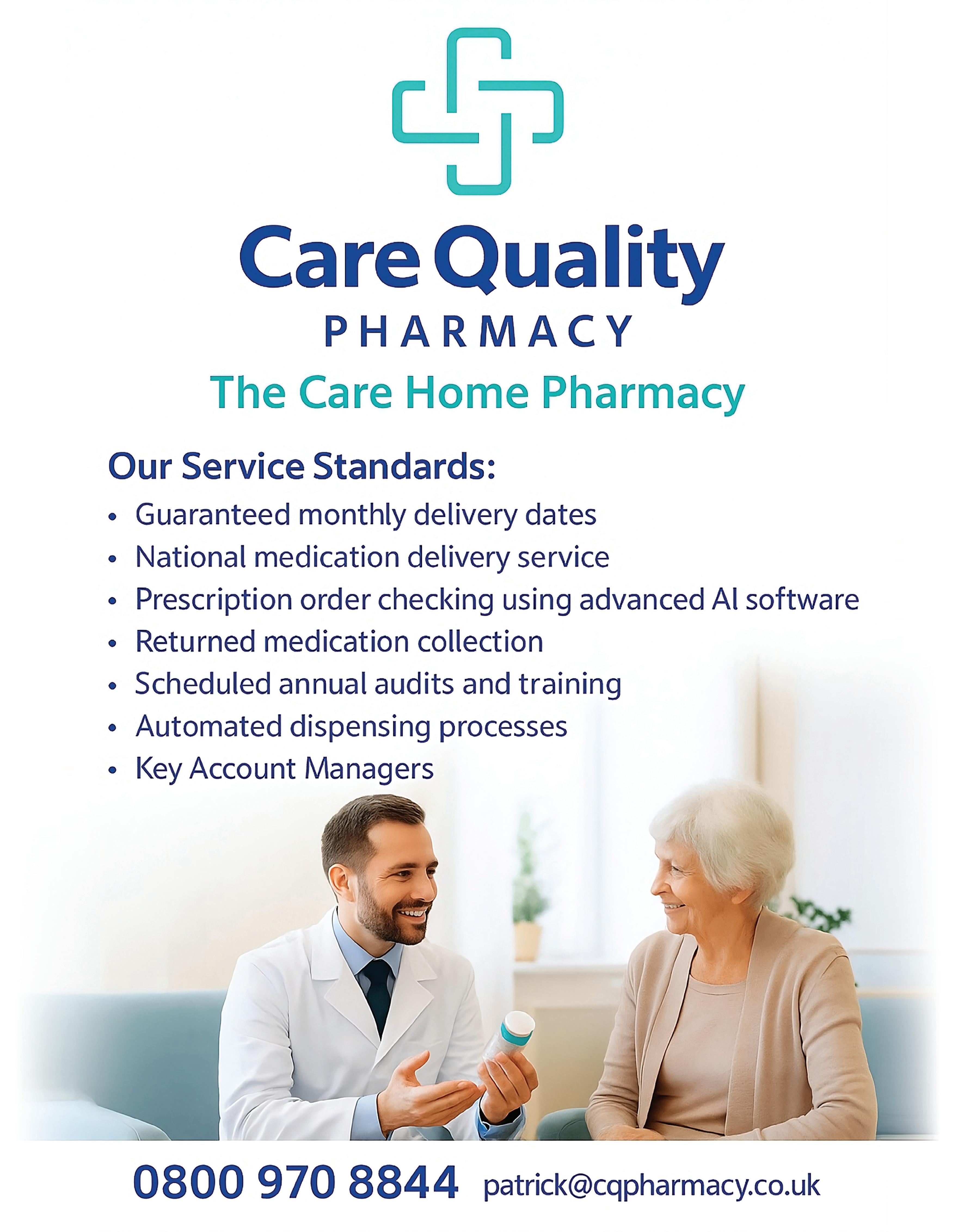

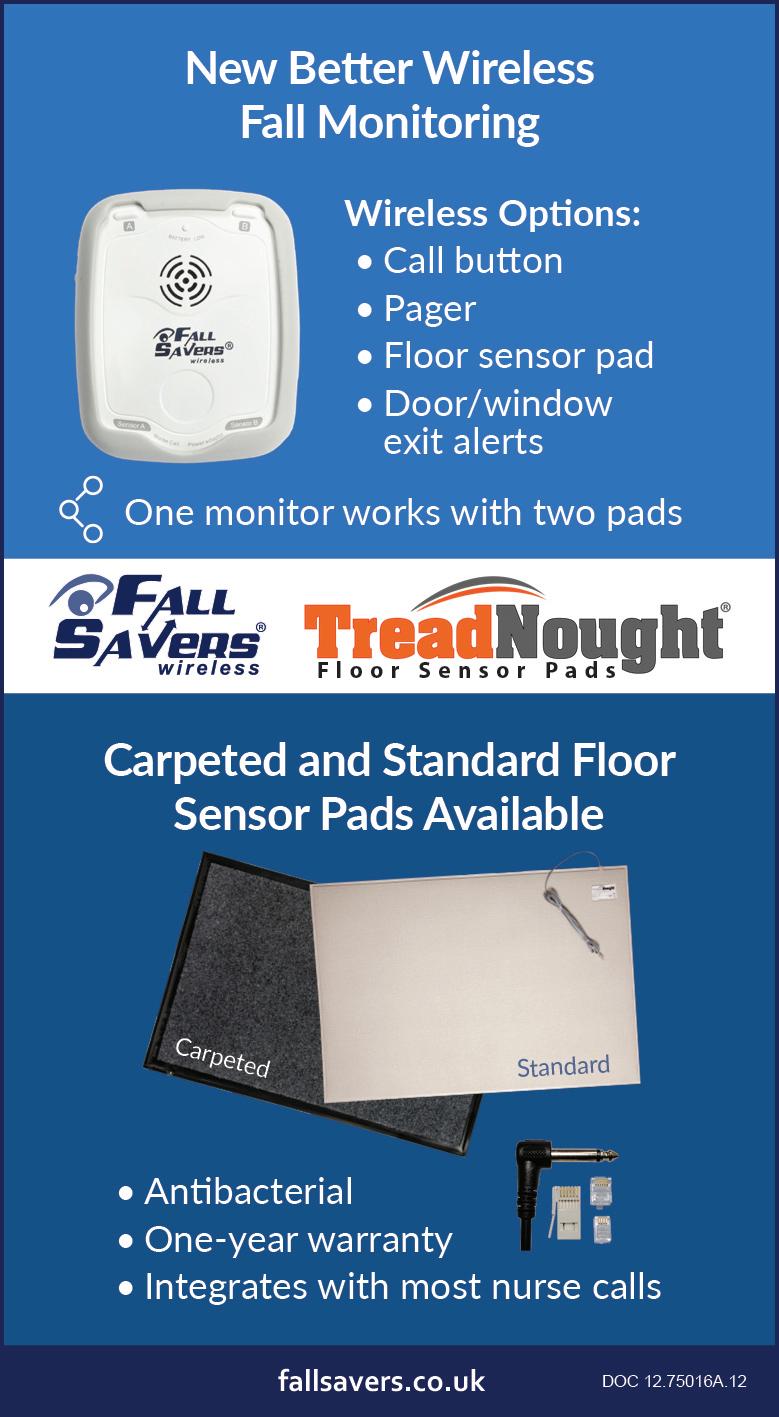













Emergency government bailout agreements for councils are at risk of becoming “normalised” as costs continue to outstrip available resources and push many to the financial brink, the Local Government Association warns ahead of the Autumn Budget.
New analysis by the Local Government Association (LGA) ahead of the November 26 fiscal event reveals that councils across England are at risk of substantial budget overspends in 2025/26 across adult social care, children’s

social care and homelessness services.
Councils are at the heart of every national priority from building homes and boosting inclusive growth to caring for children and supporting older and disabled people the LGA said.
It is therefore critical that government works with councils to reform key services, such as adult social care.
(CONTINUED ON PAGE 3...)
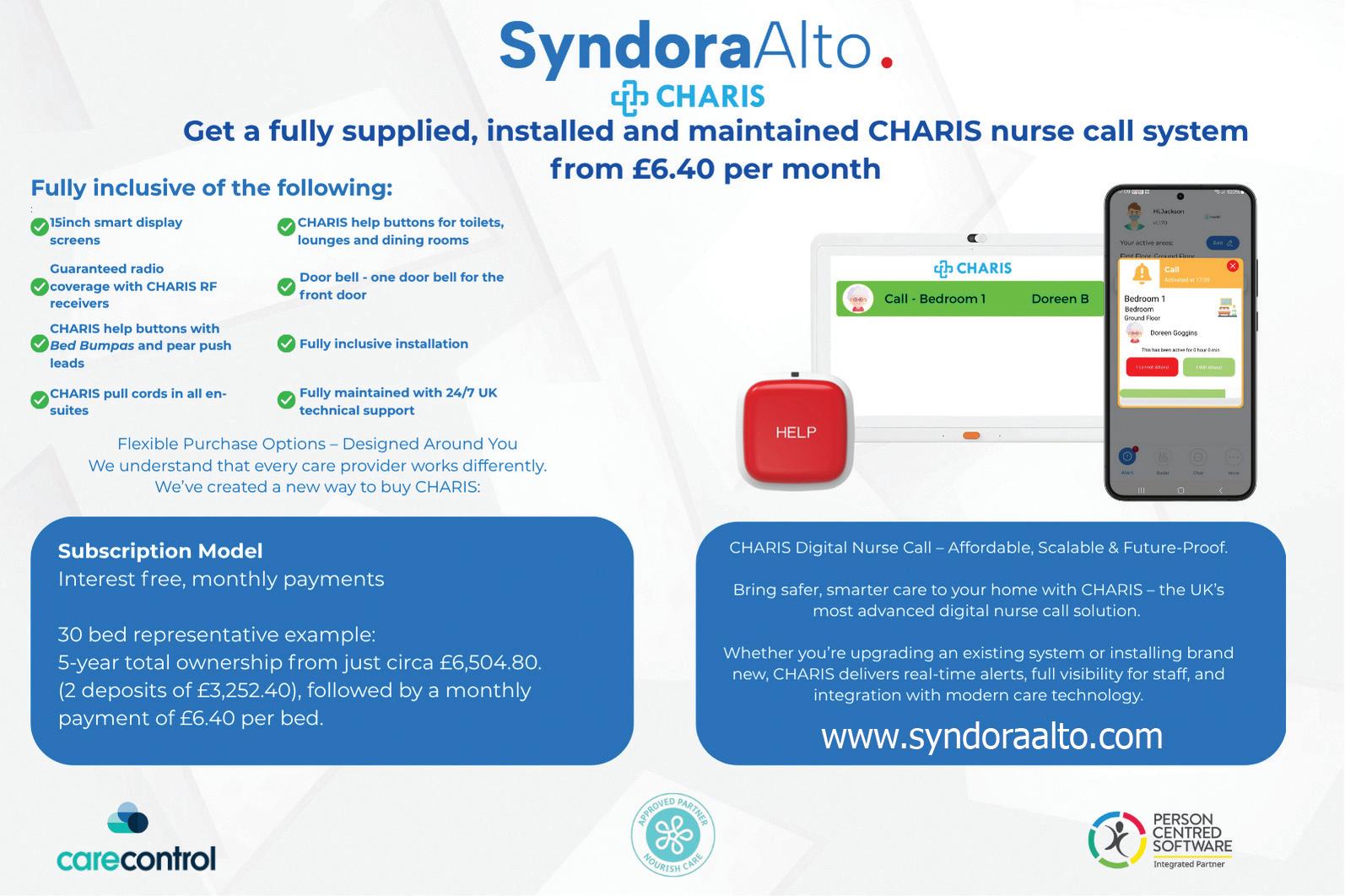
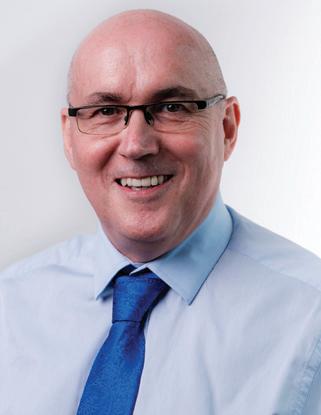
The latest warning from the Local Government Association should raise concerns to everyone involved in social care.
Emergency government bailout agreements for councils are at risk of becoming "normalised" as costs continue to outstrip available resources, pushing many local authorities to the financial brink ahead of the Autumn Budget.
It is no secret that councils are struggling to balance the books. As our lead article reveals, the figures make for sobering reading.
Between 2022/23 and 2024/25, despite increased levels of budgeted spend, councils overspent annually on average by 5.2 per cent on adult social care, 14.2 per cent on children's social care, 25.1 per cent on home-to-school transport for children with SEND, and an alarming 51.9 per cent on homelessness services.
The LGA's proposed solution includes enabling councils to access low-interest loans to manage these unprecedented pressures.
Yet here lies the fundamental concern that should trouble us all: if the system is unsustainable now and can only function through borrowing, it will remain unsustainable tomorrow. We would simply be handing the mounting costs of today's crisis down to the next generation, kicking the proverbial can further down an increasingly precarious road.
In my humble opinion, there is only one genuine solution to this crisis: we must kickstart economic growth.
The LGA's letter to government makes this this vital point, noting that "councils have a proven track record of delivering growth for their local communities. They are vital to the Government's ambition to kickstart economic growth and meet national housing targets. Furthermore, as major local employers, councils are key players in the local markets that underpin local economies and drive their growth."
Is that where the solution truly lies? Can we forge a path that sees local authorities not merely as cost centres requiring endless bailouts, but as engines of economic development that can generate the resources needed to fund the essential

social care services our communities desperately need?
These are questions that demand urgent answers, not just from government, but from all of us involved in the care sector.
On a more uplifting note, I am delighted to be serving as a judge this week at the prestigious Southwest Care Awards.
I must extend a huge thank you to the event organisers, RPM Events, who also stage the Care and Occupational Therapy Show which we exhibited at in July.
Events like the Southwest Care Awards are absolutely vital. They recognise and reward those on the front line of care—the remarkable individuals who, despite the financial pressures bearing down on the sector, continue to provide compassionate, professional care day in and day out.
These are the people who hold our care system together, often in the face of impossible odds.
To be involved in celebrating their achievements is both an honour and a privilege.
In these challenging times, when headlines are dominated by budget deficits and bailouts, it's essential that we pause to acknowledge the human element at the heart of social care: the dedicated professionals whose commitment never wavers, regardless of the financial weather!
They deserve our recognition, our gratitude, and—crucially—a sustainable system that allows them to continue their vital work without the constant shadow of financial crisis looming overhead.
I would encourage our readers to sign up for our bi-weekly digital newsletter at www.thecareruk.com and follow us on social media for all the latest news.
I can always be contacted at editor@thecareruk.com
The Carer is published by RBC Publishing Ltd, 3 Carlton Mount, 2 Cranborne Road, Bournemouth, Dorset BH2 5BR.
damage. Views expressed within this publication are not necessarily those of the publisher or the editorial team. Whilst every
responsibility for any effects, errors or omissions therefrom. All rights reserved, reproduction is forbidden unless written


(CONTINUED FROM FRONT COVER)
In a letter to Chancellor Rachel Reeves the LGA has set out how public service reform – including a focus on prevention, combined with genuine devolution, and the development of strong digital and technology foundations to drive productivity and efficiency – is critical to help councils manage and reduce demand for acute services.
However, it said the country cannot deliver growth, reform public services or improve life chances without fixing local government finances.
PRESSURES WORSENING
Between 2022/23 and 2024/25, despite increased levels of budgeted spend, councils overspent annually on average by 5.2 per cent on adult social care; 14.2 per cent on children’s social care; 25.1 per cent on home-to-school transport for children with SEND; and 51.9 per cent on homelessness.
In 2025/26, planned budgets again show steep rises – 9.0 per cent for adult social care, 10.1 per cent for children’s social care and a staggering 38.8 per cent for homelessness. However, despite the continued growth in budgeted spend, data for councils’ Q1 spending across these three services indicates that 2025/26 budgets are already under pressure and that there is a clear potential for overspends in line with the previous three years in these services.
EMERGENCY MEASURES
Overspending in these demand-led services means councils are increasingly being forced to rely on emergency measures such as in-year cuts to spend for other services and drawing on depleting reserves to balance their books. This is not financially sustainable.
The LGA said that 29 councils (including nearly one in six of all councils with social care duties) needed Exceptional Financial Support (EFS) agreements this year to borrow, sell assets or increase council tax above national limits simply to keep essential services running.
Overall, 42 councils have accessed more than £5 billion through exceptional support since its introduction in 2020/21, with many using it for multiple years.
This is a substantial increase on the number last year and a clear warning sign of systemic failure.
The LGA said current EFS arrangements, which allow capitalisation of revenue costs, should be reviewed to ascertain whether they are achieving the objective of supporting councils in returning to financial sustainability.
LEADING INNOVATION
As part of its Autumn Budget submission to the Treasury, the LGA sets out how councils are already leading innovation that saves money and improves lives.
Wigan is using AI to automate needs assessments and identify where care could be improved, freeing up staff time for direct support. Central Bedfordshire’s investment in digital skills and care tech has saved nearly £800,000 while improving outcomes. From Bath’s riverside regeneration to Folkestone’s new garden town, councils are unlocking thousands of new homes and billions in economic potential.
It is calling for the Chancellor to:
provide councils with a significant boost in resources to prevent widespread financial failure and empower councils to unleash growth and service reform at scale. It is good that government has proposed a range of local government financial reforms, including the guarantee of multi-year settlements and a move away from fragmented, ring-fenced grants and reducing reliance on competitive bidding. Greater financial certainty and a simpler funding system are important. However, all councils need adequate resources to meet growing cost and demand pressures.
ensure the Government’s Fair Funding 2.0 reforms do not put the sustainability of individual council’s finances and services further at risk by ensuring that robust transitional arrangements are put in place to protect councils from both cash-terms and real-terms cuts where necessary.
• address the £5 billion SEND deficit, which continues to hang over local budgets. Writing it off, as part of the wider SEND reform programme, would give councils and schools the chance to focus on improving provision rather than firefighting finances.
The submission also demonstrates how investing in and empowering councils would allow them to deliver to their full potential both to support local communities and also to address national priorities. For example, research shows that devolving and pooling employment and skills budgets locally could boost productivity and get more people into work.
Allowing local authorities to also have access to low-interest loans available for social housing providers would support them to further increase the supply and quality of affordable housing.
“FUNDAMENTALLY
Cllr Louise Gittins, LGA Chair, said: “Council costs and demand for services are soaring – especially in children’s and adult social care, homelessness, and SEND home to school transport – leaving significant potential overspends this year.
“The consequences are visible everywhere. Fewer neighbourhood services, reduced investment in prevention, and growing pressure on those who rely most on local support.
“When a system relies on emergency bailouts to function, it is fundamentally broken.
“The country’s success depends on places like Barnsley, Buckinghamshire, Cambridge, and Cumberland being able to thrive. Councils have the legitimacy, local knowledge and ambition to make that happen. But they need a fair financial foundation to stand on.
“If the Government is serious about growth, public service reform and opportunity for all, it must start with councils – because when councils succeed, the country succeeds.”
The LGA welcomed the Government's plans to reform local government finance, including a guarantee of multi-year settlements, a move away from ring-fenced grants and reducing reliance on competitive bidding.
It also said the Chancellor should ensure the implementation of fair funding reforms, which are expected to adjust formulas used to allocate government grants and prioritise deprived areas, and that they must include "robust transitional arrangements" to protect the sustainability of all councils.
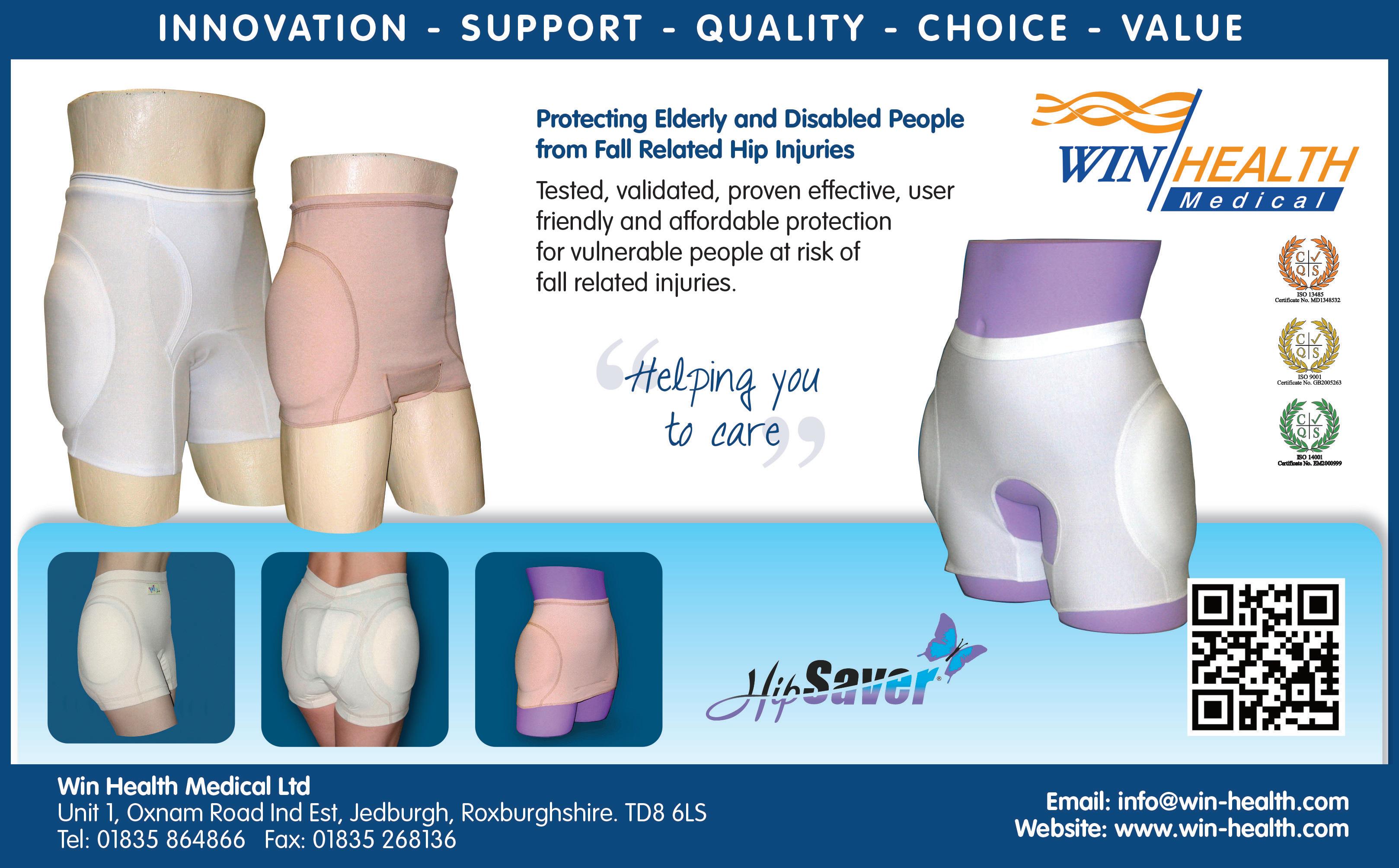

The care sector is facing a surge in employment disputes, with our recent research revealing significantly higher levels of disciplinary action and of grievances compared to other sectors.
The Birketts View: Employment Tribunals in the Care Sector Impact Report 2025, based on a survey of HR professionals across England and Wales, found that care sector employers handled an average of 53 disciplinary matters over two years – significantly higher than the 37-case average in other industries. Grievance rates were 29% higher in care organisations, with many employers citing grievance management as the area where line managers more urgently need support.
With the Employment Rights Bill on the horizon, employers should anticipate and prepare for a further increase in disputes and tribunal claims. As the sector braces for legislative reform, effective dispute management will be essential. Proactive employers will take steps to minimise the number of grievances that are formalised and to improve staff retention by providing support mechanisms and career development opportunities.
A SECTOR UNDER STRAIN
Staff turnover in the care sector remains high as roles tend to be emotionally and physically demanding, working conditions can be challenging and employees are often required to work long hours. Consequently, the frequency of employment disputes is greater.
The Employment Rights Bill is expected to introduce several reforms that will impact on an employer’s handling of disputes. These include the introduction of day-one rights to claim unfair dismissal and receive Statutory Sick Pay, along with proactive harassment prevention duties, including protection from third-party harassment. The latter could include service users and visiting therapists (such as hairdressers) and family members.
COMMON
Our research has indicated that, in care settings, the most frequent employment disputes that arise are:
• unfair dismissal, often linked to performance or conduct issues discrimination, particularly related to disability, age, or gender
• holiday pay and working time issues, which can be particularly complex due to employees’ irregular shift patterns and zero-hours contracts grievances relating to employees’ workloads, managers’ management style, and interpersonal conflicts
By Rebecca Hughes, Associate in the Employment Team at Birketts LLP (www.birketts.co.uk)
between employees.
Pressures within the employment tribunal service to deal with cases in a timely manner are compounded because it can be difficult for employers in the care sector to secure reliable witnesses, especially when staff have left an organisation. The financial and reputational costs of litigation are also considerable.
Employers need to be able to defend their decisions by relying on detailed and well-written documentation and fair and consistently applied procedures. Early intervention is key to resolving disputes before they escalate. It is crucial that employers have robust procedures in place, invest in staff training, and implement early intervention strategies. These include informal resolution methods, such as mediation or facilitated conversations, and detailed record-keeping of all employment actions and decisions.
Effective dispute resolution starts with proactive performance management. This means that line managers should be trained to: provide regular, constructive feedback document their concerns and interventions follow fair and transparent disciplinary procedures.
In the care sector, regulatory considerations add another layer of complexity. Employers must ensure compliance with any reporting obligations that arise from disciplinary matters, including notifying relevant regulators where misconduct is identified.
Procedural rules should be clearly communicated, and complaints must always be taken seriously and, where necessary, investigated promptly. It is possible that, due to time pressures, staff shortages, or lack of experience, some managers may view grievances and disciplinary matters as inconvenient and rush investigations and disciplinary hearings, increasing the risk of procedural errors occurring. As a result, it is essential that all managers receive high-quality training to handle these matters appropriately and lawfully.
Many disputes stem from poor communication, lack of support, or burnout. To reduce grievances and improve employee retention, care providers can: offer mental health resources and access to counselling for all their staff provide career development opportunities and recognition programmes ensure that work is distributed and shifts are rostered fairly.
By creating a positive workplace culture where staff feel valued, heard, and supported, employers can significantly reduce the risk of disputes arising and foster loyalty.
Care providers are bound by a range of legal obligations. These included those set out within legislation, such as The Health and Safety at Work Act 1974, which requires employers to ensure safe working conditions, both physically and psychologically. In addition, they must abide by their common law duties (to include the duty of care), and contractual obligations.
As the legal landscape evolves over the coming months, those employers in the care sector who have invested in training and support, and who have put in place fair procedures that are consistently applied, will be able to navigate the inevitable challenges that all employers will face. This will be critical if they are to focus on the provision of care for their service users.
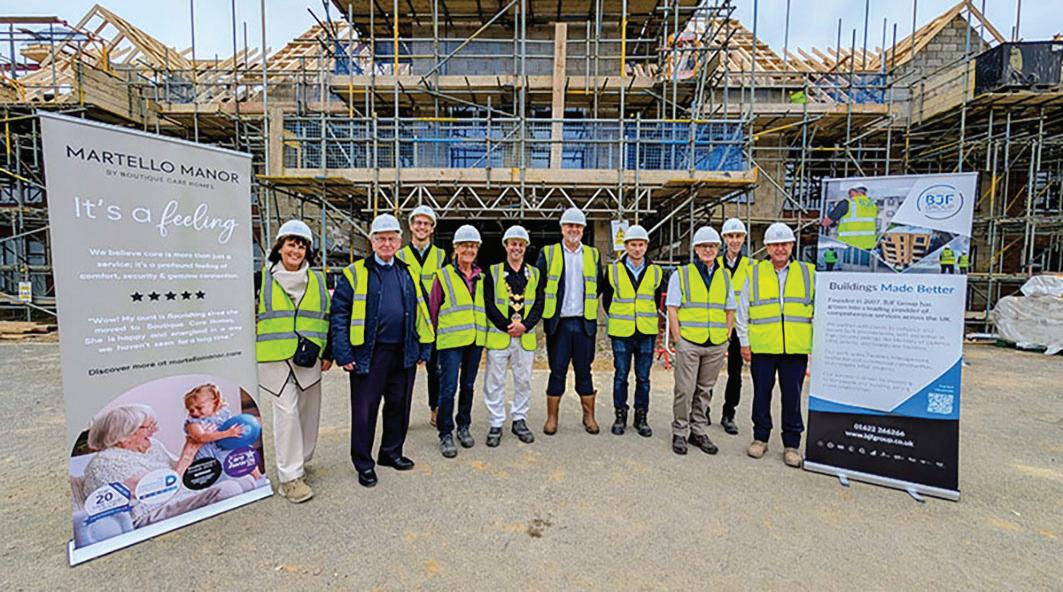
Boutique Care Homes celebrated a key construction milestone on October 7th with the topping out of Martello Manor, its new purposebuilt care home in Hythe. The ceremony marked the completion of the roof structure and brought together civic leaders, community partners, and project stakeholders to reflect on the journey so far and the future ahead.
The Right Worshipful Town Mayor of Hythe, Councillor Stephen Bailey, was among the honoured guests and laid the first of three ceremonial tiles on the roof. During the event, he expressed his support for the project and took time to engage with the Boutique Care Homes team, discussing the home’s vision and its plans to support the wider Hythe community once operational. He was joined by Dudley Shipton, Chairman Emeritus of the Hythe Dementia Forum, and Tracy West, current Chair, both of whom also laid tiles during the ceremony, symbolising the home’s deep connection to the local community it will soon serve.
Dudley shared his appreciation for the opportunity to be involved; “It was a great privilege to take part in placing a tile on the roof at Martello Manor’s Topping Out Ceremony. The Hythe Dementia Awareness Forum are pleased to be involved in the development of Martello Manor and are inspired by the decision of Boutique Care Homes to be committed to being involved with the local living community.”

Tracy echoed this sentiment, highlighting the unique level of care and attention evident throughout the project; “What struck me was that everyone involved, from Project Development, Construction, Fixtures & Fittings to Sales & Marketing and Care Home Management, all have a very personal interest in ensuring that Martello Manor is more than just another residential care home. I was very impressed with what I saw today and am grateful to Boutique Care Homes for creating Martello Manor in Hythe.”
Martyn Murphy, Operations Director at Boutique Care Homes, reflected on the significance of the day; “This milestone marks more than the progress of a building, it represents the beginning of meaningful connections. Martello Manor is being created as a place of comfort, dignity, and true community, and we’re incredibly grateful to those who joined us to celebrate its future.”
Tom Duck, Development Director, added; “From the earliest stages, Martello Manor has been shaped by collaboration. Today’s ceremony shows just how deeply rooted this home already is in the Hythe community. We’re excited to see it grow into a place where people live well, feel valued, and belong.”
ulnerable people lacking the mental capacity to make decisions about their care are expected to benefit from major changes to safeguarding and protections, following a consultation announced by the government.
The proposed Liberty Protection Safeguards aim to deliver improved protection and an easier and improved system to allow carers, psychologists, social workers and families to provide care to vulnerable people in circumstances that amount to a deprivation of liberty.
The current Deprivation of Liberty Safeguards system is bureaucratic and complex, leading to poor understanding and application of the law by professionals, unacceptable distress for families and a backlog of 123,790 individuals, putting pressure on the social care system.
The implementation of these new safeguards is expected to streamline processes and reduce the backlog of applications – focusing on those most vulnerable.
A consultation on the Liberty Protection Safeguards will be launched in the first half of next year, seeking the views of those affected such as families, carers and practitioners including social workers, nurses, psychologists and occupational therapists. It will be jointly run by the Department of Health and Social Care and the Ministry of Justice.

This delivers on calls from organisations including the Care Quality Commission, Mencap and Mind for the implementation of new Liberty Protection Safeguards to replace the outdated Deprivation of Liberty Safeguards.
FOR EXAMPLE, UNDER THE CURRENT SYSTEM:
• A lady in the advanced stages of dementia, who for over three years has had no concept of place, person or time and cannot walk, talk or chew, is required to have an assessment every year.
• The assessment involves a GP, social worker, care home staff, admin staff and her advocate, and results in a long, report to determine whether she should be deprived of her liberty and if the care home is the best place for her.
• Part of this assessment includes a GP visit who asks her a string of questions, despite this vulnerable individual having no indication of understanding or even awareness of anyone being there and cannot give any response.
• This repetitive process is distressing for her family to witness every year and to be told they are depriving their loved one of liberty. Many other people have conditions like this which are unchanging.
Liberty Protection Safeguards will allow for existing assessments to be reused, or for assessments to last
for longer than one year. This will reduce the need for intrusive processes, which can be harmful or distressing for individuals and their families, and will allow for better focus on people who most need support and protection.
Minister of State for Care Stephen Kinnock said: Safeguarding the vulnerable and protecting their rights is our absolute priority of this government – this is about fixing a broken system by hearing directly from those with lived experience and their families.
There is currently a shameful backlog in the system of unprocessed cases under the current system which means that people’s rights are not being protected. At the same time, we know that many people in the system and their families find these intrusive assessments distressing.
This is about ensuring we are fully focused on the most vulnerable people in our society and their families – understanding their needs, ending the maze of referrals and paperwork, and delivering the best protections and safeguards possible.
A 2014 Supreme Court ruling, known as Cheshire West, established an ‘acid test’ which broadened the definition of what it means to be ‘deprived of liberty’ and led to an increase of 300,000 referrals between 2013-14 and 2023-24 – in addition to a backlog of 125,000 cases.
Each case represents an extremely vulnerable person who needs comprehensive care and support and does not have the mental capacity to make decisions about their care alone.
In August, Northern Ireland put forward a challenge to the Supreme Court about the Cheshire West ‘acid test’ and what is considered a ‘deprivation of liberty’. This is a challenge to the current Deprivation of Liberty Safeguards, with any ruling having a UK wide impact.
The UK government has been granted permission by the Supreme Court to intervene in this case – as it recognises the issue within the current system and sought to be part of this vital conversation and put forward a UK wide solution.
The responses from this consultation will be used to inform a final Mental Capacity Act (2005) Code of Practice which will be laid in Parliament.
The revised Code of Practice will incorporate changes in case law, legislation, organisational structures, terminology, and good practice since 2007 addressing critical challenges in the existing Deprivations of Liberty Safeguards framework.
The last time the Mental Capacity Act Code of Practice and Liberty Protection Safeguards were consulted on was in 2022 which did not lead to any changes.


Caring for someone with memory loss or cognitive impairment can be challenging, particularly when it comes to keeping them engaged and connected. While traditional activities such as bingo or jigsaw puzzles certainly have a place, growing evidence supports the value of sensory stimulation as a powerful tool in dementia care.
Activities that engage the senses are usually associated with children’s development, but sensory stimulation is just as vital for older adults. It can help maintain a sense of identity, stimulate cognitive function and reduce stress.
As we age, our senses naturally decline. Research indicates that around 40% of people aged 70 to 79 experience dysfunction in at least one sense, with more than a quarter affected in multiple areas. This decline can be even more pronounced in clinical or institutional settings, where routines and a lack of stimulation can further dull sensory perception.
Recognising this, our team incorporates a range of sensory activities suited to each resident’s needs.
Through a range of new experiences that engage the senses, such as learning a foreign language, cooking or interacting with new technology, residents can be supported in staying mentally and emotionally active.
People with dementia may experience challenges in making sense of their surroundings, staying connected, and feeling at ease in daily life. Memory loss and cognitive decline disrupt not only a person’s ability to remember names or events, but also how they process and respond to the world around them. This is why sensory stimulation is a crucial aspect of care. It offers a direct, meaningful way for residents to reconnect with their surroundings in the moment, even when memory fades. By engaging with simple activities that awaken the senses, such as feeling different textures, smelling familiar scents, listening to music, or tasting a favourite meal, residents often experience comfort, recognition and joy.
Sensory intervention also helps counteract the gradual decline in sensory perception that naturally comes with age. Without conscious efforts to stimulate sight, hearing, touch, taste and smell, this decline can accelerate in institutional environments. A sensory-led approach transforms these environments into places of discovery and engagement, helping residents remain alert, responsive and emotionally balanced.
By David Dominy, CEO, Royal Alfred Seafarers’ Society (
Physical activity forms a core part of this approach. Research from the British Heart Foundation shows the multiple benefits of regular exercise for older adults, including improvements in mobility and a boost to mental wellbeing. Residents at Belvedere house benefit greatly from tailored group and individual activities, including walking and gentle stretching especially when these take place in calming natural environments like our home’s 14-acre gardens. Movement and time in nature have been shown to boost mood and support physical health. In addition to physical exercise, traditional sensory activities such as jigsaws, puzzles, arts and crafts, knitting, gardening, or music sessions encourage focus, creativity, and social interaction. These hands-on pursuits engage touch, sight, and fine motor coordination, helping to maintain cognitive function and dexterity. They also provide a sense of achievement and enjoyment, supporting relaxation and a sense of connection between residents.
While traditional sensory activities remain invaluable, modern technology is opening new and exciting opportunities to support people living with dementia. Tools such as virtual reality are being explored for reminiscence therapy, while interactive games and digital art programmes bring fun and creativity into the care setting.
Thanks to a Veterans’ Foundation grant in late 2024, we were able to introduce a specially designed sensory room at Belvedere House to support residents’ cognitive engagement and mood. Alongside our sensory room, we have also introduced interactive screens offering quizzes, games and artistic activities and video communication tools to help residents stay close to their families.
These digital opportunities go far beyond entertainment. Staff have noticed that digital activities encourage hesitant residents to engage at their own pace, often leading to shared social experiences that strengthen bonds within the home and beyond.
Importantly, not every sensory activity is suitable for every individual. What comforts one resident may overwhelm another, making personalisation essential. Our care team works closely with residents and their families to understand their life histories, preferences and abilities, designing programmes that feel meaningful and familiar.
Sensory stimulation plays a vital role in person-centred dementia care. When activities are thoughtfully designed to engage both mind and body, they can help individuals remain connected to their environment and support a stronger sense of wellbeing.
At The Royal Alfred Seafarers’ Society, we place emphasis on quality of life and enrichment as part of our approach to care, encouraging residents to remain engaged and connected in their later years.
Five colleagues from Hailsham House in Hailsham, East Sussex, part of Aurem Care, have completed a nine-mile walking challenge to raise more than £400 for a special memorial in honour of past residents.
The walk was organised by Jade Thomas from the home’s Wellbeing Group, who was joined by fellow team members Julia, Jayne, Suse, and Amy. The group set off from Hellingly Primary School, following a scenic route through fields and woodlands towards Chiddingly.
At the halfway point, the walkers stopped at The Six Bells pub, where they met their colleague Vanda, who had hoped to take part but was unable to due to health reasons. To show her support, Vanda treated the team to welldeserved refreshments of cheesy garlic bread and cheesy chips before they continued on their way.
The return leg of the route proved more challenging, with steep inclines testing their stamina. However, spirits remained high as the group laughed,
sang, and shared stories about how much their residents would have enjoyed the adventure even when navigating cattle fields and dodging daddy long legs!
After nearly six hours, including their lunch stop, the team crossed the finish line, having walked 8.67 miles in total, with four and a half hours of walking time. Their determination paid off, raising an impressive £425. Residents at Hailsham House have since decided that the funds will go towards creating a memorial archway or pergola in the home’s garden. The structure will be a peaceful place for families and residents to gather, light candles, and hang the names of loved ones who have passed away.
“We’re incredibly proud of our team for taking on this meaningful challenge,” said Rui Santos, General Manager at Hailsham House. “Their dedication reflects the compassionate spirit of our home, and this memorial will be a beautiful way to celebrate the lives of those we’ve cared for over the years.”

Residents at an Ilkley home can visit places such as Scotland and the North York Moors without leaving their home thanks to a new train experience.
MHA Glen Rosa have installed the Jolly Journey Train Experience, a new initiative by Little Islands, who specialise in creating unique interactive environments.
The train experience showcases journeys across the UK from the viewpoint of a passenger looking out of the window.
The team from Little Islands installed and decorated a part of the home’s dementia unit and converted it into a train carriage with props such as suitcases, train times and journey information displays.
MHA Glen Rosa provides residential and residential dementia care for 47 residents.
Adam Carling, home manager said: “The Jolly Journey Train experience is a new initiative and one that is proving to be very popular here.
“We have received some great feedback since the experience has been installed.
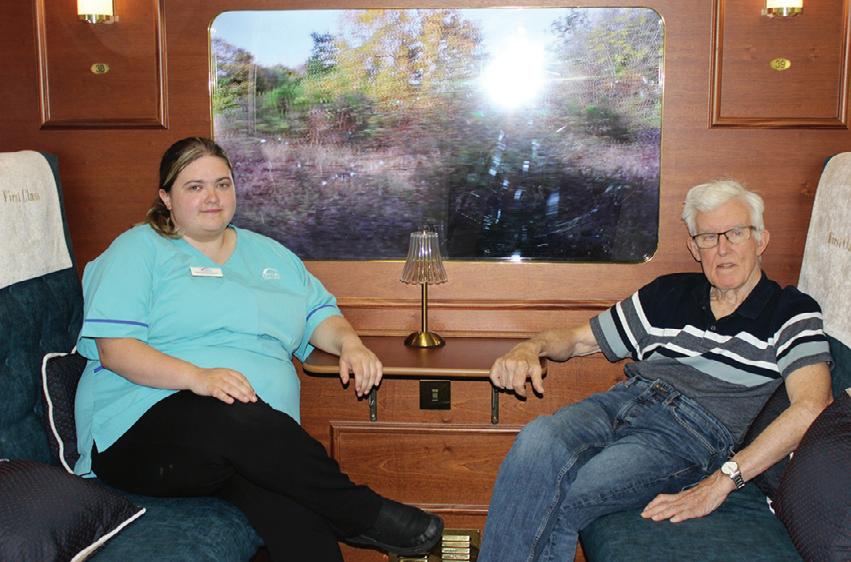
“Our residents love it, you will often see a number of them sat in the carriage and watching a journey.
“The idea came to me from my area who forwarded it to me, and I decided to look into it.
“I then contacted the team at Little Islands and the whole process took a couple of months from start to finish.
“We are quite privileged here at MHA Glen Rosa, where thanks to the generosity of the local community we are able to provide services such as this for our residents.
“We received a very generous donation via our Legacy Fund which enabled us to go for this experience.
“The location of the experience is really good as it’s in a high footfall area, where both residents and their relatives can sit and enjoy it.
“Alongside the Train Experience, we have also prepared a sensory garden thanks to funds we received.
“I do think this is something other MHA homes can look into having, it’s something quite unique and I do feel other homes will see the benefits just like we have.”
The NIHR has announced a £157 million investment over 5 years in 10 NIHR Applied Research Collaborations (ARCs).
From April 2026, the new ARCs will support the transformation set out in the NHS 10 Year Plan, the Life Sciences Sector Plan and the Government’s Health and Growth Missions by tackling some of the UK’s most pressing health and social care challenges through high-quality applied research. They will also drive effective interventions and models of care into practice at pace.
The NIHR ARCs are collaborative partnerships between universities, NHS trusts, local authorities, Health Innovation Networks, Integrated Care Boards and the voluntary sector.
THROUGH THESE PARTNERSHIPS, THE ARCS WILL:
• identify, develop and deliver high-quality research on applied health, public health and social care that tackles the UK’s healthcare challenges, particularly in under-represented areas;

• provide greater resource and expertise to support implementation of effective interventions and models of care into practice across the country, working closely with system partners;
• provide enhanced health economic expertise to ensure the economic impact of evidence is better understood to support decisions on efficiency and growth;
• collaborate with commercial companies to evaluate and implement new NHS treatments and technologies, fostering UK economic growth;
• speed up the implementation of research findings through the use of knowledge mobilisation; and address
health inequalities by embedding inclusive approaches across all projects.
ARCs will deliver research which is applicable and scalable across the health and social care sectors across England.
Health Innovation Minister, Zubir Ahmed, said: “This funding will accelerate the breakthroughs that will underpin the success of our NHS 10 Year Health Plan, ensuring research is going from laboratory to living room and supporting the shift from patient to prevention.
“As we work towards our mission of building an NHS fit for the future, this investment will drive the innovations that matter most to people’s daily lives.
“Every pound invested in this research is an investment in hope –hope for faster diagnoses, more effective treatments, and a health system that truly works for everyone, no matter where they live or what their background.”
Professor Lucy Chappell, Chief Scientific Adviser to the Department of Health and Social Care and CEO of the NIHR, said: “This new funding shows the NIHR’s ongoing commitment to developing and delivering highquality health and care research across the country. The investment will enable the ARCs to continue to bring new treatments and technologies to patients and the public, supporting the aims of the Government’s 10 Year Health Plan to champion innovation and power transformation.”
Frank, affectionately known as ‘Ferrari Frank’ by his family and staff at Chaucer House, recently got to spend a day at Lydden Hill Race Circuit. For a man who has watched motor racing on TV every weekend, cheered at live races, and even driven race cars organised by his daughters, the excitement for Frank was unforgettable.
Frank is a man of many talents. He has worked as a mechanic, built intricate birdhouses, and even driven for Parliament. Anything mechanical or car-related has always captured his imagination, and his passion for speed and engineering shines through every story he shares.
The visit was carefully planned by Chaucer House staff, who know that meaningful activities tailored to a resident’s interests can make all the differ-
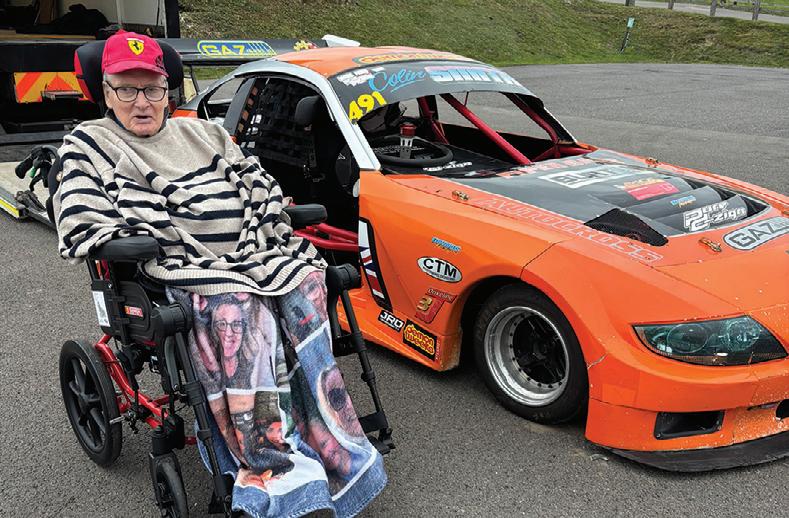
On the day, Frank was mesmerised by the roar of engines and the thrill of cars hurtling around the track. He recounted favourite races from his past, shared stories and laughed along with staff as he soaked in every moment.
Stacey Taylor, Activities Coordinator, said: “Seeing Frank so animated and happy reminded us why these trips are so important. They celebrate the individual passions of the residents, keeping them engaged, connected, and inspired. Frank’s joy was infectious, and we all had a brilliant day”.
This trip to Lydden Hill is just one of many ways Chaucer House brings personalised care to life, recognising each resident’s unique interests and ensuring they remain active, included, and part of the wider community.


Expert commentary from sensory garden expert Neil Gandecha at Foxholes Care Home (https://foxholescarehome.com)
ration.”

PLAN YOUR SPACE
More than half a million people in the UK have received a dementia diagnosis, according to recent NHS data.
Recent search engine analysis by Foxholes Care Home, shows an average of 14,000 searches for “sensory garden” and 106 related keywords across the United Kingdom, highlighting growing interest in sensory-friendly gardens.
With numbers set to rise to 1.4 million by 2040, innovative approaches to dementia care have never been more urgent.
Nearly one million people are now living with the condition, making dementia the country’s leading cause of death and affecting around 70% of care home residents.
“Designing a sensory garden should always put the person at the heart of the space,” explains Neil Gandecha, sensory garden expert at Foxholes Care Home “Sensory gardens provide a moment of calm and relaxation for people of all ages.
They have the unique ability to stimulate memories, engage the senses, and transport individuals back to meaningful moments in their lives.”
When planning a dementia-friendly sensory garden, Neil highlights several key considerations:
“Choose a location that offers a mix of sun and shade and is easy to access from indoors,” Neil advises. “Wide, level, non-slip paths and raised beds make plants more accessible for wheelchair users. People with dementia can become disoriented in a complex layout. A simple looped path allows safe, worry-free explo-
“Every sense should be considered when designing a sensory garden,” Neil explains:
• Sight: Use bright, contrasting colours and plants with seasonal interest to provide visual stimulation. Sculptures, ornaments, and bird feeders can act as focal points to guide exploration.
• Smell: Fragrant herbs like lavender, rosemary, mint, and thyme, alongside flowers such as roses, honeysuckle, lilac, and jasmine, evoke calming memories and are especially helpful for those with hearing loss.
• Touch: Soft, textured plants such as lamb’s ear and ornamental grasses, tree bark, and safe tactile panels provide opportunities for hands-on interaction.
• Sound: Include rustling plants, gentle water features, and wind chimes to create soothing background sounds and encourage wildlife visits.
• Taste: Safe edible plants or seasonal treats, like autumn herbs or setting up a hot chocolate station in garden seating areas, provide sensory engagement through taste.
CONSIDER WHO THE GARDEN IS FOR
“Every sensory garden should be designed with its users in mind,” Neil explains, “For people with visual impairments, bold, contrasting colours help with navigation. For those with hearing loss, vibrant colours, scents, and textures reduce stress and encourage meaningful engagement with the space.
It’s important that people living with dementia receive the care and support they deserve. Creating inclusive, dementia-friendly spaces like sensory gardens is just one of many ways to help people maintain dignity, well-being, and quality of life. Ensuring access to such resources can make a meaningful difference for both individuals and their families."
Neil concludes, “Ultimately, a well-planned sensory garden is more than a garden, it’s a place of comfort, stimulation, and joy for everyone who uses it.”
At The Lawn, the Alton-based residential care home run by charity, Friends of the Elderly – which is celebrating its 120th Anniversary this year – to mark this year’s World Teacher Day resident, Jean Piper, has been reminiscing about her long and rewarding career as a Teacher and her love of the Piano.
Jean, who has been a resident at The Lawn since January this year, spent 20 glorious years working at St. Nicolas’ School in Fleet, Hampshire, teaching General Studies and the Piano. “I adored my job as a Teacher,” said Jean. “I taught pupils who were aged seven, so were in Year Three who were all wonderful.”
St. Nicolas’ School was founded in 1935 by two Teachers, Helen Pritchard and Angela McKenzie and, for 60 years, was located on Branksomewood Road in Fleet before moving to its current site at Redfields House in 1996.
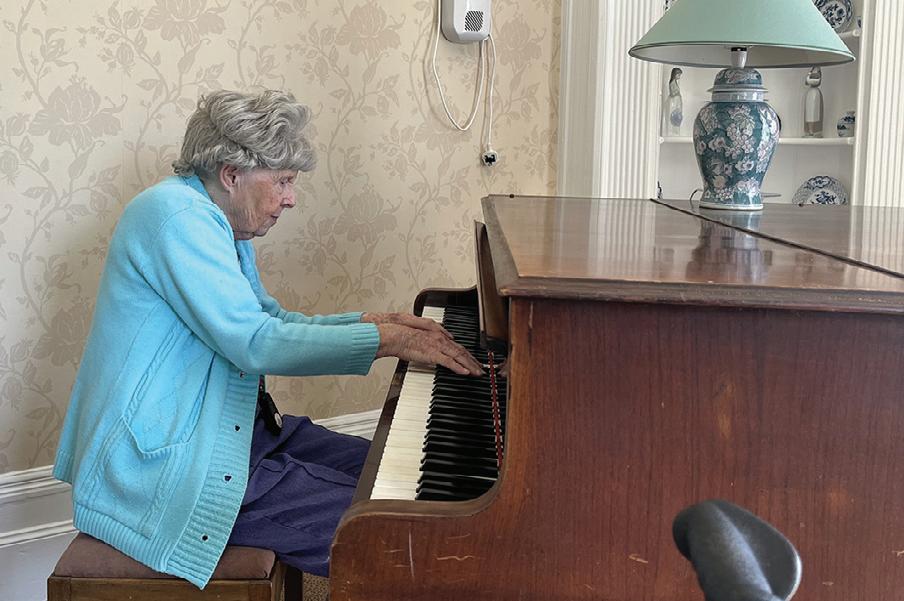
“The school has a great history, and up until 1964 was a Boarding School,” continued Jean. “When World War II began in 1939, as it was so near to the Army Barracks in Aldershot, the school provided a safe and caring place while parents were moved between barracks across the country.”
Teaching General Studies, Jean’s focus was broaden the pupils’ knowledge base by covering subjects such as The Arts and Society. “General Studies was first introduced into the UK’s curriculum back in 1959,” added Jean. “It was put in place to give pupils a foundation in subjects including Humanities and Social Science to supplement their other studies.”
Whilst Jean enjoyed teaching General Studies, her passion was for her Music Lessons and teaching the Piano. “To be honest, if I could turn back time, I would have made sure I taught more Music and Piano,”
continued Jean. “Each class was so gratifying and fulfilling. Being able to depart my musical knowledge and piano skills was so worthwhile.”
Jean has many happy and fond memories of her pupils. “I had one pupil who insisted that he always crawled on the floor during my music lessons. He’d join in with his classmates but remained on the floor. He was attentive and inquisitive – and very musically inclined, so to keep him engaged I let he stay on the floor. Years later, he was diagnosed with Autism and I’m sure he still enjoys music.”
Another of Jean’s pupils was a keen Clarinet player. “He played the Clarinet beautifully and progressed very well and, I believe, after leaving school continued playing and got very far,” added Jean.
Jean had a special knack for ensuring her students paid attention in class. “To make sure I had the pupils undivided attention, I would whisper so they had to listen carefully to what I was saying. I’d then sing, which certainly kept them on their toes.”
The pupils all thought Jean was a fun Teacher. “I’d much rather be the funniest person in the room compared to the cleverest,” continued Jean. “My pupils were exceptionally well-behaved – they always did their homework, were polite and never played pranks on me.”
“Jean really is a font of knowledge,” said Steve Swift, the Registered Manager at The Lawn. “She’s a wonderful lady and still plays the piano for her care home friends, she really is very talented and it’s a pleasure to hear her play.”
“I worked hard to make sure that the pupils’ years at the school were happy, engaging, interesting, productive and, of course, enjoyable. It was important to me that when the pupils progress, they were confident young people,” concluded Jean.
Residents at HC-One’s Woodland View Care Home in Droitwich, have been embracing the colours of the season with a creative painting class that filled the home with joy, laughter, and plenty of autumn spirit.
The activity, held in the home’s bright communal lounge, invited residents to explore their artistic talents while celebrating the beauty of autumn. Using warm and vibrant tones of red, orange, gold, and brown, residents painted striking seasonal trees and began working on charming pumpkin-themed masterpieces, ready to brighten the home in the weeks ahead.
The class was a big hit with residents, who enjoyed reminiscing about autumn traditions, sharing stories of past celebrations, and taking inspiration from the falling leaves outside. For many, the session was not just about painting, but also about connecting with one another, sparking conversations, and building a sense of community.
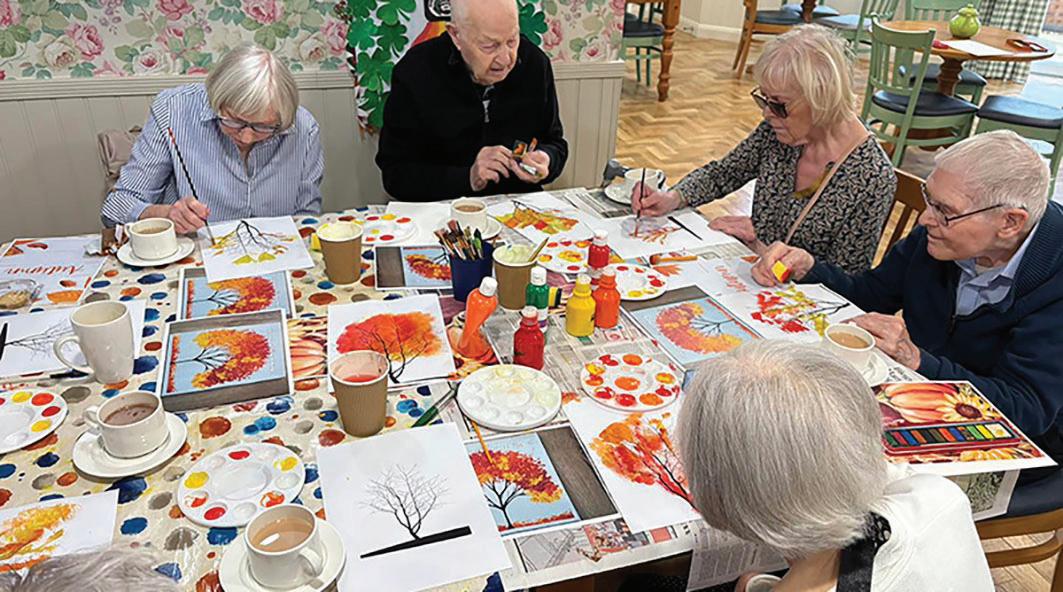
The Woodland View team were delighted by the enthusiasm and creativity shown by residents. The finished artworks, now proudly displayed around the home, have been described as “stunning” and a wonderful reflection of the residents’ individuality.
Woodland View Care Home, part of HC-One, is dedicated to offering a wide range of meaningful activities
that support wellbeing, creativity, and companionship. Seasonal events like this not only provide stimulation and fun but also celebrate the traditions and moments that bring people together.
Woodland View and other HC-One homes are preparing to mark key moments such as Harvest Festival this autumn, offering more opportunities for residents, families, and the wider community to come together.
Woodland View is just one of over 280 kind and cosy HC-One care homes across the UK, each dedicated to creating warm, welcoming environments where residents can feel truly at home.
This autumn, new residents can experience 4 weeks for the price of 3 when joining Woodland View before 30th November 2025. Embrace the warmth of a kind community this autumn. Visit Woodland View – Care Home in Droitwich, Worcestershire| HC One today and discover what life at Woodland View has to offer.
Sarah Whittington, Home Manager at HC-One’s Woodland View Care Home, said: “It’s so rewarding to see our residents engaging with activities like this. Art gives everyone the chance to express themselves in their own way, and the smiles and laughter we saw today show just how much enjoyment the class brought. We look forward to more seasonal activities as we head further into autumn.”
A groundbreaking new documentary aiming to change perceptions and drive change for the UK care sector is set to be screened to MPs and government officials this November.
CARE, a film focusing on the day-to-day lives of care home residents and workers, is set to be screened at Westminster on Monday 17th November 2025 following a successful nationwide tour.
Filmed entirely by staff at a North East care home as it emerged from the COVID-19 pandemic, CARE gives a glimpse into the dedication and compassion of the workers that look after some of the most vulnerable people in society, while raising crucial questions about whether there is adequate support for those who bring such commitment and heart to the sector.
The film’s Westminster screening, which follows the beginning of the government’s long-anticipated Covid enquiry, aims to shine a light on not only the commitment of care staff, but the realities of working in a sector that is overlooked and underfunded.

Hosted by Danny Beales, the Labour MP for Uxbridge and South Ruislip and member of the Health and Social Care Committee, the event will be attended by key MPs, policymakers and senior leaders from the care industry, and will feature the real experiences and voices of care workers who have been at the frontline during Covid and beyond.
The screening aims to spark meaningful conversations around the importance of respecting and supporting the care sector, and act as a catalyst for real policy change benefitting care workers across the country.
During the recent successful nationwide tour of CARE, panellists and audience members spoke candidly of their experiences, as well as how the film shines a light on the reality of care work.
Olivia Firth, policy and project manager at the Care Workers Charity, said of the film: “It presented a lot of the joys of [care work]. One of the things that we used to say when I was in care work is that there was
always beauty in the mundane. Even if you were doing nothing, you could find something beautiful with the person that you were caring for or supporting.
“I also think [the film] points to the fact that care work is essential and care workers are essential. They are vital and they are valuable.
“One of the biggest things for care workers, apart from the lack of recognition and the lack of pay, is the lack of consistent, adequate mental health support available to them, especially in the aftermath of Covid, with that individual not being able to speak about their experiences – that is still ongoing for a lot of care workers.”
The film was produced by Newcastle University, in association with Tongue Tied Films, released with the support of the ESRC, and in partnership with Community Union, British Gerontology Society, Care England and Cosmic Cat Films. The release of CARE is supported by an ESRC IAA grant and Newcastle University.
Alastair Cole, director of CARE, commented: “CARE began as a response to the pandemic, and out of frustration at the overwhelmingly negative representation in the media of residential care in the UK. This was heightened at a time when care home staff, residents and their families were at the coalface of the global crisis.
“Bringing the film – and the voices of the care staff it represents – to Westminster has been a key goal for our whole project team, so it’s incredibly exciting to see it happening. The film’s journey around the UK has been both heartening and inspiring, as we’ve met care professionals and listened to their stories and responses.
“Now, being able to bring the film, some of the staff who created it, and the new voices we’ve heard along the way into the Houses of Parliament to speak directly with MPs gives us a vital opportunity to ensure that care professionals remain at the heart of the debate about the future of care.”
Rose Lodge Care Home, in Wisbech has had a lovely time supporting World Mental Health Day.
The home enjoyed supporting people to take time to care for and listen to their needs with music, exercise and celebrating doing small things that help to lift the mood and make living spaces comfortable and conducive to positive mental health.
The person-centred care provided in these communities can bring out the best in those who live there and offer much-needed quality care to the wider community.
Meg Jones, General Manager at Rose Lodge said, “Everyone here has enjoyed the activities especially the flower arranging which have helped to brighten people’s day as well as the environment they live in. We are so grateful to our local mental health team for supporting us on the day and helping to break down barriers for those living with mental ill health.”
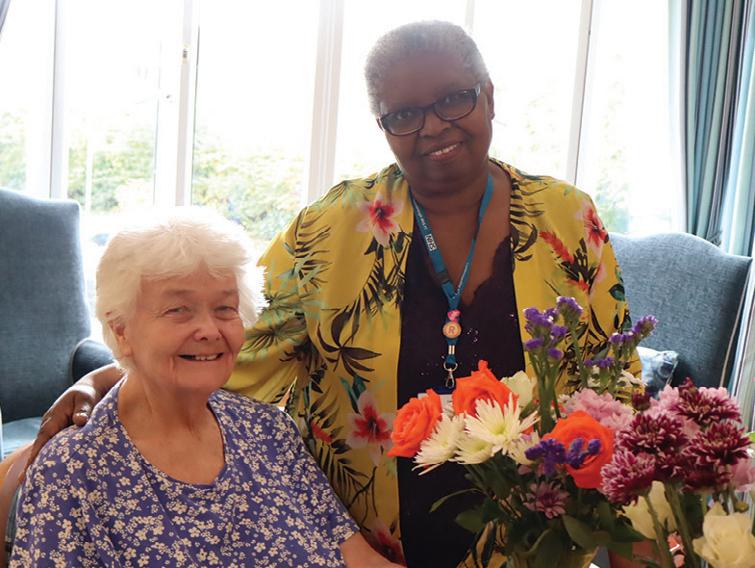
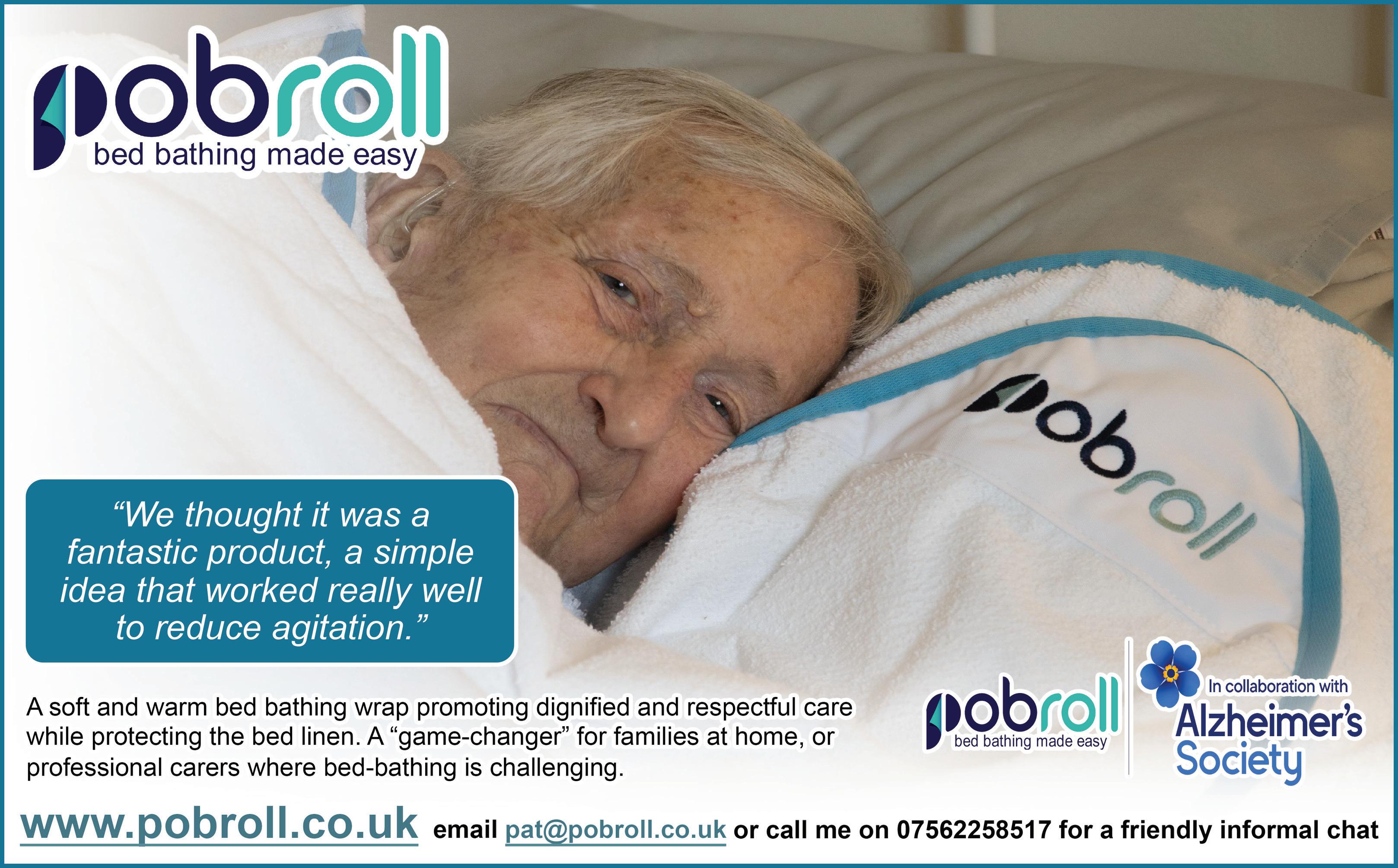

When helping a loved one look for a care home, there are many factors to consider, and choosing can seem like an overwhelming decision. Finding the right place with the care they need is important, but it doesn’t need to be stressful.
To help make the process easier, Jamila Faerber, Care Home Manager of Orchard Manor, part of Danforth Care Homes, shares five key questions to ask before choosing a care home.
1. WHAT TYPE OF CARE DO I NEED, AND WHAT DOES THE CARE HOME PROVIDE?
“Before you even start looking, speak to any current care providers or healthcare professionals looking after your loved one about their needs, and arrange a care assessment. Once you know the care they need, this will help guide you in choosing a care home, as you can ask what care they provide, and ultimately decide together if that is right for your family member, ,” advises Jamila, from the care home in Surrey.
“You can start to build a shortlist by asking any community support groups you or your family take part in, or by looking at reputable online directories with verified reviews from residents and their families, such as Carehome.co.uk. Whether the home has the right type of care is the first thing to ask, because if they don’t, you can quickly rule them out and look elsewhere. If they do offer the right type of care, you can keep asking questions to see if they are suitable. For example, ask about the training the staff have – a good care home will always be forthcoming with this information.”
2. WHAT ARE THE FEES, AND WHAT’S INCLUDED?
“What the fees are and what is included within that fee are important up-front questions to ask to determine whether the care home is within your family’s budget, and whether you are getting good value for money on all of the things your loved one might need or want - for example, outings and activities for residents,” says Jamila.
“Different care homes work this out differently, for example, some may charge more for different levels of care, or for amenities like daily newspapers, whereas others may offer one inclusive fee. Once you have this information, you can work out what items you will need, or may need in the future, and whether the price
and what’s included is right for you.”
3. WHAT’S YOUR POLICY ON LONG-TERM SUPPORT AND CHANGING CARE NEEDS?
“This is something which may come up in your care assessment, however, thinking ahead to how your loved one’s needs might change in the future is sensible. Asking about the home’s approach to long-term care and how they support residents as their needs evolve is important because your loved one will be most comfortable in a stable environment with as little change as possible. Knowing what support is in place should their care needs or financial circumstances change good to know from the start, so you and your family can plan accordingly,” says Jamila.
“The ideal solution is that whichever care home you choose, they can stay there, to avoid distress and disruption. The residents and staff will become their adoptive family. It’s also useful to find out how the home works with hospitals, GPs and other healthcare partners involved in your loved ones care, and what their process is of documenting these and informing the families.”
4. WHAT ACTIVITIES AND SOCIAL OPPORTUNITIES ARE AVAILABLE?
“With any home environment, you want to know your loved one will be able to socialise and engage in activities and different programmes, so they have the best quality of life possible. All homes are different in what they offer and already provide. You loved one may, for example, love gardening or trips out, so it’s always important to check the home supports these activities or provides personalised activity plans, before choosing,” suggests Jamila. “Likewise, if your loved one doesn’t want to participate in any activities, it’s good to know they can say no to things if they want to.”
“You can ask how the staff learn about the resident’s history, their likes and dislikes, and their routines, to make sure your loved one will be respected as an individual and listened to whilst living there. As well as activities, ask about mealtimes, and ask if you can visit for an afternoon or join in with an event at the home to sample the menu and see how residents socialise.”
5. WHAT DO THEIR INSPECTION REPORTS SAY, AND CAN I SPEAK TO RESIDENTS?
“Before choosing a care home, it’s a great idea to ask if your loved one and yourselves can visit the home and chat to some of the residents prior to deciding. The residents can give their open and honest feedback on the home,” says Jamila.
“As well as this, always read the most recent CQC (Care Quality Commission) report. CQC is an independent regulator of adult social care services in England, rating homes on a four-point scale, Outstanding, Good, Requires Improvement, or Inadequate. The inspectors rate the homes based on whether they are safe, effective, caring and well-led. All ratings and reviews on sites such as carehome.co.uk are available to you, and you should consider these when selecting a home.”
Barchester Healthcare is celebrating its talented Customer Experience team who have been victorious in not one but two categories at the UK Customer Experience Awards which took place at Wembley Stadium on 16th October 2025.
The care home provider which operates 268 care homes and private hospitals spanning the whole of the UK, entered two projects, both of which were named winners in their respective categories.
Established in 2010, the UK Customer Experience Awards are the most recognised customer experience focused awards in the UK, with entries across multiple sectors from globally renowned brands such as McDonalds, Sainsburys and HSBC. Barchester Healthcare was the only company from the health sector to be shortlisted in either of its categories.
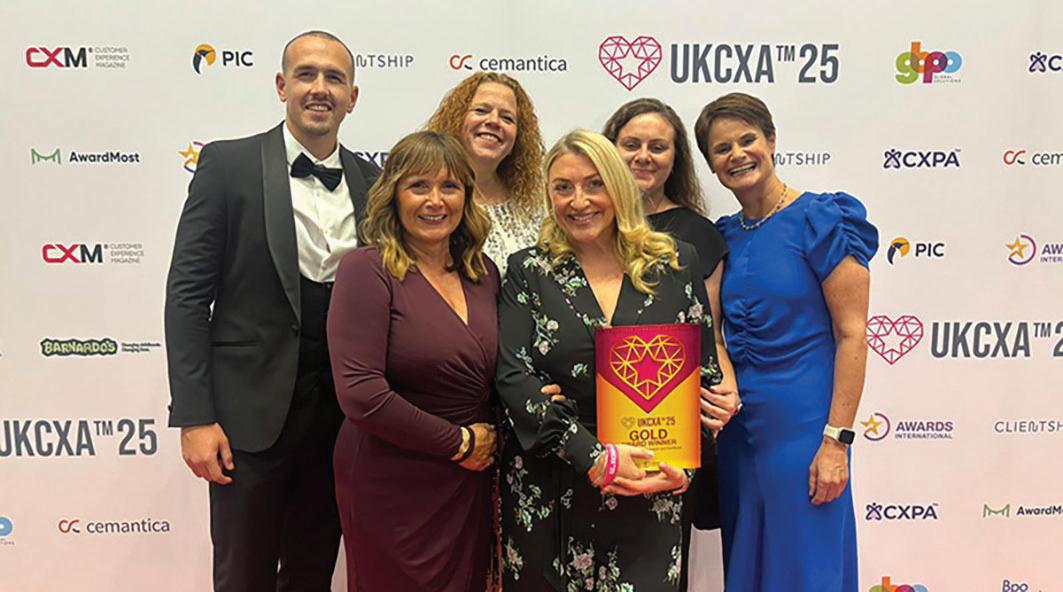
GOLD WINNER: Each year Barchester conducts a mammoth customer survey to collate feedback from its 13,500 residents and patients, and their loved ones. Entitled ‘Tell Barchester,’ the survey is an opportunity to gather the opinions of the people living in Barchester’s homes and hospitals, along with those of their families and loved ones. Every single piece of feedback given in the survey is considered and acted upon. Tell Barchester was named overall Gold Winner in the ‘Best Use of Customer Insight’ category.
SILVER WINNER: As part of its intensive digital transformation initiative, over the past two years
Barchester has designed, developed and delivered a new world leading CRM system powered by Salesforce.
The new system ensures that interactions from customers from point of looking for a care provider to living happily in a care home or hospital is seamless, supporting Barchester colleagues to increase efficiency and providing a better experience to customers through data only being inputted once.
The system was awarded Silver Winner in the ‘Best Use of Technology’ category.
Anna Shirley, Chief Customer Officer for Barchester Healthcare, said: “Our ethos is quality first and it is a great testament to this vision to be recognised for two awards that showcase how we are always listening to residents, families and the community to continually improve.”
Sarah Lander-Scott, Director of Customer Experience for Barchester Healthcare, said: “I am literally bursting with pride for my amazing team! To be recognised for our work at this level for a care home provider is extraordinary. We are competing alongside the most well-known brands in the world. We work exceptionally hard to ensure our customer experience is exemplary for our residents, patients and their families every day and at every level and these award wins bear testament to all of that hard work. I want to thank everyone who contributed to these projects, they are all superstars!”
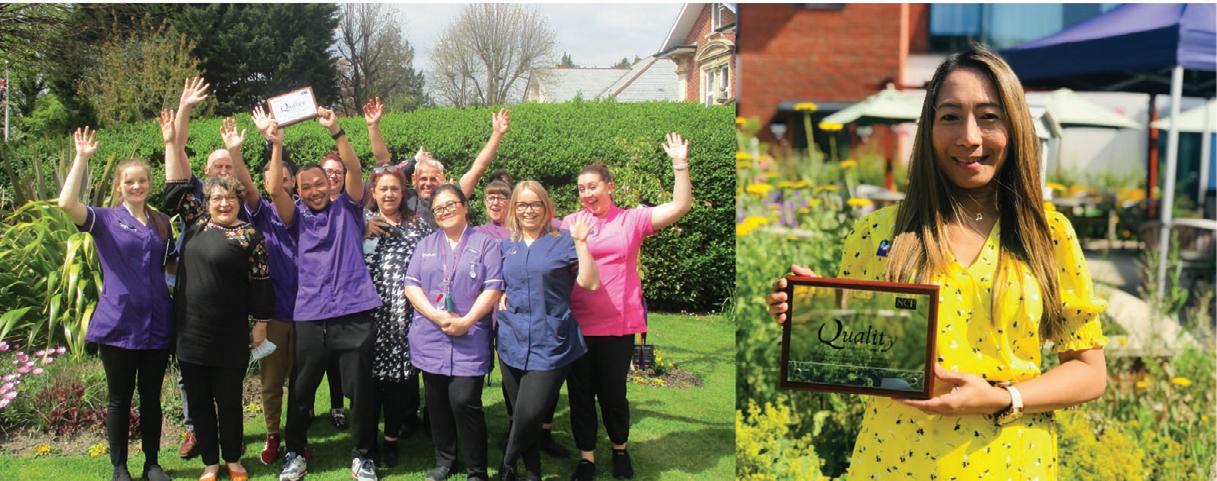
The Gold Standards Framework (GSF) Charity equips your team with the skills, confidence, and compassion to deliver person-centred care that truly makes a difference. For a limited time, the GSF Care Homes Training & Accreditation Programme is available at 50% OFF – now only £1,095 + VAT This affordable, high-impact training is designed for your whole organisation (for training in April 2026 - places limited). GSF Accreditation is CQC-recognised, endorsed by leading care organisations, and more than 97% of accredited teams report better experiences for people and their families. For more information, visit: www.goldstandardsframework.org.uk / 020 7789 3740 Future-proof your care. Empower your workforce. See the advert on page 7 for more information.
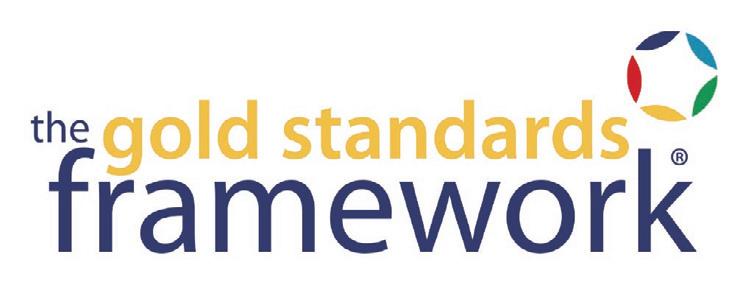
Care Minister Stephen Kinnock has written to local councils outlining key priorities for building winter resilience in adult social care, as the government announces up to £3.7 billion in additional funding for social care authorities in 2025-26.
In the letter, Kinnock acknowledged the sector’s ongoing work in supporting people to stay independent for longer and thanked councils for driving quality improvement and joining up services at neighbourhood level. The correspondence complements similar guidance issued by NHS England to integrated care boards and provider organisations.
The minister praised local councils for their urgent response to the recent failure of integrated community equipment supplier NRS Healthcare, and their efforts to establish alternative arrangements to ensure continuity of care.

He emphasised the importance of robust business continuity plans to address winter-specific risks, including severe weather, energy supply disruptions, transport issues and staff shortages. Councils and providers are directed to follow the government’s Adverse Weather and Health Plan for preparation and response.
Mr Kinnock stressed that infection prevention and control measures must be balanced with facilitating family and friend visits, which provide “vital social interaction” during the winter months.
The letter outlined changes to the winter vaccination programme. Free flu vaccinations will continue for frontline social care workers without employer-led occupational health schemes. COVID-19 vaccines will now be offered to adults aged 75 and over, care home residents and immunosuppressed individuals aged six months and above.
The respiratory syncytial virus (RSV) vaccine will be available to pregnant women at 28 weeks or more,
people aged 75-79, and those who turned 80 after 1 September 2024. HOSPITAL DISCHARGE AND ADMISSIONS
Whilst acknowledging good progress in some areas, Mr Kinnock noted that hospital admissions have risen and discharge delays have worsened in others, “which undermines outcomes for local residents.”
He called on councils to work with integrated care boards and NHS trusts on integrated winter planning, including supporting NHS surge planning for potential flu or COVID-19 waves, ensuring sufficient social care assessment capacity, and reducing hospital occupancy before Christmas to help systems manage January pressures.
The minister highlighted new guidance developed through the Better Care Fund Support Programme, including updated high impact change models on managing transfers of care, reducing preventable admissions, and supporting people with dementia and delirium.
Mr Kinnock also emphasised the importance of identifying and supporting unpaid carers throughout winter, ensuring they can access services to maintain their own wellbeing. He directed councils to the ADASS supporting carers hub for practice examples and resources.
Local councils should co-produce plans with care users and unpaid carers, considering access to respite and short breaks, clear information services, emotional and peer support, recognition of young carers, and support for those balancing work and care responsibilities.
The minister concluded by recognising councils’ understanding of local population needs and their duty under the Care Act 2014 to shape care markets that meet diverse needs and preferences, including encouraging variety among providers to offer genuine choice.
Residents at Hugh Myddelton Care House in Southgate had a brilliant day on Monday 20th October as they marked the start of the Hindu festival of Diwali, popularly known as the ‘festival of lights’.
Residents and families thoroughly enjoyed a vibrant dance performance by Varsha and her friends, filling the evening with energy and happiness. Diwali honours Lakshmi, the goddess of wealth, the lamps help Lakshmi find her way into people’s homes.
Head chef Chris prepared traditional Indian dishes including a range of warming curries, spicy samosas, crispy bhajis and papadums with lime pickle and chutneys followed by traditional Indian sweets such as laddoo and barfi for the

residents to enjoy.
Jean Bakhle resident Hugh Myddelton Care House commented: “I love all of the different cultural events that we celebrate here, there’s always something going on. I especially like the religious festivals from other cultures and sampling the wonderful food. It makes me feel like I am travelling abroad!”
Jade Shea, General Manager at Hugh Myddelton Care House said: “To celebrate Diwali at the home was fantastic, the colourful glow of the lamps created a very wonderful atmosphere and our chef made the most delicious dishes – everyone had a fantastic time.”
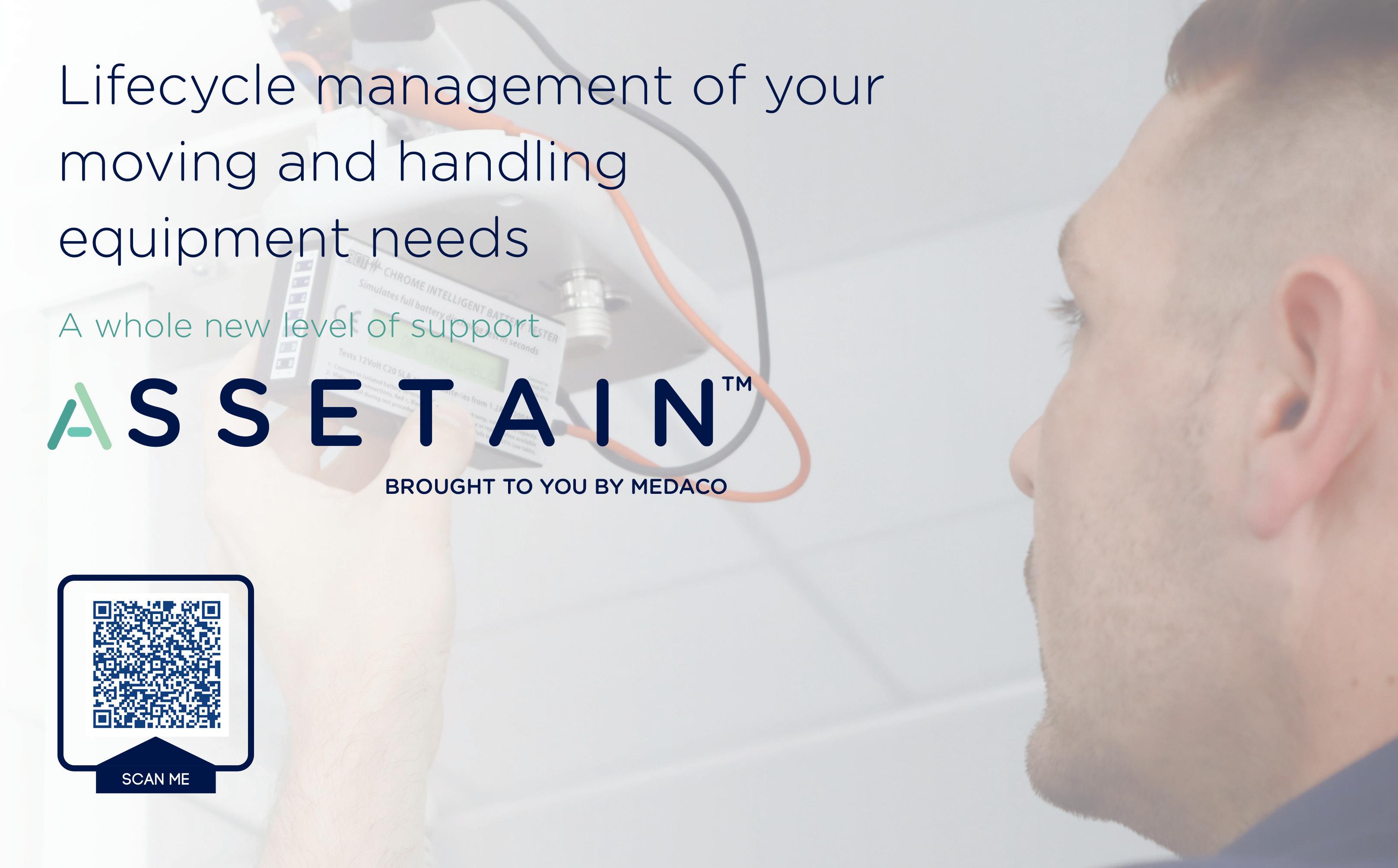
By Alex Morris, Associate in the Corporate team at Blacks Solicitors
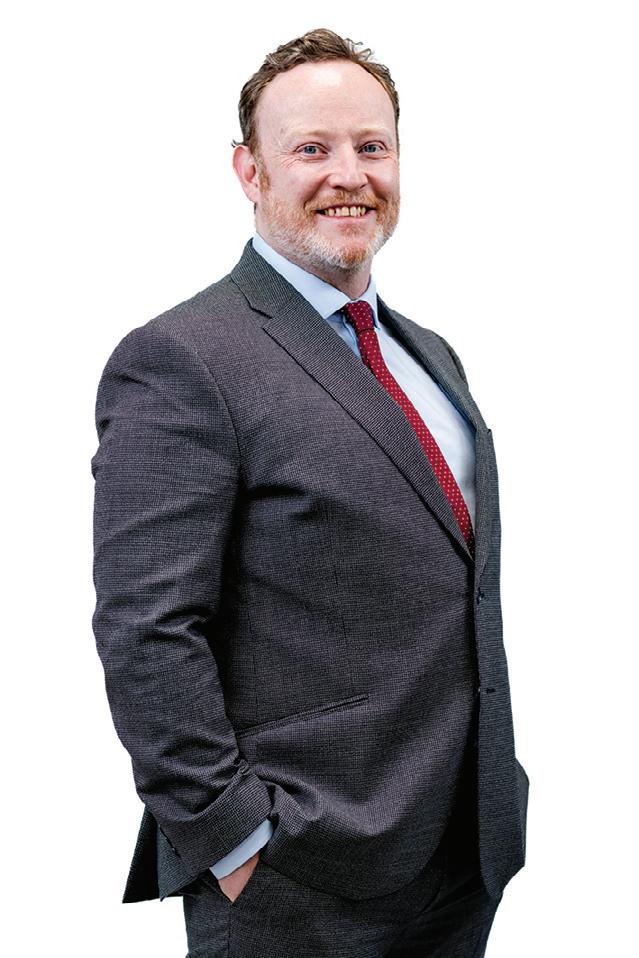
It is estimated that roughly 72.7%1 of English care homes are independent, with around 80% operating just one home. The UK care sector therefore remains heavily reliant on small businesses, many of which are considered family-run. For founders who have devoted their lives to building these businesses, there is often a strong desire to pass them on to the next generation. But is that always the best option? And if it is, what should both founders and their potential successors be considering?
Alex Morris, Associate in the Corporate law team at Blacks Solicitors and Managing Director of Alexander Care Home in Leeds, brings a unique perspective, combining legal expertise with first-hand experience of future proofing a family-owned care business.
FAMILY SUCCESSION - THE RIGHT OPTION?
In the care sector it’s not uncommon for multiple generations to work in the business in a hands-on capacity. There may be an expectation that ownership will naturally pass down. Yet the reality is that the sector is increasingly complex: relentlessly rising staffing and food costs, changes to immigration rules, constant regulatory upheaval, and the growing role of technology.
While an ageing population should in theory boost demand, provision is diversifying as people live longer with more complex needs. This requires higher staffing levels, greater investment, and advanced equipment.
Owners must ask: Do the next generation have the skills, drive, and acumen to carry the business forward? Perhaps harder still, is passing it on the best option for the business and the family? Does it have sufficient cash reserves and profitability to meet these challenges and continue investing in infrastructure? These are often emotive but necessary conversations, alongside obtaining expert tax advice on changing inheritance rules.
If a family succession isn’t the right option, a sale to a third party can be attractive. The care market has seen consolidation, with entrepreneurial operators forming regional groups, so there are often buyers for
independent homes or small groups.
To speed up a potential sale, owners should run their business “sale-ready”. That means not just keeping paperwork in order, but also maintaining strong management accounts that demonstrate financial stability and profitability. A legal and financial “health check” can be invaluable to avoid surprises and has the added benefit of ensuring a well-run business.
Sales are usually structured as either an asset purchase or a share purchase.
• In an asset purchase, the buyer acquires the property, business, contracts, and IP, without taking on historic liabilities (such as disputes or tax claims).
• In a share purchase, the buyer acquires the shares directly, and the company continues unchanged, subject to certain protections.
Each route carries different tax and practical implications, so expert advice is essential. A crucial point for care operators: under an asset purchase, the buyer must register with the Care Quality Commission (CQC) as a new provider. This can be an arduous process that delays completion, whereas in a share purchase the provider company remains unchanged, avoiding that hurdle.
If neither family succession nor a third party sale appeals, owners might consider selling to staff members. Management Buyouts (MBOs) are common across sectors: the seller agrees a price, takes a sum at completion, and the balance is paid over time, often with the option to retain a shareholding.
Another, less common route in the care sector is an Employee Ownership Trust (EOT). These allow owners to sell a controlling stake (over 50%) to all employees rather than just management. They offer significant tax advantages, but the rules are strict and require specialist advice. Other share schemes may also be suitable, and a good adviser can guide operators through the options.
When selling to employees, the same questions apply as with family succession: are they capable of running the business, is the business financially stable, and can the purchase be funded without overburdening the company? Again, expert legal and accounting advice is critical, particularly regarding HMRC clearances.
During the succession planning of my family’s business, Alexander Care Home, I approached my parents regarding the management buyout and went on to organise the new ownership structure.
I bought the home from my parents in 2020 through a debt-funded buyout, having previously worked for the family at another care home we owned before qualifying as a corporate lawyer. They had considered a third-party sale, but during the pandemic we felt it wasn’t the right time to maximise value. Instead, we created a holding company structure that enabled me to purchase their shares, giving them the funds to retire while retaining a small stake, and crucially keeping the business in the family.
The Abbeyfield Living Society (ALS), a leading not-for-profit provider of housing and care for older people across the UK, has received reaccreditation as a menopause friendly organisation, continuing its longstanding tradition of supporting employees in the workplace.
The Abbeyfield Living Society (ALS), a leading not-for-profit provider of housing and care for older people across the UK, has received reaccreditation as a menopause friendly organisation, continuing its longstanding tradition of supporting employees in the workplace.
The Menopause Friendly Accreditation, established by Henpicked: Menopause in the Workplace, recognises high standards and proven practices that embrace menopause in the workplace.
The Menopause Friendly Accreditation is industry-recognised and the only accreditation that sets clear standards which must be met. As such, it is truly meaningful and considered as a mark of excellence for menopause in the workplace.
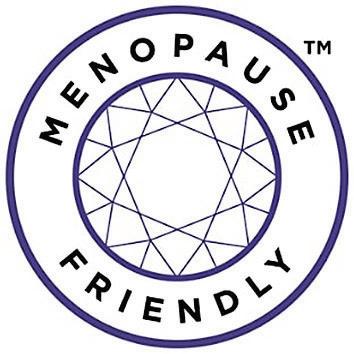
Having made history by becoming the first health and social care organisation to achieve initial accreditation in 2022, ALS was required to apply for reaccreditation and, once again, demonstrated evidence to the independent panel of their effectiveness in five key areas: culture, policies and practices, training, engagement and working environment.
Further developments over the past three years, including the establishment of a Menopause Task Force to uphold good practice across the organisation, ensured that ALS employees continue to feel the difference and appreciate the support the company and registered charity provides in their everyday working lives.
This scrutiny and requirement to maintain high standards of menopause friendly practices makes the industry-recognised Menopause Friendly Reaccreditation robust and truly meaningful.
Deborah Garlick, CEO and founder of Menopause Friendly by Henpicked, said, “ALS was the first in its sector to achieve the Menopause Friendly Accreditation, showing the importance it places on colleague wellbeing and inclusion.
“With around 80% of its workforce being women and over 40% aged 50 or above, ALS recognised early how vital it was to provide the right support.
“Not stopping at accreditation, the team kept building momentum with a Menopause Task Force, awareness training for managers, sofa sessions, policy updates and regular organisation-wide conversations to break down stigma.
“It’s inspiring to see ALS achieve reaccreditation, truly leading the way in health and social care and setting a powerful example for others to follow.”
ALS Corporate Services Director, Gail Manley, said, “We have worked hard to achieve our re-accreditation and are absolutely delighted with the accolade, but most importantly we are proud to be helping our staff through what can be a very difficult part of their lives. Supporting our female employees through the menopause is an integral part of our wellbeing strategy and we are passionate about continuing to ensure we are a menopause friendly employer.”
CEO, Paul Tennant, added, “Alongside our predominantly female workforce, with 40% over the age of 50, our residents can be as young as 55, so we see the wider benefit of promoting menopause awareness in terms of customer service provision. We recognise that menopause affects women in a variety of ways, and providing support around these issues is an ongoing priority for ALS.”
In April 2025, the Supporting the Provider Market (STPM) team in County Durham published a new report evaluating the use of pobroll® — a waterproof bed-bathing wrap designed to improve dignity, comfort, and ease during personal care. This evaluation was carried out across 10 care homes with high numbers of residents living with dementia. Each setting was given one or more pobroll® units and invited to share feedback through a structured survey. The findings reveal how even simple tools can make a significant difference in everyday care.
How was pobroll® used?
Most care homes used pobroll® daily or several times per week, showing it quickly became part of regular practice. Staff noted that one of the biggest challenges was not having enough units — all homes requested additional stock after the trial, highlighting a clear appetite for wider adoption. What did care teams think?
Feedback from the care homes showed strong support for the tool:
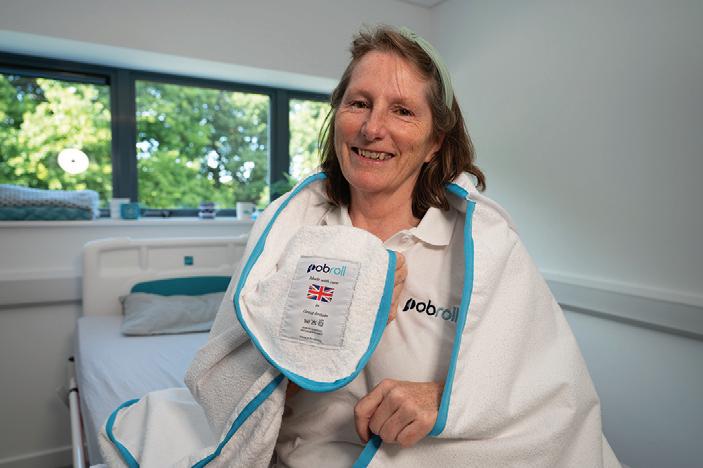
Ease of use was rated highly, with an average score of 4.4 out of 5. Staff found pobroll® straightforward to incorporate into care routines.
Training was rated slightly lower, at 3.8 out of 5, suggesting that while the wrap is easy to use, additional training resources could improve onboarding for new users.
Resident response was positive. Three in ten care homes reported improved mood or behaviour during bed
Written by Pat O’Brien of pobroll
bathing for dementia patients.
• Key benefits included greater warmth, coverage, and dignity for residents, especially those who might find conventional methods distressing. Some teams also found it particularly useful for end-of-life care
Would they recommend pobroll® for bed bathing for dementia patients?
Absolutely. Homes rated their likelihood to recommend pobroll® at 4.3 out of 5, with half of respondents giving it a full 5 out of 5. The overall feedback was clear: this is a valued, meaningful addition to personal care.
Would they recommend pobroll® for bed bathing for dementia patients?
The results of this trial reinforce what many professionals already believe — that small, thoughtful design changes can significantly improve care. For residents who are bedbound or living with dementia, personal care can often be a distressing experience. But with the right tools, it doesn’t have to be.
The pobroll® isn’t a complex device. It’s a simple, dual-layered cotton towelling wrap. But its thoughtful design — offering full coverage, comfort, and support — makes a real difference where it matters most.
If you’re part of a care home, hospice, or hospital and would like to explore how pobroll® could benefit your residents or service users, get in touch. We’re here to support compassionate, dignified care — one small change at a time.
See the advert on the facing page for details, or visit www.pobroll.co.uk
Health bosses in North Wales have been blasted for a “travesty” that cuts funding by more than £5,000 a year for care home residents receiv ing complex nursing care.
Betsi Cadwaladr University Health Board is paying less for patients in Conwy who need the most complex nursing care, despite them receiving round-the-clock support – including end-of-life-care – from highly qualified staff.
According to Kevin Jones, who has run the 38-bedroom Bryn Marl Care Home in Llandudno Junction for the past five years, the situation is “scandalous” and said it exposed a postcode lottery in how care is fund ed across Wales.
The six North Wales local authorities pay among the lowest fees in Wales but Conwy Council broke ranks and increased their funding to a level that makes them the sixth most generous in Wales.
Newport Council tops the table for support but Conwy’s neighbours Denbighshire are 21st and Gwynedd 20th with Wrexham Council rock bottom in 22nd place.
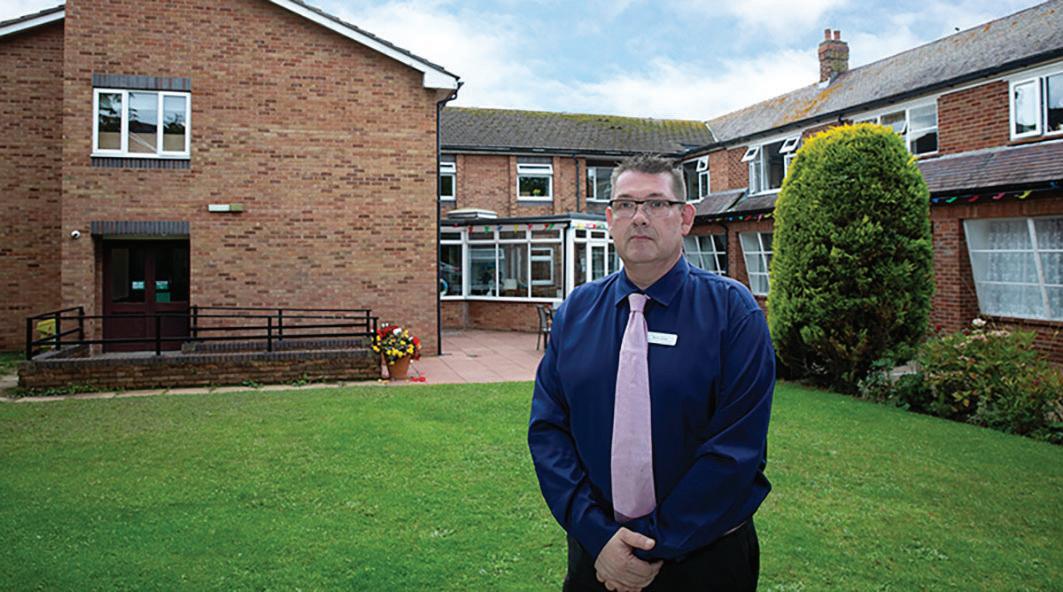
The majority of care home residents who need nursing care are on Funded Nursing Care (FNC) which is paid by local councils who are then reimbursed by the relevant health board. But when a resident’s needs become more acute and complex they move to a different care package called Continuing Health Care (CHC) which is paid directly by the health board.
When Conwy Council increased their FNC funding they actually overtook the CHC fees provided by the Betsi Cadwaladr University Health Board.
Kevin Jones said: “Conwy Council increased our FNC fees but they have overtaken the CHC fees paid by the Board so that residents who move to CHC funding are receiving less than they were before their condition deteriorated.
“That’s despite the fact that they may well need help eating and drinking, be in more danger of developing pressure sores and receive more specialist nursing care because as a person approaches the end of life their needs increase dramatically and they may have very complex issues.
“If they are assessed by the Health Board as needing CHC we will receive £1,217.23 a week from the Board – that’s £108.52 less a week than we were getting before, £5,643 less a year – it just doesn’t make sense.
“Their nursing needs have increased massively but their funding has actually gone down.
“When Conwy Council broke ranks with the other North Wales local authorities and increased their rates to a very realistic level we actually stopped charging the top-up fees which we had introduced.
“If we see someone’s condition deteriorating we have to ask the Health Board to review them but at the same time we know that we will be receiving less money while at the same time providing a greater level of care.”
Thea Brain, North Wales Policy Advisor for Care Forum Wales, said: “The big issue here is that Betsi Cadwaladr doesn’t have a proper methodology for determining the fees – it’s back of a fag packet maths.
“Other health boards, particularly in South Wales, do. Aneurin Bevan Health Board in Gwent takes the
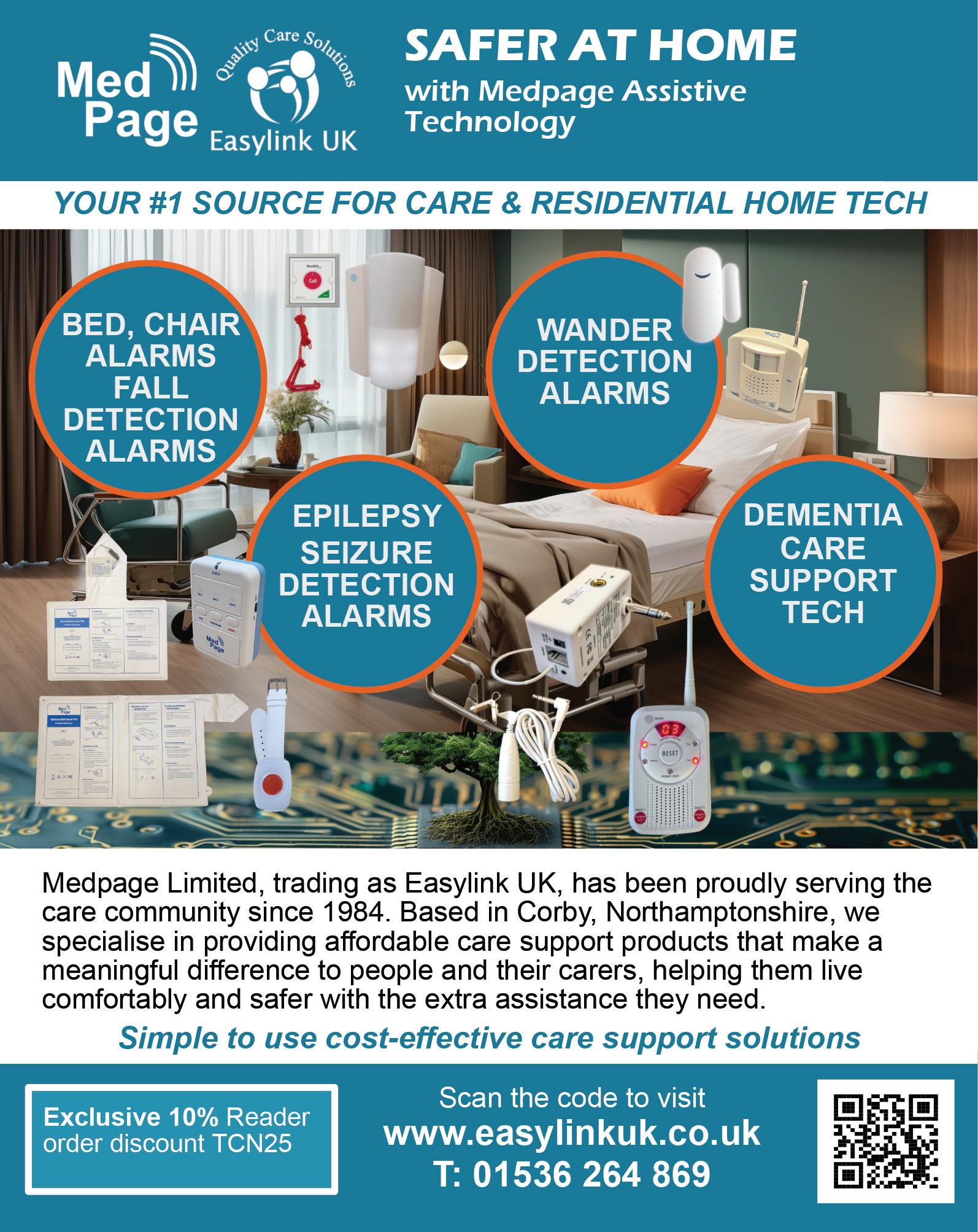
local authority fee and adds to it on the basis of specialist advice it commissions.
“Betsi Cadwaladr needs to adopt a proper methodology because what we have at the moment is a shambles and it’s not fair to the care providers and most importantly the fragile, seriously unwell people for whom they provide care.
“Most of them in Wales are small businesses, often family run, with one or two care homes and they’re doing their best to provide an essential service in their local communities.
“What is needed is a single, standardised methodology for calculating the level of care home fees with perhaps an additional Cardiff-weighting taken into consideration to reflect higher prices in the capital in the way London is more expensive than elsewhere in the UK.”
Mario Kreft MBE, Chairman of Care Forum Wales, said: “The fact that funding should reduce so sharply when a person’s care needs are far more acute defies all logic. It is utterly ridiculous.
“We are talking about people, really frail elderly people who are seriously unwell and the way they are being treated by the health board is nothing short of shameful.
“Not only is it demonstrably unfair, it is totally unjust and builds in even more inequality into a system that is already unfit for purpose.
“All this is on top of the postcode lottery of funding that means you have vast discrepancies paid by local authorities and health boards in different parts of Wales.
“With the notable exception of Conwy, five of the six local authorities are at the bottom or near the bottom of the pile when it comes to funding
“It is no more expensive to provide a bed in a care home in Gwent than it is in Wrexham and yet care providers in in Gwent receive on average £1,014 a week per patient, £180 more than a similar care home in Wrexham.
“There is a growing chasm between the fees paid by councils in the north compared to the majority of authorities in South Wales and this North-South divide is essentially treating our care home residents – who are by and large extremely frail and vulnerable – like second class citizens.
“Conwy Council were brave enough to break ranks with the rest of the cartel in North Wales and now their care home residents are literally paying the price for Betsi Cadwaladr’s failure to properly fund the care of the most vulnerable in our society.
“Social care is clearly seen as an area where those commissioning services feel they can cut costs and make savings at the expense of these elderly and infirm people and the dedicated staff who look after them.
“The people making these decisions should take a long hard look at themselves. How would they feel if this was one of their loved ones?
“The way Betsi Cadwaladr Health Board is treating vulnerable people is way outside the norms of human decency and it’s high time they did the right thing for a change.”


• We specialise in the sale and purchase of quality used wheelchair accessible vehicles and ambulances.
• They can be bought as seen or refurbished and sign-written to your own requirements.
• Fully serviced, new mot & warranty
• Engineers inspection supplied if required.
• Free delivery service available
• All buses comply with new legislation
•
• Lease hire and purchase


Comment from Jenny Willott,
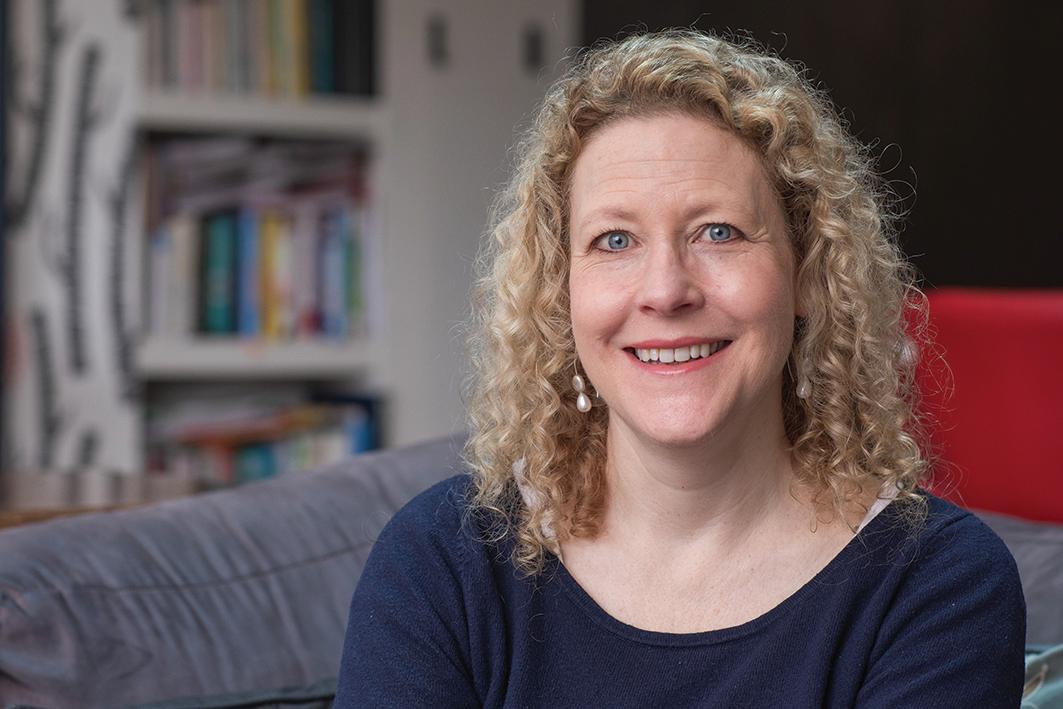
With local authorities’ adult care budgets under intense pressure and an increasingly ageing population, thoughts constantly turn to innovative and cost-effective ways to help older people who may be lonely or isolated.
But one simple and inexpensive formula to support those aged 75 and over has been used by my charity, Re-engage, for 60 years. And with research showing that loneliness has a major impact on health- the World Health Organisation has declared it a priority problemit has a role to play in reducing demands on public services.
In the last five years, six councils have issued S114 Notices – they have essentially gone bankrupt for a variety of reasons – and according to a recent survey nearly eight out of ten local authorities said their services for older people were at risk because of restricted finances.
Last year local authorities spent over £22bn on adult social care and it is estimated by the National Audit Office that ‘informal care’, provided by family, friends, neighbours etc. adds another £58bn - £100bn. Obviously it’s very expensive ensuring older people are looked after and remain part of the community.
Yet, not every scheme has to be a heavy burden on the taxpayer. At Re-engage we provide services which are free, open-ended, safe and effective.
The charity started in 1965 when a young solicitor called Trevor Lyttleton and friends took some older people for a Sunday treat. Sixty years on there are now hundreds of regular tea parties for people aged 75
and over taking place every week across the UK, run by over 7,600 volunteers. During the Covid lockdown, Re-engage introduced call befriending services and in recent years has started gentle activity and social groups involving carpet bowls, chair yoga, bingo and other activities.
Many of the 6,900 older people we supported last year were referred by social prescribers. Seven out of ten said they felt part of the community again after joining the charity and 60% reported their general wellbeing had improved.
One of the areas where Re-engage is thriving is Thurrock, Essex, where the council was declared bankrupt in December 2022 and around one in sixteen of the population is 75 and over.
We have eight Re-engage groups in the borough whose 70-plus volunteers provide free monthly tea parties for 80 older people. And with a long waiting list there are plans to start another two groups in the coming months.
The first Thurrock group was started in 2015 by Loraine Coleman and husband Mick. They say one of the key reasons they have become incredibly popular is because free transport is provided by very dedicated volunteers.
In Birmingham, where the local authority was also declared bankrupt in 2023, Re-engage has started several activity groups where older people can get involved in chair yoga, board games or just socialise. Our Bromsgrove group started last year and is a collaboration with Bluebird Care, which provides home care services as well as the venue for meetings. On the back of its success it is launching a new group in Sutton Coldfield
Ranjot Khatra, the company’s director told me: “Re-engage is an extraordinary organisation making a real and immediate difference in the lives of so many older people across the country.”
Around two million older people in the UK have an unmet need for social care so Re-engage services can never provide the complete answer. But we are moving forward with a five- year growth plan that aims to increase the number of older people we help to more than 15,000 by 2030.
Our volunteers show extraordinary levels of dedication and care and consistently demonstrate that you don’t need to invest huge amounts of money to have an impact on loneliness.
Sixty years ago Trevor Lyttleton learned that simple acts of kindness can make such a difference to those older people who may be isolated from society. And that lesson continues to be relevant today.
Black Swan Care Group has announced that it has acquired All Hallows Care Home, in Bungay, Suffolk marking a major strategic investment in local care provision.
Under new ownership, the home will be fully renovated and re-registered as a 42-bedroom care home, with enlarged bedrooms featuring ensuite wetrooms, designed to support people requiring short-term care and longer term support, including people living with dementia.
The investment by Black Swan means that the care home will become the Group’s second care home in Suffolk and brings the total number of homes in the group to 24.
Tom Lyons, the Managing Director of Black Swan Care Group:
“We are extremely pleased to share this exciting news about the purchase of All Hallows Care Home. Our goal is to create a special care home that combines high-quality residential care in a warm,

homely environment.
“Our closest care home in Beccles, just 5 miles away, has been operating at full capacity with a waiting list, so we know that there is a really high demand for high quality residential care in the local area for older people, including those living with dementia.
“We want to create an environment with excellent standards of care, with supportive staff. In order to deliver that, we will need to recruit a dedicated team of staff. We’ll be hiring more than 50 people in caring, catering, domestic, maintenance and management roles. They will be people who share our passion for delivering the highest quality, compassionate care.
“The home needs significant renovation and refurbishment in order for it to be suitable for supporting people’s care needs in the 21st century. We will start work quickly, aiming to open the home in the autumn of 2026.”
Leading mobility provider AAT is stepping up to help deliver the Government’s new value-based model of care, shifting hospital to community and sickness to prevention. And it is uniquely positioned, as its equipment- the top-selling stairclimbing wheelchair S-Max Sella- is already in almost every local authority social care department and NHS Trust across the UK.
In addressing hospital to community, one of the primary causes for delay in hospital discharge is the social care support needed for patients, be it short- or long-term. NHS data reports changes to stairs is the first change required to a home.
In addressing prevention, mobility is the biggest limitation affecting people in their homes. There are 1m+ accidents on stairs every year, resulting in 43,000+ hospitalisations.
AAT’s S-Max Sella makes stairs safe for almost anyone with impaired mobility, with the help of a carer. The battery-powered stairclimbing wheelchair is “plug and play”, requiring no structural alteration nor installation. It can cope with almost every common staircase design, even turns and spirals.
It reduces risk and manual handling as it can traverse onwards from the flight of stairs
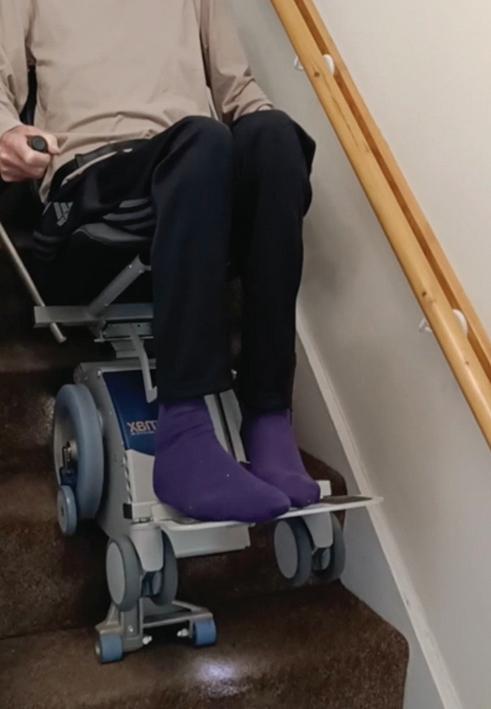
into whichever room is the final destination. It can even navigate external steps.
AAT’s unique re-issue capability for the Sella further delivers value: when the original recipient no longer needs the equipment, it can be re-prescribed to another person. AAT assesses each potential recipient, their carer and their home environment, and personally trains the carer(s) in the Sella’s safe operation as part of the process. No other stair solution has that capability.
“Making stairs safe is one of the biggest obstacles to all involved in social care- be it effecting efficient hospital discharge or preventing hospital admission in the first place,” says Peter Wingrave, AAT Director.
“With our existing presence within social care equipment stores, our nationwide team and speed of resolution, we are perfectly positioned to be the first call in addressing this element of the new Plan for Change. All it takes is a telephone call…”
Full details of AAT’s S-Max Sella and its re-issue can be found @ www.aatgb.com/ots/
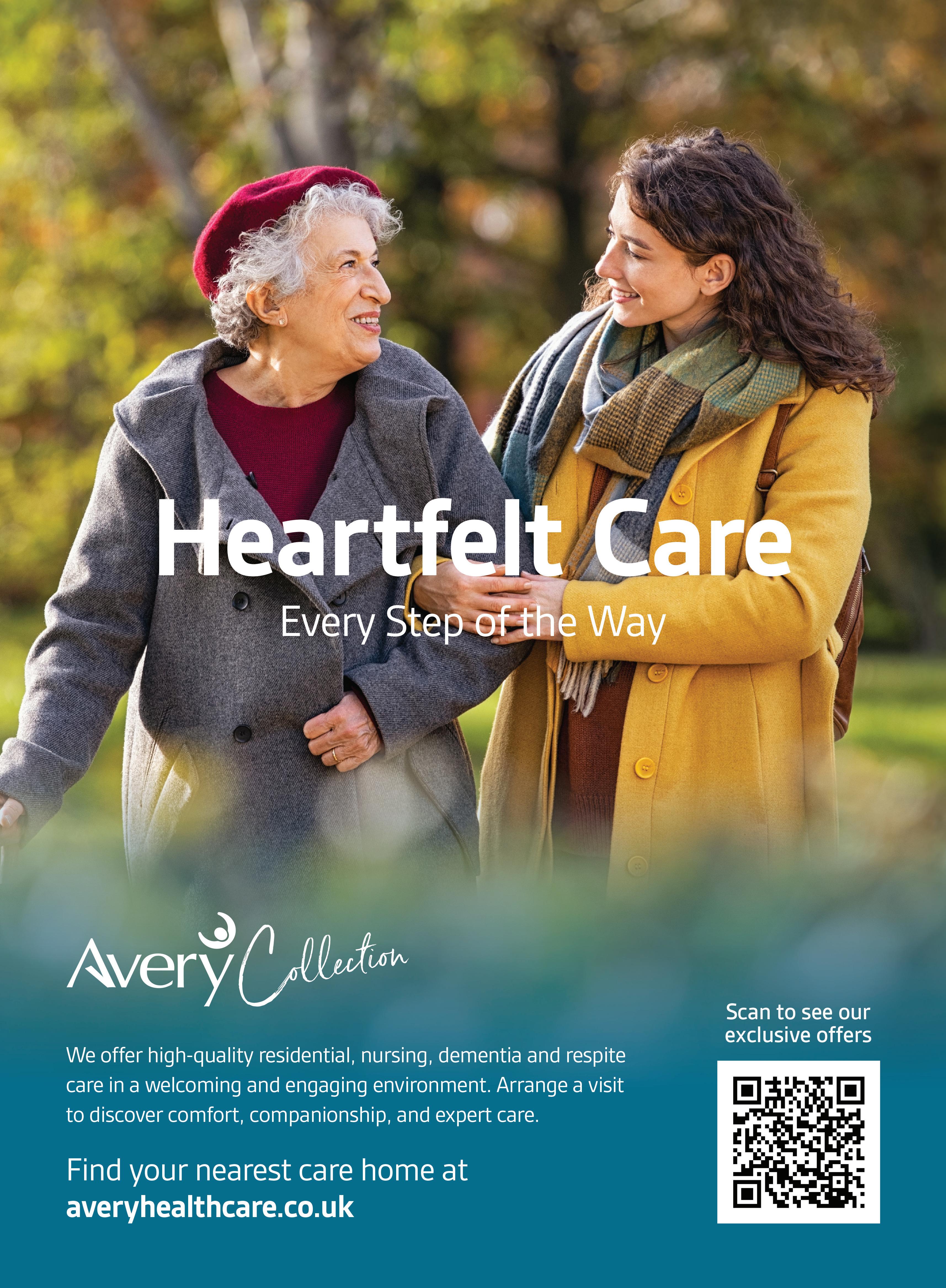


Homecare and live-in care provider Bluebird Care has revealed that its franchise network has raised a staggering £92,500 for Alzheimer’s Society in their ongoing fundraising partnership with the charity.
The donation will go towards supporting vital advocacy, support and information services to help those living with dementia and their families.
The fundraising total was unveiled at Bluebird Care’s recent annual conference at Hilston Deansgate Hotel, Manchester. Franchise partners and the National Support Team came together with representatives from Alzheimer’s Society to celebrate another year of care excellence, community impact and shared purpose.
The announcement marks another landmark in Bluebird Care’s ongoing fundraising partnership with Alzheimer’s Society.
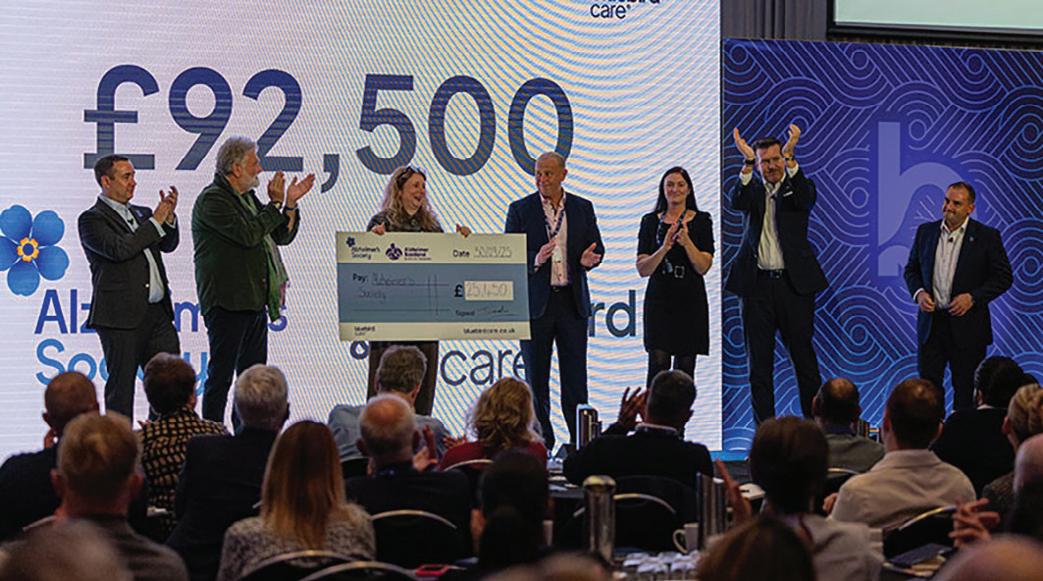
During this partnership, a UK-wide fundraising challenge has seen franchise partners and Care Professionals take part in skydives, marathons, trekking events, and Forget Me Not Tea Parties to raise awareness and vital funds.
Earlier this year, Bluebird Care launched a new national fundraising mission with the goal of raising at least £50,000 for Alzheimer’s Society in 2025 – as they are set on closing out the year at over £110,000
raised.
Siobhan Nugent, Head of Regional Fundraising at Alzheimer’s Society, celebrated the presentation of the cheque, saying: “Bluebird Care’s continued support for Alzheimer’s Society is hugely appreciated. There are nearly one million people living with dementia in the UK. The money raised will help us continue to provide vital support to people living with dementia, fund groundbreaking research and campaign to make dementia a priority.”
“It will take a society to beat dementia – a condition that devastates the lives of so many families across the UK. Bluebird Care network is showing the difference it can make when we work together towards a shared fundraising goal.”
Jonathan Gardner, Chief Executive Officer at Bluebird Care, added: “At Bluebird Care, we see the reality of dementia in people’s lives every day, and we know the vital importance of support, research, and awareness.
Our franchise network has gone above and beyond to raise this incredible total for Alzheimer’s Society, and we couldn’t be prouder. From skydives to tea parties, our teams are united across the UK in their commitment to help build a future where dementia no longer devastates lives.”
A care home in Kingston Vale has been dancing with delight after welcoming a local children’s ballet company to help them celebrate World Ballet Day.
Dancers from London Children’s Ballet pirouetted into Care UK’s Sherwood Grange, on Robin Hood Lane, to treat residents to an exclusive performance as part of their UK tour.
The young dancers performed a reimagined jazz-age story of Cinderella, called Ella’s Big Chance, before enjoying a meal at the home with residents.
Sherwood Grange resident Judy Stewart, aged 75, said: “What a wonderful performance and beautiful costumes. The young dancers were so talented and thank you for coming to perform to us.”

Malgo Wcislo, Home Manager at Sherwood Grange, said: “We were delighted to welcome London Children’s Ballet to our home. The residents were absolutely enchanted by the performance – it’s not every day you get front row seats to such beautiful ballet!
“Music and dance are such a great way for people to feel connected, and music has so many benefits for older people, so it’s no surprise the residents had such a wonderful time.
“There was a lovely atmosphere throughout the visit, with smiles, claps and even a few impromptu dance moves from residents!
“We’re so grateful to London Children’s Ballet for taking the time to visit us, and it was great to see wonderful conversations sparked by the performance.”
Hartford Care has achieved the prestigious national Gold Standards Framework (GSF) Quality Hallmark Award for end of life care at its Woodlands House care home in Woodlands, Southampton. The accolade, awarded after rigorous assessment by GSF, recognises the UK’s most exceptional health and social care providers.
Alongside high scores in all areas of evaluation, the assessor’s report highlighted how friendly and welcoming the Woodlands House team are, interacting with the residents in a professional and compassionate manner, with residents found to be happy and well cared for.
Katie Dixon, Home Manager at Woodlands House, says: “We are honoured to achieve the Quality Hallmark Award in what is our second consecutive assessment. The reaccreditation is testament to the commitment of our compassionate and hard-working team, who I’m incredibly proud of. We’re dedicated to delivering high quality care and support to our residents, helping them live fulfilled lives throughout their time with us.”
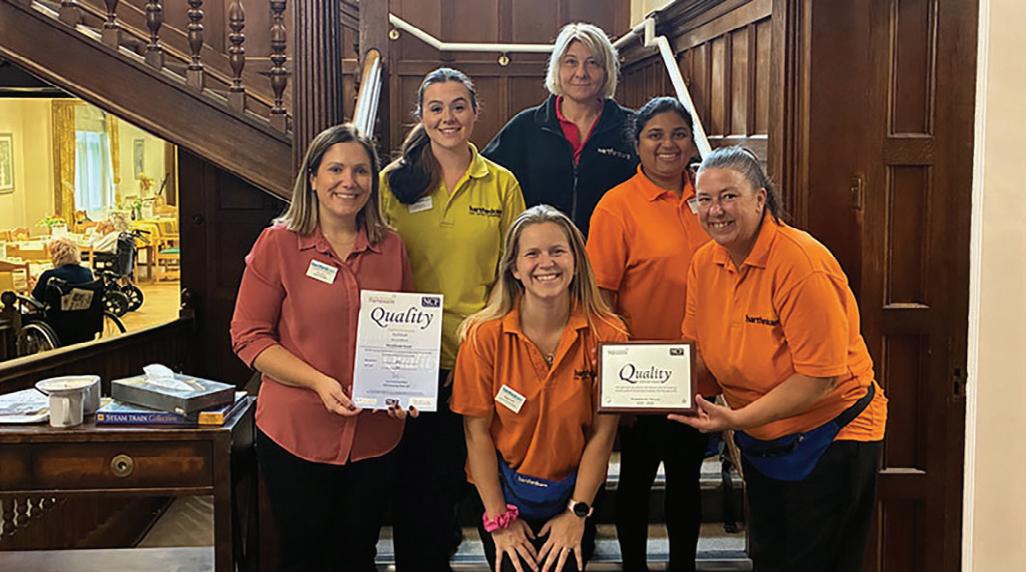
Julie Armstrong-Wilson, Chief Operating Officer for Gold Standards Framework, said: “We are delighted to congratulate all the organisations that have achieved accreditation and received the Quality Hallmark Award this year. This year we have had the most organisations apply for accreditation since we commended the accreditation process over 15 years ago.
“The quality of care and the compassionate cultures we have seen is truly inspiring, reflecting a deep commitment to ensuring people receive the right care at the right time, making a real difference to them and their families, proving that generalist services can and do provide good palliative and end of life care.
“These organisations exemplify the Gold Standards Framework standards by listening to what matters most to each individual and delivering care in line with their goals, wishes, and preferences. Supporting our ageing population to live and die well is so important, our Award Winners are leading the way in demonstrating what good end of life care looks like. A huge congratulations to you all.”
A new management team has been established at Egerton Manor care home located on Blackburn Road in Bolton, with Joanne Morton appointed as manager and Katie Dorning as deputy manager. Both hugely knowledgeable and highly regarded at Egerton Manor, Joanne was previously the deputy manager at the home, whilst Katie was previously Head of Care.
Making an immediate impact, Egerton Manor has been rated ‘good’ in all areas following a recent CQC inspection at the home. The report confirmed that Egerton Manor was well led, safe, effective, caring and responsive, with residents ‘treated with kindness and compassion’ and ‘an open and transparent culture within the management team with a clear focus on providing good care’.
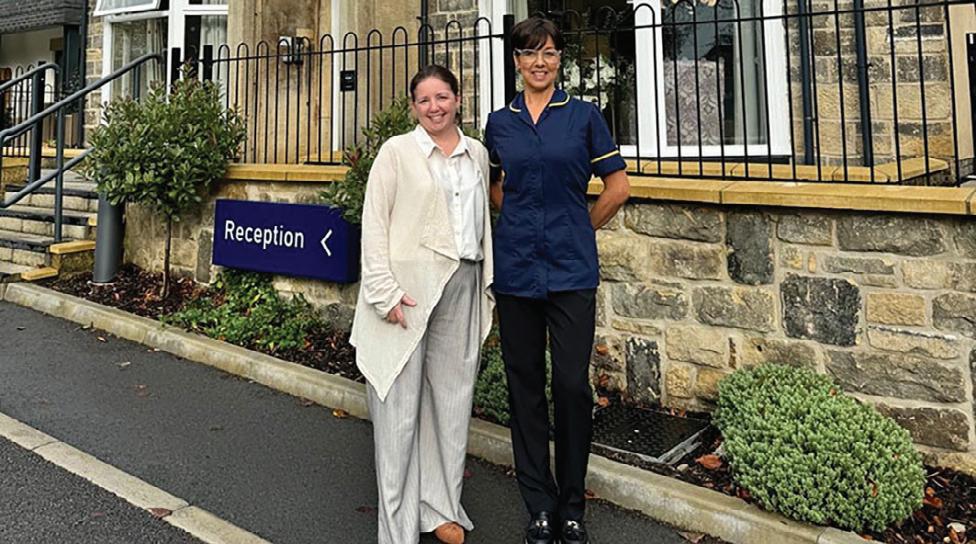
Joanne has been involved with Egerton Manager since the care home opened in 2023. A qualified nurse, Joanne has spent much of her career in care working with the elderly, an area she is particularly passionate about. Having nurtured the team at Egerton Manor for the last couple of years, she is proud of the overall good rating the home recently received.
Joanne says: “Achieving a ‘good’ rating in all areas by the CQC is a great achievement and I am so proud of the whole team. It demonstrates the outstanding efforts carried out daily by everyone at Egerton
Manor, ensuring our residents are cared for with compassion and respect, and that they are able to live their lives as fully as possible.
“I am thrilled with my promotion; having been involved with Egerton Manor since day one it is an incredibly special moment to be appointed home manager.”
Having worked in the health and care sector for over 25 years, Katie’s experience and expertise is impressive. Her passion to provide the very best care is exceptional, she leads by example and encourages career development through mentoring and training.
Katie adds: “I joined Egerton Manor in 2024 and have worked my way up to deputy manager, with every step incredible rewarding. I am privileged to work alongside such a dedicated team. I remain committed to doing more and making a real difference to the lives of our residents, creating a warm, respectful and inclusive environment for all within the home.”
Dawn Collett, deputy managing director at Lovett Care, concludes: “We are delighted to have promoted from within the company, furthering Joanne and Katie’s careers. Both are invaluable assets to Egerton Manor, and the recent CQC rating is testament to their hard work and commitment to the home, the residents and the staff.”
Unpaid carers, whose finances, health and ability to work are already impacted by their caring responsibilities, say the pressure of caring is unrelenting – with over half (52%) experiencing a rise in the number of hours they spend caring each week in the last year.
New results from Carers UK’s State of Caring Survey 2025, bringing together the experiences of over 10,500 people looking after a family member or friend, highlight an unsustainable situation for the UK’s 5.8 million unpaid carers.

Unpaid carers in the UK already provide care worth £184.3 billion each year, but they are increasingly being relied on to provide more and more care against a backdrop of rising costs, insufficient funding and staff shortages within the UK’s health and social care system.
There are worrying consequences for those caring for longer hours, who are more likely to experience poor mental and physical health themselves. 42% of carers answering this year’s survey say their physical health has worsened and 20% have experienced an injury because of caring. 74% say they feel stressed or anxious, some are experiencing panic attacks and are unable to sleep because of this.
As the cost of living crisis continues carers – who already face additional costs such as higher electricity bills – are also feeling increasingly stressed and anxious when they think about their financial situation.
Nearly half (49%) of unpaid carers say they have cut back on essentials such as food, heating, clothing and transport costs, while a third (32%) say they have taken out a loan from the bank, used credit cards or a bank account overdraft. 74% of carers say they are worried about the impact that their caring role will have in the future, including supporting themselves financially after their caring role has come to an end.
61% of working carers responding to this year’s survey say caring has affected the type of employment they have taken on. An
increase in hours spent caring often impacts employment, every day around 600 people in the UK give up work to provide unpaid care.
35% of working carers say they have reduced their working hours and a fifth (21%) say they have taken on a lower paid or more junior role that fits better with their caring responsibilities. Statistics published by DWP in March 2025 found that the cost to the economy of unpaid carers being out of work is £37 billion a year.
Previous research from Carers UK has found that 62% of carers who are currently providing or have previously provided unpaid care felt they had no choice in taking on the role because no other care options were available.
Helen Walker, Chief Executive at Carers UK, said: “A worrying number of people are taking on increasing hours of care each week at a significant cost to their health and finances as a result. For those whose employment is impacted, the consequences of limited earnings and pension contributions greatly reduce their prospects for financial independence in the future.
“Given the fact that very few people feel they have a choice about caring, we have both a moral and an economic obligation to support unpaid carers. Many are under considerable stress living a life defined by their caring responsibilities.
We need to start valuing their contributions because when they leave the workplace or experience burnout, this has wider consequences for workplaces and health services.
“These findings come at a time when the Government is moving forwards in several critical areas, including an independent commission on adult social care. Concrete action to deliver better rights and support for carers within plans to reform the NHS, review workplace rights and social security benefits has never been more urgently needed. Without this, unpaid carers will continue to struggle with devastating consequences for individuals, those they care for, and society as a whole.”
It’s always with huge sadness that care homes say goodbye to residents who have passed away.
This year, for the first time, Hargrave House care home in Stansted Mountfitchet, Essex, marked the passing of those they have lost in the past twelve months with a service of remembrance.
Care home manager, Shelley Sidhu, said: “We invited families back to the home to plant daffodil bulbs in our remembrance garden, and the Hargrave House team joined them for a moment of reflection.
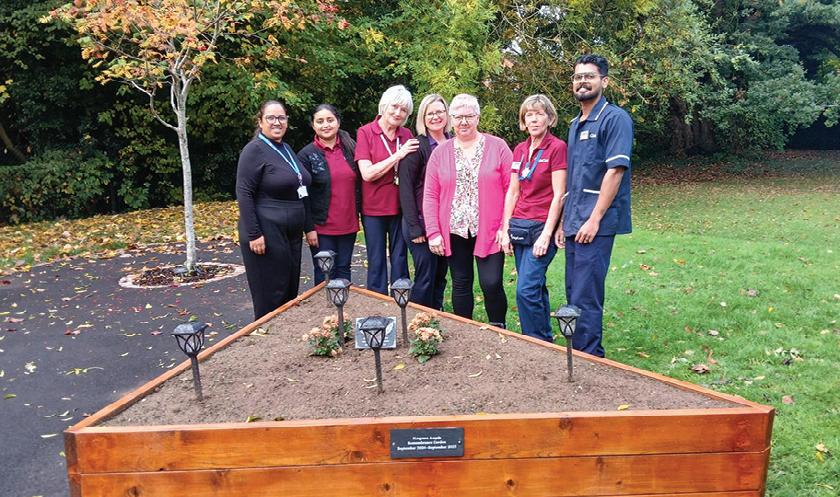
“As a care team, we have to carry on through heartache, but we continue to give back to our residents and their families.
Caring for our residents is not just a job – it’s a labour of love. We cherish every moment and every hug.” Families and friends who attended were deeply touched by the thought that went into creating the event, which was organised by Devine Crane, deputy manager at Hargrave House.
Sharon said: “Thank you once again for a truly heartfelt memorial service. It was a wonderful day despite the rain and I will remember it always. Thanks to you and the team for all you continue to do for residents and their families, past and present.”
Angela said: “It was a lovely way to honour their memory.”



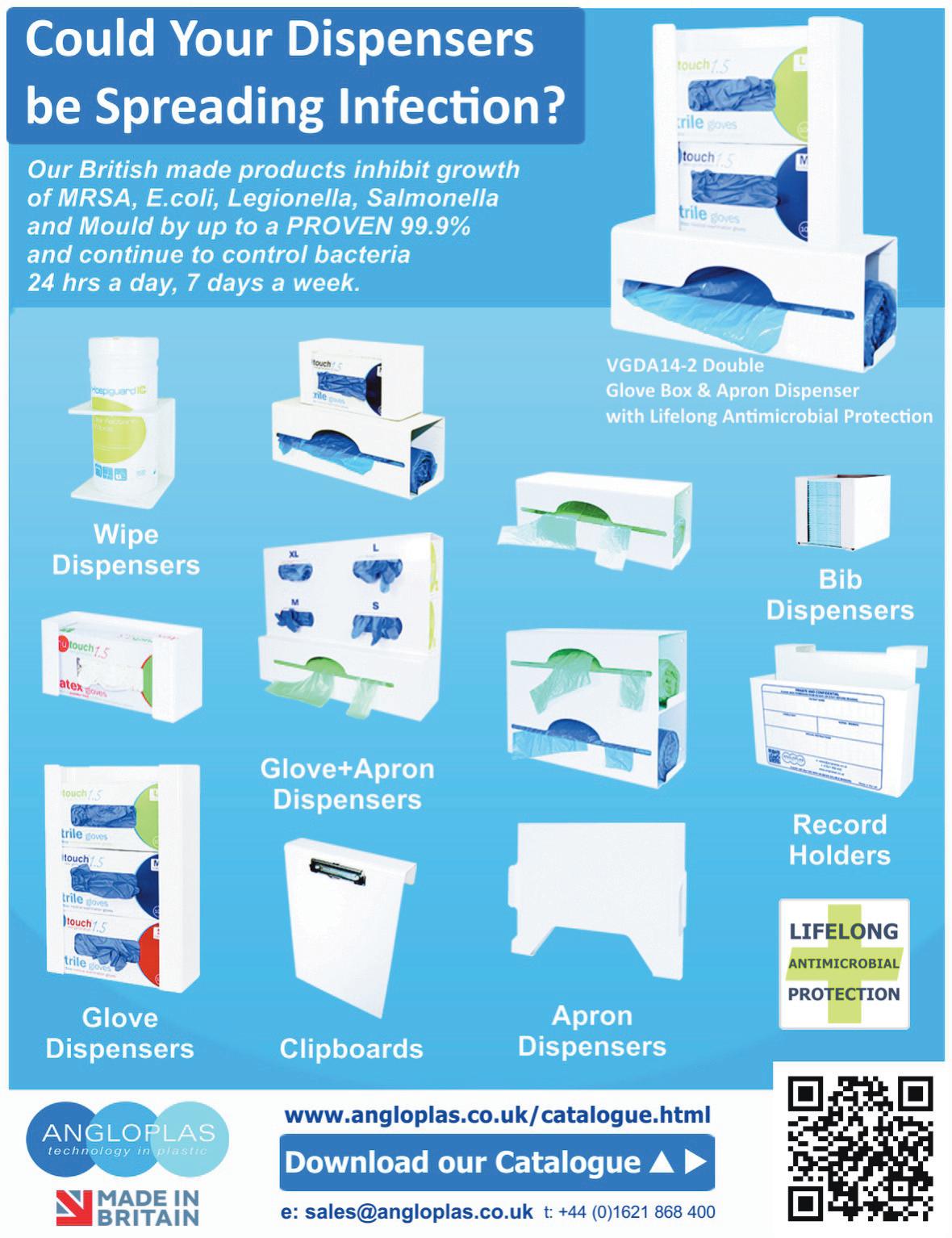
The Veteran Friendly Framework (VFF), the programme which is improving the lives of the Armed Forces community living in residential care across England, has received a positive evaluation of its impact. An independent review found veterans experienced an increase in social connections and felt less isolated as a result of the VFF.
The free-to-access VFF programme was launched in 2023 as a partnership between the Royal British Legion (RBL), Royal Star & Garter (RSG) and the Veterans Covenant Healthcare Alliance (VCHA). The VFF helps providers to offer tailored support for veterans and their partners living in care homes across England. Nearly 230 homes have now achieved VFF status, with a further 75 currently working towards approval and over 220 making active enquiries. To date, nearly 2,000 people are already being supported from the more than 25,000 veterans estimated to be living in care. The success of the programme has led to RBL and RSG committing to funding the VFF for a further two years. Care City’s evaluation, which was jointly funded by the Office for Veterans’ Affairs with VFF partners RBL and RSG, was the first of its kind and involved care home managers, staff, veterans and families, using a range of quantitative and qualitative approaches, to understand the delivery, impact and value of the VFF. Despite the challenges of collecting data from care homes, Care City returned impressive outcomes which showed that over 65% of veterans experience an increase in social connections, while 32% of veterans feel less isolated as a result of the VFF.
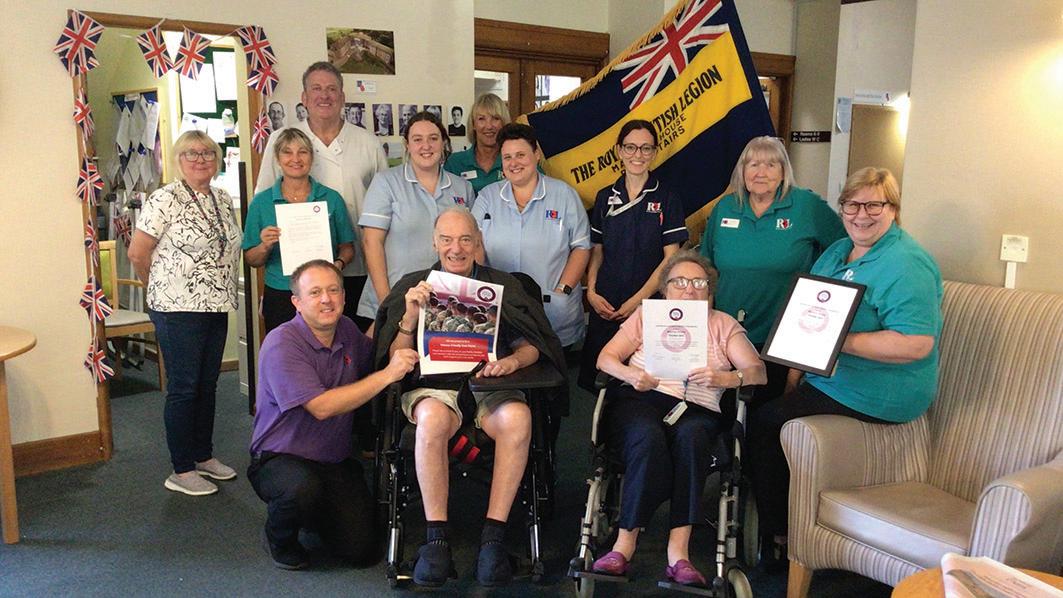
with the VFF (over 100 of the specially designed plaques have been purchased) to those seeking care. Particularly for care homes that are located in areas with a significant military presence, the VFF was perceived as a valuable marketing tool and was felt to improve the home’s reputation and visibility within the community, enhancing their services and creating a specialism, without unnecessary complexity. The report provides strong evidence of the VFF’s impact and ability to enhance care for veterans and their partners in homes across England, at a cost-effective level. It also demonstrates that the focus on personalised care and the connections created within the local military community have benefits for other care home residents, who also saw improved wellbeing, social connection and engagement in activities.
In the concluding section of the evaluation report, Care City states: “Evidence suggests that the VFF has led to improvements in the wellbeing and experiences of veteran residents. Given the impact observed and its alignment with national care priorities, we strongly recommend the continued rollout of the VFF across England and expansion into the devolved UK nations.”
In an environment where engagement can be tough, they also found that 55% of veteran residents participated in more activities as a result of the VFF and almost half were more engaged when they did get involved. Most importantly the evaluation showed that the recording of veteran status in care planning increased by over 100%, the first critical step to ensuring a person-centred focus. “Now we understand that veteran residents may have specific needs that require a different approach,” was one Home Manager’s comment.
Care City also found that staff reported the VFF-specific training not only increased their confidence in supporting veterans, but served a double purpose as a form of enrichment and professional development. They also experienced improved work satisfaction from increased connection to residents. As a VFF Champion shared at interview: “I find it so fulfilling and found it so amazing even just to ask them these questions, and then get to see photos and hear their families talk about their service.”
The programme also has business benefits for care homes who are actively promoting their involvement
Mark Atkinson, Director General of the Royal British Legion said: “The Royal British Legion is pleased with the evaluation of the VFF and it is encouraging to have clear evidence of the positive impact it is having on the standards of care received by members of the Armed Forces community. We’re proud to continue funding this vital programme alongside our partners, and welcome the recommendation to expand its reach so that even more veterans living in care homes can benefit from the tailored support and care they deserve.”
Andy Cole, Chief Executive at Royal Star & Garter, said, “A sizable cohort of our Armed Forces community now relies on essential social care services. The VFF programme makes a tangible difference by ensuring an individual's veteran status is recognised and their needs are better met, while promoting comradeship and connection amongst those who have bravely served our country. It is a simple concept, underpinned by outstanding support and training for care homes. This evaluation confirms it delivers real impact on people's lives. We are now committed to rolling the scheme out across the country.”
As a result of these strong outcomes, funding partners RSG and the RBL have committed to the ongoing project costs to December 2028. This will ensure wider scale roll-out along with ongoing identification, support and connection for many more veterans and their partners living in care across England.
Any care homes interested in receiving more information about the VFF can visit https://veteranfriendlyframework.org.uk email VFF@starandgarter.org or call 07425 326070
Colleagues and residents at HC-One’s Launton Grange Care Home in Bicester, Oxfordshire, came together to mark Baby Loss Awareness Week, uniting in support of those affected by the tragic loss of a baby.
Team members dressed in pink and blue, the official colours of the awareness campaign, and each donated to a baby loss charity of their choice. The heartfelt gesture opened up meaningful conversations throughout the day about a deeply emotional topic that has touched many within the Launton Grange community.
One of the home’s cherished residents, Barbara Marsh, who will be celebrating her 100th birthday next month, was among those who took part.

Barbara shared:
“As soon as I heard the name of the charity we are supporting, I just had to join the girls to support the cause.”
Baby Loss Awareness Week, held annually from 9th–15th October, aims to raise awareness, support bereaved families, and encourage open conversations about pregnancy and baby loss, a topic that often remains difficult to discuss.
At Launton Grange, the day served as a reminder of the power of community and kindness in helping to heal and support those who grieve.
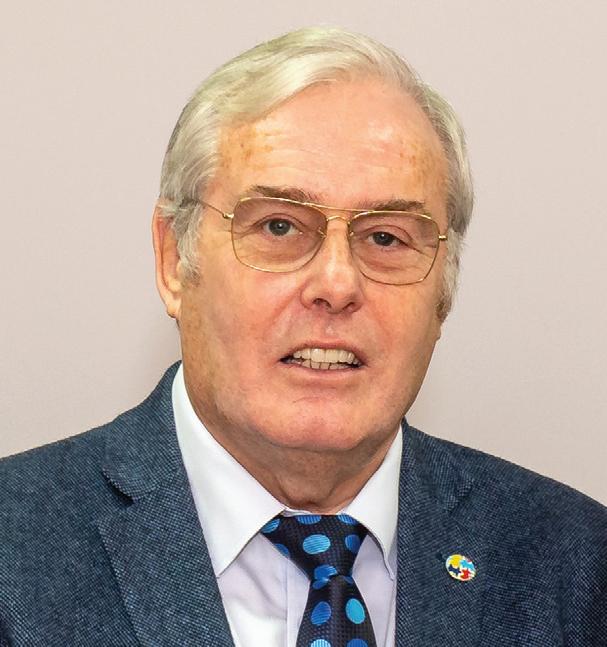
BEYOND CQC/ CIW/ CI STANDARDS
In today’s highly regulated health and social care environment, providers face the dual challenge of ensuring compliance while striving to deliver safe, high-quality, and commercially sustainable services. Care Inspections UK Limited (CiUK) has emerged as a trusted partner in this landscape, providing a professional and independent inspection service that goes beyond the standard requirements of the Care Quality Commission (CQC), The Care Inspectorate Wales (CIW) and the Care Inspectorate (Scotland), collectively “The Inspectorates”
What sets CiUK apart is its status as a registered inspection body, operating with the highest levels of professionalism and governance. This official recognition imbues care providers with confidence that inspections are carried out with rigour, objectivity, and an unwavering focus on evidence. Every report is underpinned by validated, research-based methodology, ensuring the outcomes are credible, balanced, and practical.
While CQC/ CIW/ CI inspections focus on fundamental areas such as safety, effectiveness, responsiveness, and leadership, CiUK’s approach extends further. Each CiUK inspection covers all the domains CQC/ CIW/ CI would expect, but also incorporates additional layers of analysis essential for continuous improvement. This Includes:
• Operational risk management involves identifying risks before they become incidents, reducing exposure for service users and providers.
• Quality enhancement: Assessing opportunities to raise standards in care delivery, staff engagement, and governance.
• Commercial sustainability: Offering insight into how operational practices influence financial performance, helping providers balance compliance with business viability.
The result is an inspection report that is not only regulatory-ready but also a strategic tool for improvement.
Professionalism is at the heart of CiUK’s ethos. Inspections are conducted by highly experienced professionals who bring frontline expertise from clinical, managerial, and governance roles in the care sector. This depth of knowledge allows CiUK to deliver meaningful feedback that resonates with staff at every level, from frontline carers to boardroom directors.
Independence is equally vital. As an external registered inspection body, CiUK reassures providers that its findings are unbiased and transparent. In a sector where credibility matters, this impartiality is invaluable in preparing for CQC inspections and demonstrating accountability to commissioners, investors, and the wider community.
Care providers today operate in an environment of heightened scrutiny and rising expectations. CIUK’s inspections do more than highlight compliance gaps; they provide a clear roadmap for reducing risk, enhancing quality, and driving organisational improvement.
By identifying weaknesses early, providers can take corrective action before issues escalate. At the same time, CiUK’s focus on strengths and opportunities supports a culture of positive development. This balanced approach ensures that inspection outcomes are constructive, not punitive, fostering continuous organisational improvement.
One of the most overlooked aspects of care provision is its commercial dimension. Poor compliance and weak governance inevitably carry financial consequences, from reputational damage to contract loss. CiUK recognises this and integrates commercial insight into every inspection. CiUK helps providers achieve operational excellence and commercial resilience by aligning care quality with business performance.
Choosing Care Inspections UK Limited means selecting a partner committed to professionalism, independence, and comprehensive excellence. CiUK inspections do more than prepare organisations for regulatory visits—they empower providers to deliver safer, higher-quality care while protecting their reputation and commercial future.
CiUK delivers evidence-based assurance and actionable insight for providers who want more than compliance.
The Department of Health and Social Care (DHSC) has confirmed continued funding for the Better Security, Better Care programme following a competitive tender. The renewed grant of £21 million over the next three and a half years, to March 2029, will extend support for adult social care providers across England to strengthen their data protection and cyber security capabilities.
This next phase will feature both ongoing national and local support, and the rollout of two new service strands:
Voluntary data and cyber health checks, delivered via local care associations, to help providers baseline and improve their data, privacy, and cyber practices.
Dedicated transition support for enhanced standards, co-designed with the sector to ensure that Data Security and Protection Toolkit (DSPT) requirements remain proportionate and tailored for adult social care.
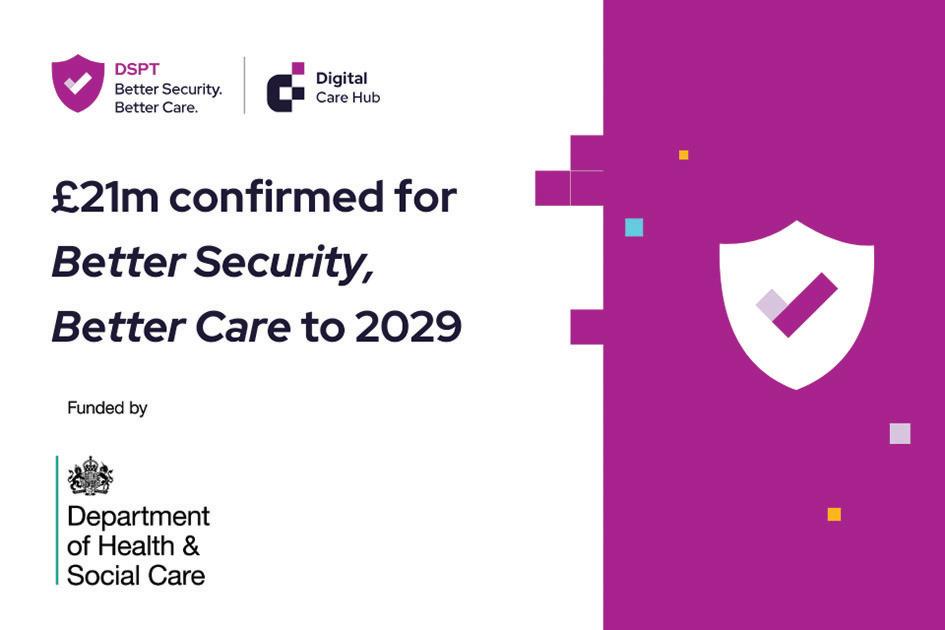
The next phase will also focus on helping providers move beyond compliance with the DSPT to embed good data protection and cyber security practice into daily operations. This will support care services to not only meet national standards but to make data safety a routine part of delivering quality care.
BUILDING ON STRONG SECTOR PROGRESS
The programme enters this renewed phase on the back of substantial achievements including a rapid increase in care providers with the DSPT in place – up from less than 5% in 2019 before the programme started in 2021, to just over 76% this year. Social care is now the largest sector to have the DSPT in place.
These results have been achieved in large part thanks to the local support provided by the network of Local Support Organisations (LSOs), offering workshops, one-to-one advice, and hands-on help.
Michelle Corrigan, Programme Director of Better Security, Better Care, said:
“We are delighted that, at a time when resources are tight, the government has recognised how critical support for care providers is. Data protection and cyber security are essential to safe, high-quality care, and this next phase is about moving beyond compliance with the DSPT to genuine implementation of good practice in day-to-day operations.
“With this renewed funding, we can continue to build on the strong progress already made. Our local support organisations play a vital role in reaching providers across the country, helping them develop the confidence and capability to manage data safely and securely.”
Ethan Gray, Adult Social Care Cyber Policy Lead at the Department of Health and Social Care, said:
“The Better Security, Better Care programme has been instrumental in changing the way providers think about data security, it has helped thousands of providers to meet national data protection standards and strengthen their cyber resilience, while embedding good digital practice across social care. We’re delighted to continue working with Digital Care Hub and the sector to build on this success and ensure every provider can benefit from safe, secure digital ways of working.”
The next stage of the programme will reinforce national and local support mechanisms, deepen sector engagement, and introduce new services tailored to evolving requirements. Once all Local Support Organisations have grant agreements finalised, the full list will be published.
0808 196 4848 help@digitalcarehub.co.uk www.digitalcarehub.co.uk
Five team members from leading care home provider, Oakland Care, have graduated as ‘Green Champions’ after completing courses with the Institute of Sustainability Studies (ISS).
The ISS is an educational institution which delivers accredited corporate sustainability training that is designed to empower organisations and their employees with practical knowledge and the tools to drive impactful and measurable change.
Over the course of a nine-month period delegates from Oakland Care studied modules including: Introduction to Business Sustainability, Sustainability Plan Implementation, Decarbonisation: Achieving Net Zero, Circular Economy and Sustainable products, Business with Biodiversity, and Sustainable Operations.
The course formed part of the care home provider’s ‘Sustainability Development Pathway’. This four-tier selection of courses, which range from e-learning to full apprenticeship, enables and encourages team members to access sustainability training which is suited to their level and interest.
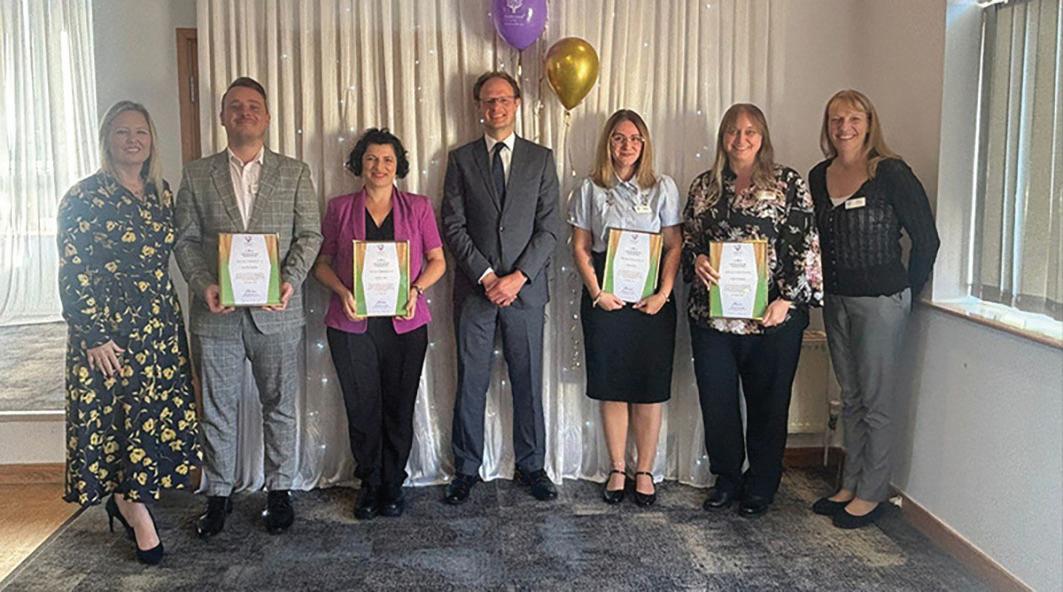
The ‘Green Champion’ graduates will now apply their learning within their roles, helping to shape the
next part of Oakland Care’s sustainability journey as they continue to push the boundaries of what is possible for care providers’ in the fight against climate change.
Aaron White, Assistant Director of Corporate Services & Sustainability at Oakland Care, said: “Congratulations all! It was fantastic to celebrate your achievements and hear more about what you have learnt and the ideas you have to further drive sustainability-led growth at Oakland Care.
“We are focused on investing in our teams through a sustained universal commitment to internal growth and support. For us, opportunities such as this are a fundamental part of the process.
“For many of those that have undertaken this programme they have gained more confidence and belief in themselves, as well as developing new skills and knowledge in the sustainability space which they can put into practice within their roles.”
“We look forward to offering yet another cohort the opportunity to undertake courses with the ISS in 2026.”
Repose Furniture is one of the UK’s leading manufacturers of bespoke seating solutions, with a reputation built on craftsmanship, innovation, and a strong commitment to improving the quality of life for its customers. Established in 1999 and based in the West Midlands, the company has grown from a small family business into a trusted supplier to both the domestic and healthcare markets. Every chair produced by Repose is handmade in the UK, with an emphasis on quality, durability, and comfort, ensuring that each product meets the specific needs of its user. Whether for home use or demanding healthcare environments, Repose combines skilled upholstery techniques with modern engineering to create chairs that provide postural support, pressure management, and ease of use. Their wide product portfolio includes rise and recline chairs, hospital and care home seating, bariatric solutions, and specialist products designed to address particular medical and lifestyle needs. An essential element of their offering is flexibility: customers can choose from a range of back styles, seat cushions, mechanisms, and fabrics, allowing each chair to be tailored to the individual. Interchangeable parts mean that a chair can adapt as a user’s requirements change, extending the product’s longevity and ensuring value for money. The healthcare sector is a particular area of expertise for Repose. They strive to design chairs that balance comfort with clinical functionality. Features such as tilt-in-space mechanisms, adjustable cushioning, and pressure relief options make their healthcare seating particularly suited to long-term use in hospitals, hospices, and care homes. The company’s bariatric range demonstrates the same careful attention to
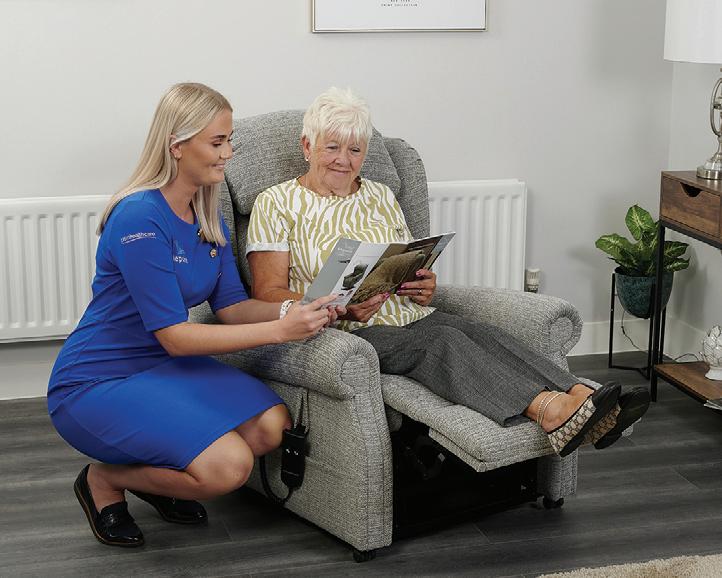
detail, offering robust yet comfortable solutions for larger users.
While customisation is the centre of the Repose offering, they also recognise the urgency often faced in healthcare settings. To address this, Repose have developed their Healthcare Express Chairs, designed to deliver highquality healthcare seating at speed. The models in this range can be despatched within just five working days. The Multi Bari Express and bestselling Boston Express, for example, are available on this five-day lead time, offering care providers a rapid solution without sacrificing quality or functionality. For less specialist needs, some homecare models are even available on faster turnaround times, demonstrating Repose’s ability to balance responsiveness with craftsmanship.
Repose’s reputation is further reinforced by its after-sales support, 5-year manufacturing warranty, and commitment to ethical and sustainable practices. With a UK-based factory, a dedicated distribution network, and close relationships with healthcare professionals, the company continues to be a trusted partner in multiple sectors throughout the country and beyond.
In combining bespoke design with reliable express options, Repose Furniture stands out as a manufacturer that truly understands the diverse needs of its customers. For over 25 years, it has delivered not just chairs, but comfort, dignity and independence — values that remain at the core of everything it does. For further information, see the advert on the facing page or visit www.reposefurniture.co.uk
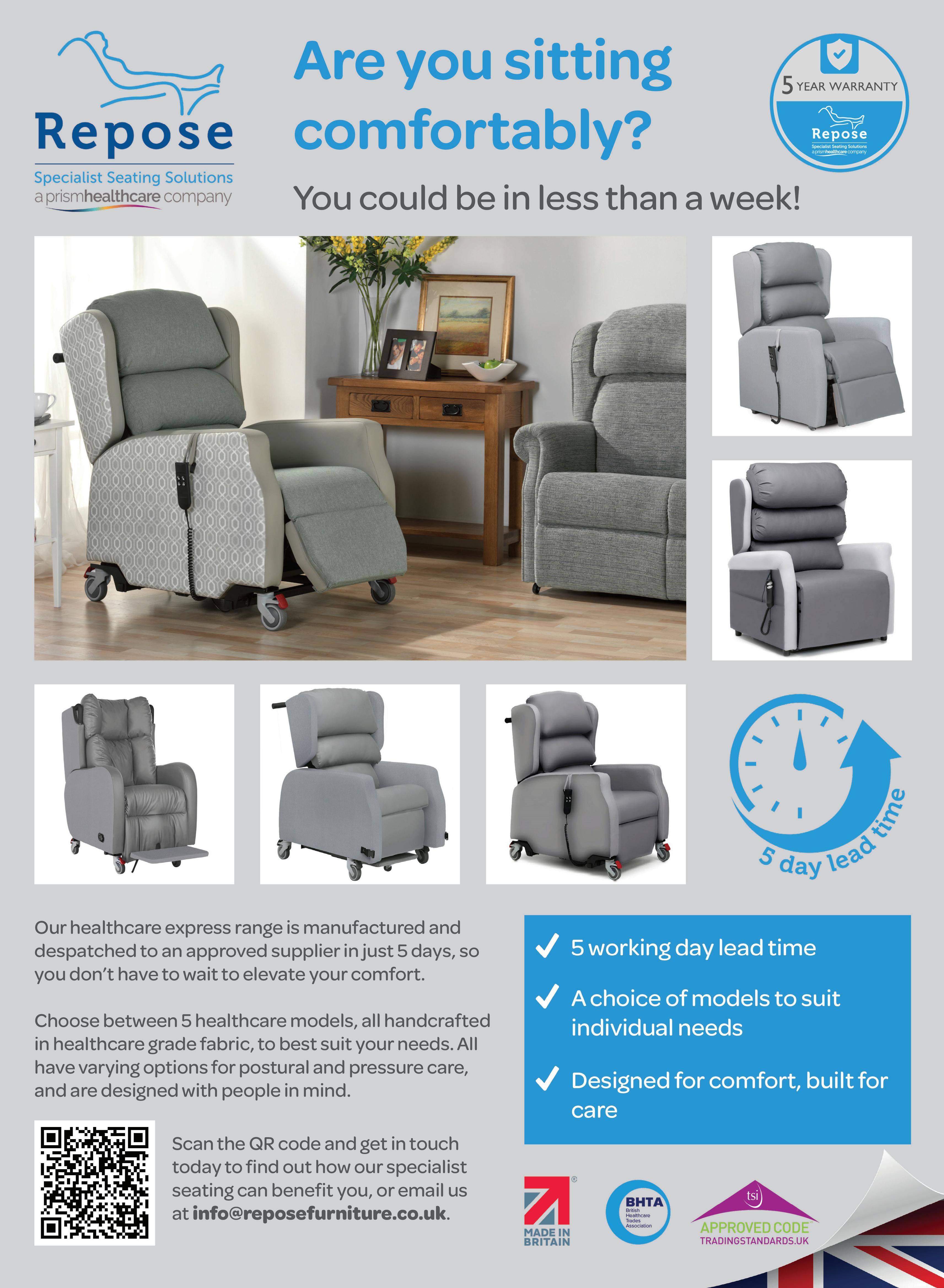
Jubilee Court Care Home, part of the Runwood Homes Group, is proud to announce that it has received the Gold Standard Framework (GSF) Quality Hallmark Accreditation Award, recognising the outstanding quality of care it provides to individuals in the final years of life.
The award was presented at the GSF Conference and Awards Ceremony held on 26 September 2025 and accepted on behalf of Jubilee Court by Heather Limb (Home Manager), Kim Webster (Deputy Manager) and Zimran Alam (Director of Care).
The team are incredibly proud to receive this nationally recognised accreditation. It reflects the dedication and compassion present every single day to ensure residents live with dignity, comfort, and respect during the later stages of life.
Over the past three years, the Jubilee Court team has worked diligently to meet the rigorous standards set by the Gold Standard Framework. This achievement sets Jubilee Court in a leading position,
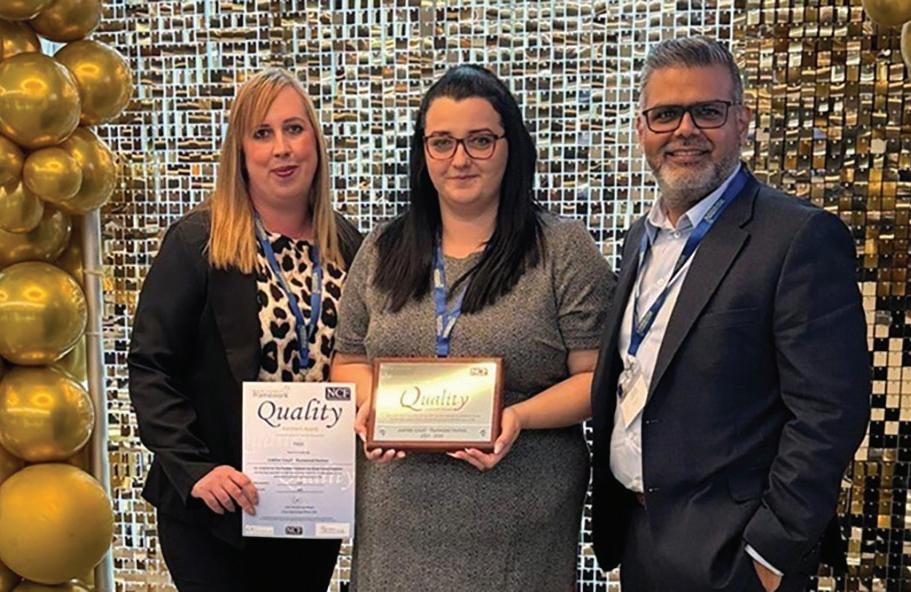
and it is especially significant as the only care home in Nottinghamshire to be accredited this year.
The award has been warmly received by the community: “A massive congratulations to you all. Well deserved!” – KH, family member
“Well done to you all. You all deserve it. What a fantastic team!” –DFA, family member
The conference also provided an opportunity for attendees to connect with others from across the care sector, sharing best practices and celebrating collective achievements.
“There was an immense sense of pride on returning to the home with the award – which now sits pride of place in reception,” added Heather.
The idea to pursue the GSF accreditation came following encouragement from Jubilee Court’s CQC inspector, who recognised that the home was already meeting many of the high standards required.
HC-One’s Fosse Way View Care Home in Bingham, Nottingham, is delighted to announce the launch of a new Dementia Support Group, starting Wednesday 22nd October, from 6:00pm to 7:00pm at the care home.
Caring for someone with dementia can be challenging and emotionally draining. Conditions such as Alzheimer’s, Lewy Body, and Frontotemporal Dementia, along with many other forms of dementia, affect not only the individual but also their families and carers. Fosse Way View aims to provide a safe, welcoming space where carers and families can share experiences, gain practical guidance, and find muchneeded emotional support.
A representative from the Alzheimer’s Society will join the first session to provide professional guidance, answer questions, and help
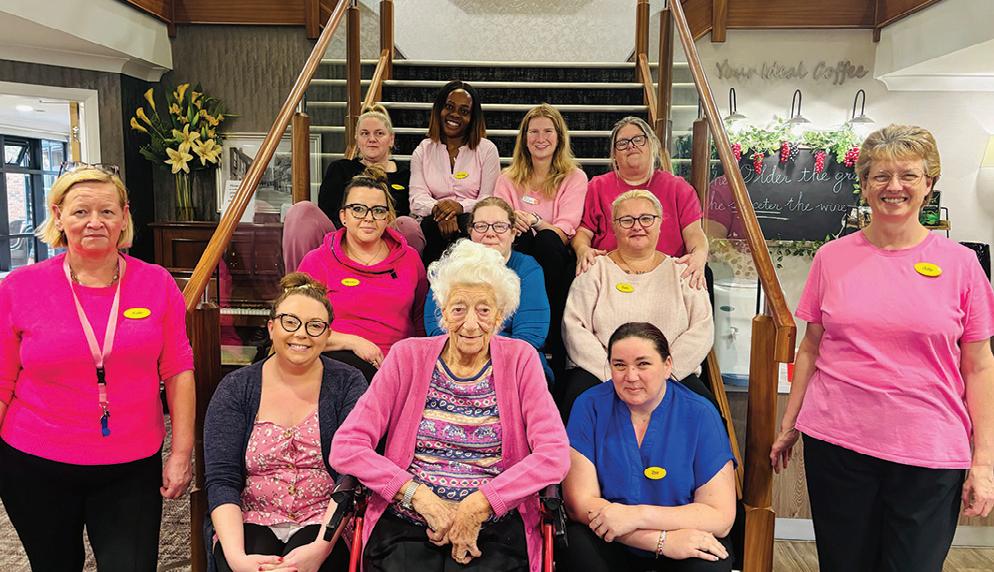
attendees better understand the complexities of dementia. The group offers an opportunity to connect with others facing similar challenges, exchange coping strategies, and build lasting friendships.
Attendees can expect a warm and relaxed environment with tea, cake, and conversation, encouraging meaningful connections and peer support. By attending, participants may also find a friend they can reach out to anytime for a chat, creating a local support network that extends beyond the group.
The Dementia Support Group is open to anyone caring for or affected by dementia, and attendance is free. Whether you are seeking advice, friendship, or simply a listening ear, Fosse Way View Care Home welcomes you to join.
Croner-i was founded in 2017 as a proud part of the Peninsula Group. Since its beginning, it has supported thousands of care providers across the UK to stay compliant with Care Quality Commission (CQC) requirements and wider regulatory obligations, setting a standard in the industry.
Through their Navigate-Care platform, Croner-i specialises in providing practical, accessible and easy-to-understand guidance that enables care services to exceed their compliance responsibilities. From residential care homes, and domiciliary care agencies to supported living providers and other care services, thousands of care providers rely on Croner-i’s resources to maintain quality, safety, and best practice across their operation.

“We understand that compliance can be a challenging and time-consuming process for care providers,” said Andrew Murphy, Head of Content at Croner-i. “Our mission is to take the complexity out of CQC and regulatory requirements, giving providers the clarity and confidence they need to deliver outstanding care.”
With Croner-i’s Navigate-Care platform, care services have access to a comprehensive library of policies,
toolkits, and expert guidance written by industry and care specialists. This includes practical step-by-step advice on preparing for CQC inspections, meeting the new Single Assessment Framework (SAF) and implementing robust quality assurance processes.
Being part of Peninsula Group allows Croner-i to benefit from decades of experience in employment law, HR, and business compliance. This ensures the advice and support given is both legally and operationally practical.
With the care sector under increasing scrutiny and public pressures, Croner-i remains committed to empowering providers with the tools they need most, to operate efficiently, protect service users, achieve inspection success and grow their care service.
Look out for more details from Croner-i in the coming weeks.
For more information about Croner-i Navigate-Care, get in touch with the partnership team at partnerships@croneri.co.uk.
According to data from carehome.co.uk, there are approximately 441,479 people residing in care homes across the UK.
For these individuals, the supported, structured environment of a care facility affords them a degree of independence and autonomy, alongside the medical and professional assistance needed to lead a healthy, safe, and fulfilling life.
Yet care homes are not without risk. Research suggests care home residents are three times more likely to experience a fall compared to those living in their own homes. Fortunately, advancements in technology, engineering, and facility design are actively tackling these risks, increasing the safety for those living in supported environments.
Pinpoint’s P2 alarm system is one of these solutions.
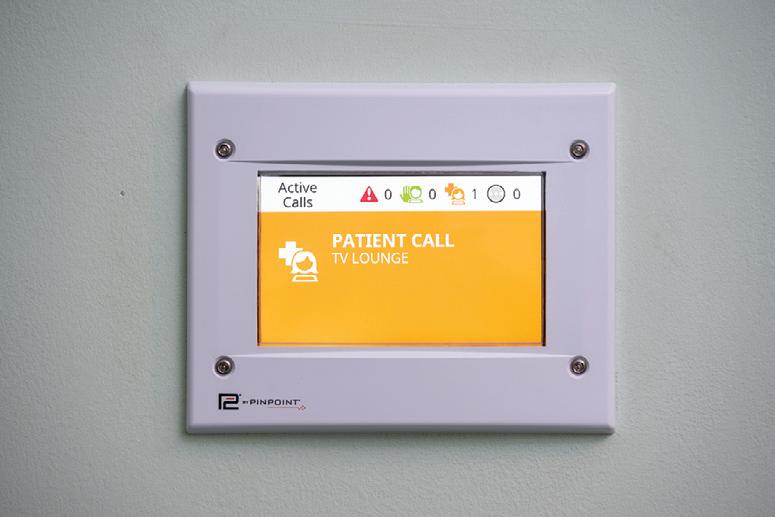
Enabling care home residents to summon professional support instantly, the Pinpoint System establishes a clear line of communication between residents and care staff.
By pressing a button on a Patient Call Button, the user alerts staff members to the need for help and the exact location of an active call. This information, displayed on a staff communication device, elicits an immediate response to deliver the required support.
For individuals more vulnerable to falls or accidents, the Pinpoint System ensures that medical assistance is readily available, offering reassurance to care home residents and their families that help is always at hand and that high-risk incidents are handled efficiently.
On a day-to-day basis, the Patient Call Buttons are used by residents in need of extra assistance, such as when using the bathroom, to get out of bed or to access certain rooms within the facility. In this way, the Pinpoint System gives individuals a greater degree of control over their routine and avoids the need for 1-1 supervision, enhancing their quality of life.
The Pinpoint Patient Call Buttons come in various forms, including Wrist PITs, which are worn on the wrist of the individual, and wall-mounted alarms. Wander Leads of up to 2 metres in length can also be plugged into wallmounted alarms to allow resident with limited mobility to activate the alarm from their bed or armchair.
Biomaster technology provides 24/7 antimicrobial protection for all devices, preventing the spread of bacteria in care facilities, while an Ingress Protection rating of 67 allows Patient Call Buttons to be installed in bathroom and kitchen facilities where residents may be more vulnerable to slipping.
The presence of the Pinpoint System gives care home residents the chance to maintain a level of independence, while being safe in the knowledge that professional assistance can be accessed quickly and easily. This balance between site security and individual autonomy instils residents and their families with confidence that support is always available, and the peace of mind that the wellbeing, safety and health of the individual is the care home’s top priority.
Please see the advert on the facing page or visit www.pinpoint.ltd.uk
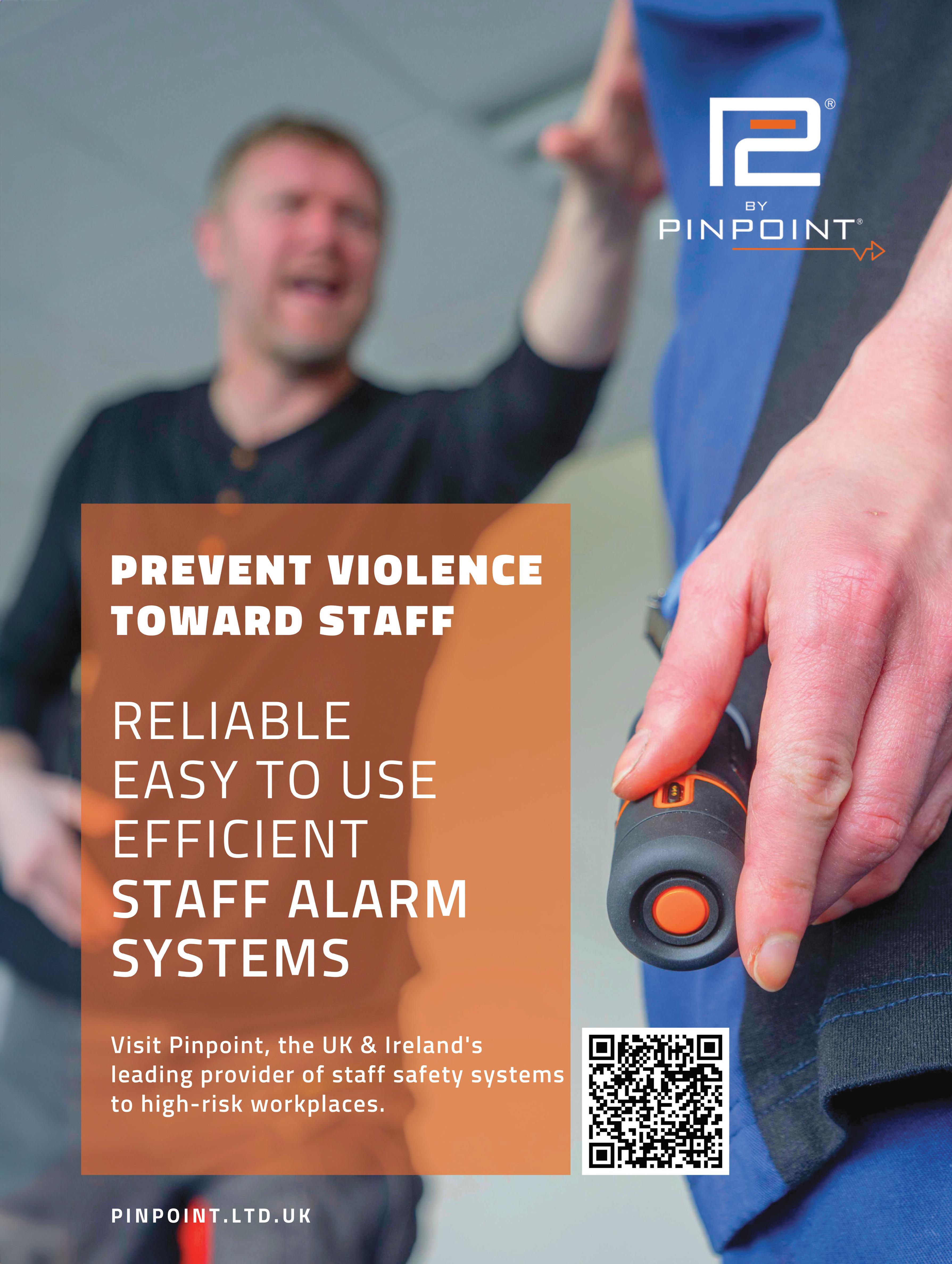
By Nikki Walker - CEO of QCS, an RLDatix Company (www.qcs.co.uk)
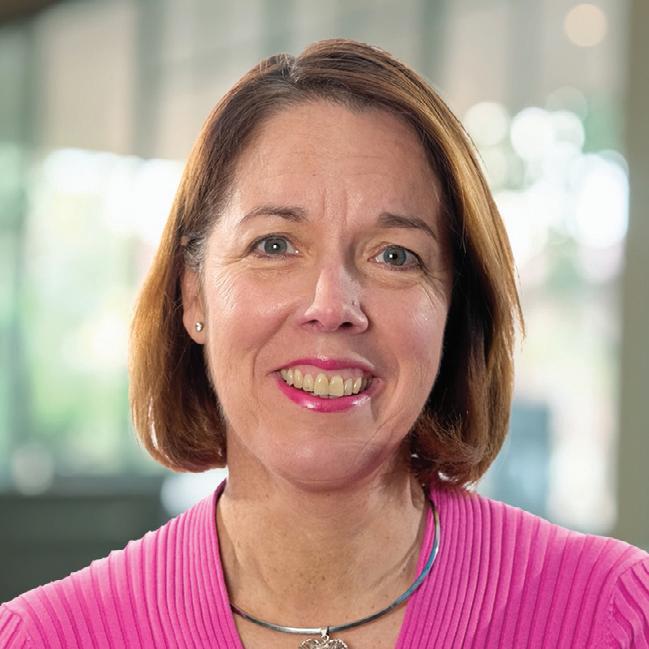
The social care sector stands at a turning point. With rising demand, increasing regulatory scrutiny, and ongoing staffing pressures, providers are being asked to do more, with less. In this environment, the way forward isn’t just about working harder it’s about working smarter.
One of the most transformative shifts on the horizon is the move towards truly integrated care systems: digital platforms that bring together compliance, care planning, risk management, training and quality monitoring in one unified place. More than just a convenience, this integration is fast becoming essential.
Currently, many providers juggle multiple systems or rely on a mix of digital tools and paper-based processes. Information is scattered. Teams duplicate effort. Vital data goes unnoticed. The result? Frustration, inefficiency and risk.
A connected system solves this by creating a single source of truth, where care delivery and compliance are not just stored, but actively linked. Changes in a policy can automatically update associated risk assessments. Notes in a care plan can prompt training needs. Audit trails are clear and accessible. For staff, it means less time on admin. For managers, better visibility. For individuals receiving care, more consistent, safer support.
Adding artificial intelligence (AI) into the mix elevates this even further. AI can help spot patterns in care records, prompt best practice actions and reduce the burden of documentation. Crucially, AI isn’t there to replace human decision-making it’s there to support it. By giving frontline teams real-time, intelligent guidance, it helps ensure nothing is missed and quality remains high.
Of course, technology alone isn’t enough. These systems must be built on deep sector knowledge and shaped by those working in care. Platforms like QCS, for instance, combine expert-backed content with intelligent tools to provide not just data, but insight. It’s this fusion of trusted information and digital innovation that’s beginning to change how care is delivered.
But a connected future is about more than software. It’s a cultural shift towards a care environment that is proactive rather than reactive, where data drives improvement, and where teams feel confident and supported.
In a sector where every moment counts, integrated systems offer more than efficiency, they offer the chance to focus on what matters most: people. When technology works seamlessly in the background, it frees carers to do the deeply human work that technology can’t replicate.
The future of care is not just digital. It’s intelligent. And most importantly, it’s integrated.
To see how QCS are integrating care planning, rostering. audits, mock inspection, surveys, training, compliance, dementia care and more into one integrated system backed by AI technology, follow the link. www.qcs.co.uk/what-we-do/
Residents and colleagues at HC-One’s Rievaulx House, Lydgate Lodge, and Acacia Court care homes in Leeds are delighted to support a special fundraising challenge led by the Leeds United Foundation to mark International Day for Older People.
The Foundation’s Health & Wellbeing Activator, Sophie Dales, has set herself the goal of walking or running 11 kilometres every day for 24 days in October. The challenge is designed to raise funds to purchase activity bags filled with engaging equipment for the 24 care homes the Foundation currently visits,
including Rievaulx House, Lydgate Lodge, and Acacia Court. THESE NUMBERS HAVE A SPECIAL MEANING:
• 11 kilometres reflects the fact that 1 in 11 people in the UK are diagnosed with dementia.
• 24 days represents the 24 care homes in and around Leeds where the Foundation delivers vital sessions to support residents’ health and wellbeing.
The activity bags will enable colleagues and residents at the homes to continue enjoying exercises and activities in between Leeds United Foundation visits, helping older people remain active, connected, and engaged.
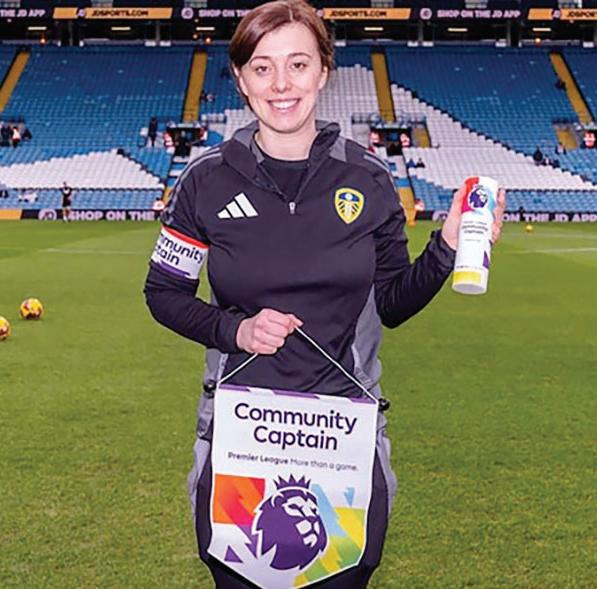

Staff and residents at Barchester’s Elm Bank care home, in Kettering, had a truly special afternoon recently, as they were visited by Michelle’s Petting Party.
The residents and staff at Elm Bank care home transformed a lounge into a mini-farm as they were treated to a visit from Michelle’s Petting Party with a whole host of furry and feathered friends who came to say hello. It was an afternoon of pure, unadulterated joy. Residents and staff’s faces lit up as they took turns in stroking and cuddling the animals. The highlight for many was the hen, who really got everyone talking.
Activities Co-ordinator, Tina said: “The residents and staff thoroughly enjoyed the afternoon, it was not just about fun; it
was a real treat for the resident’s well-being. The gentle act of stroking the animals helped to calm and relax everyone, and the happy atmosphere was really infectious. It was also great as Michelle was able to take the lovely animals and visit residents in the comfort of their rooms so that no one missed out on the fun. Michelle’s Petting Party certainly brought the barnyard to Elm Bank, but more importantly, she brought a whole host of happiness, we cannot wait to have Michelle back to visit us again.”
Our varied life enrichment programme keeps residents active, and provides a daily choice of engaging physical, mental and spiritual activities tailored to residents’ interests and abilities.
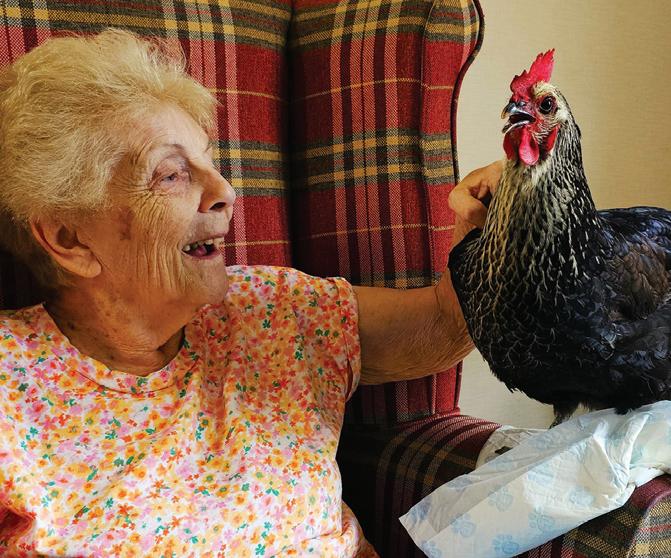
Residents from
and
The residents enjoyed their own private tour of the site and were
and all of the aircraft and vehicles on
After
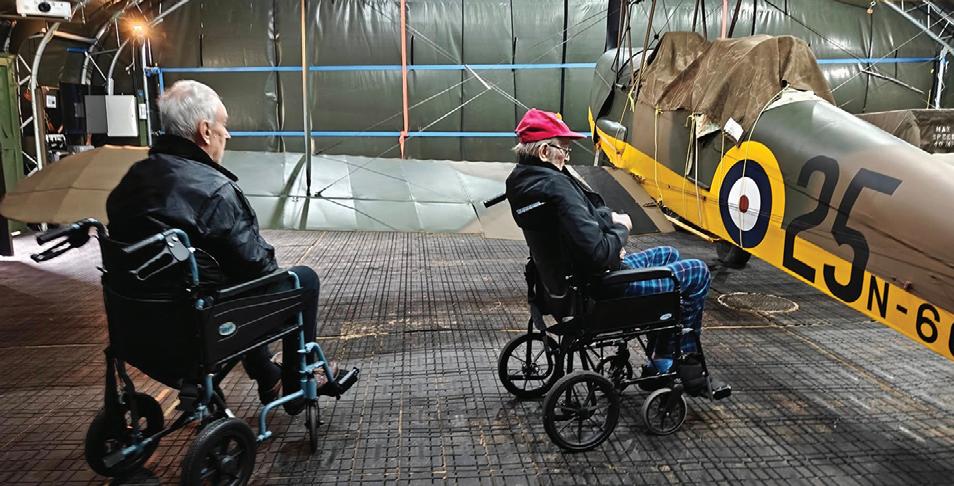
Resident Michael Jarvis was an Army Cadet during his younger years and both Michael and fellow resident David Tickner were fascinated by the displays, especially the Tiger Moth which is currently at the museum on loan from the Duxford Imperial War Museum.
Michael said ‘It was very special to see all of the aircraft and other memorabilia at the museum. It certainly brought back some very special memories. I hope to get the chance to come back again’.
Geanina Tinca, General Manager at Hilton Park care home, said: “It was so nice to be able to take the Michael and David to the Airfield Museum. They all have so many of their own stories and memories and days like today give them the chance to share their stories”.
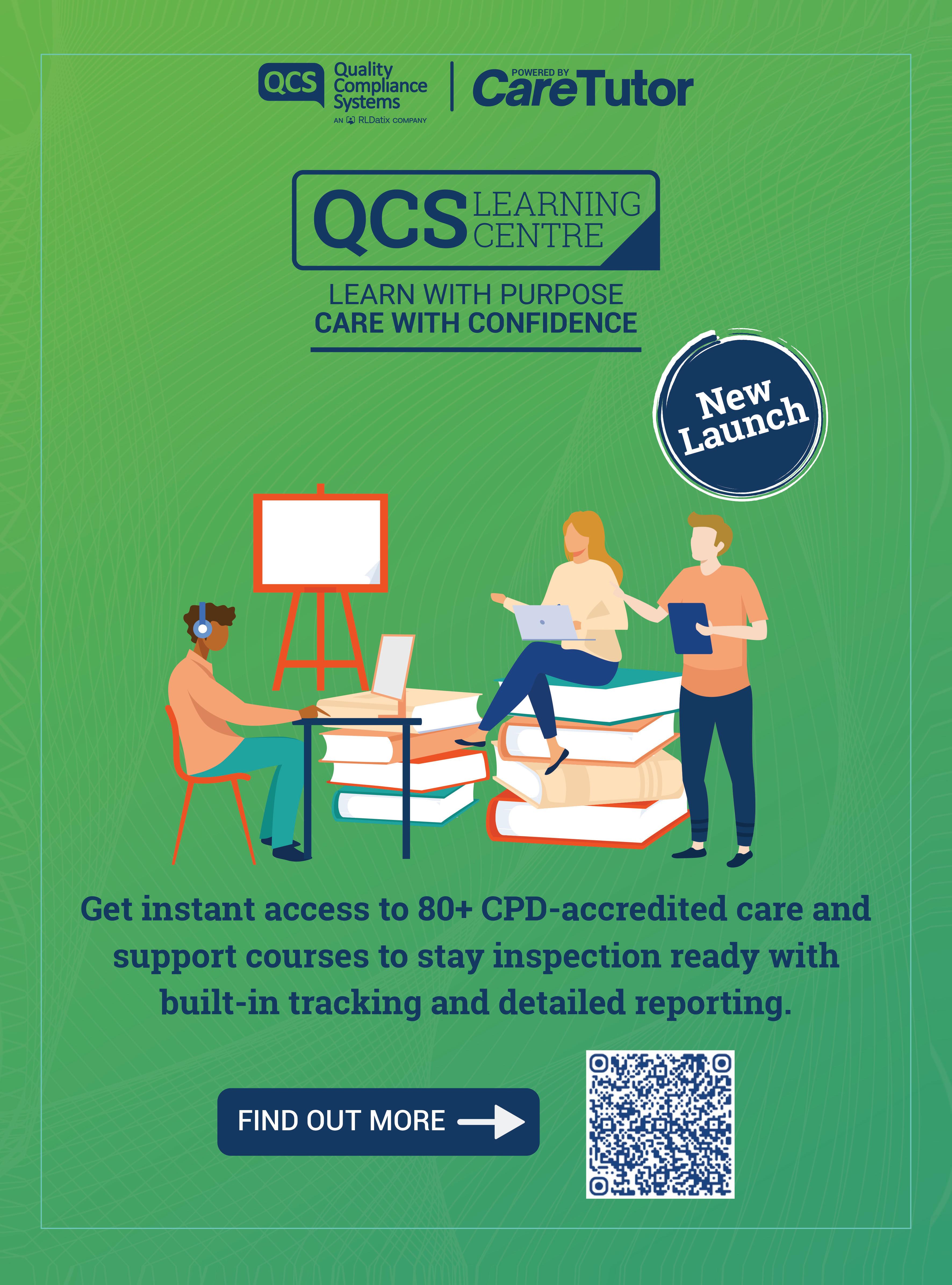
SEE US ON STAND J20 AT THE CARE SHOW
Green Park Nursing Home, based in Greater Sankey, Warrington, recently marked the Festival of Lights with a vibrant and meaningful Diwali celebration, bringing together residents, colleagues, and members of the local community for a day of cultural appreciation, joy and delicious food.
Diwali is an important celebration for many members of the Green Park team, and this year the home took the festivities one step further by inviting a professional cultural workshop provider to lead the event. The workshop offered residents the opportunity to enjoy traditional Bollywood dancing, create their own diyas (decorative clay lamps), and experience the beauty of henna art, all while tucking into traditional dishes.
“This celebration meant a great deal to many of our colleagues, and it was a privilege to share that joy with them,” said Heather, Home Manager. “It was equally heartening to see our residents so engaged and enthusiastic

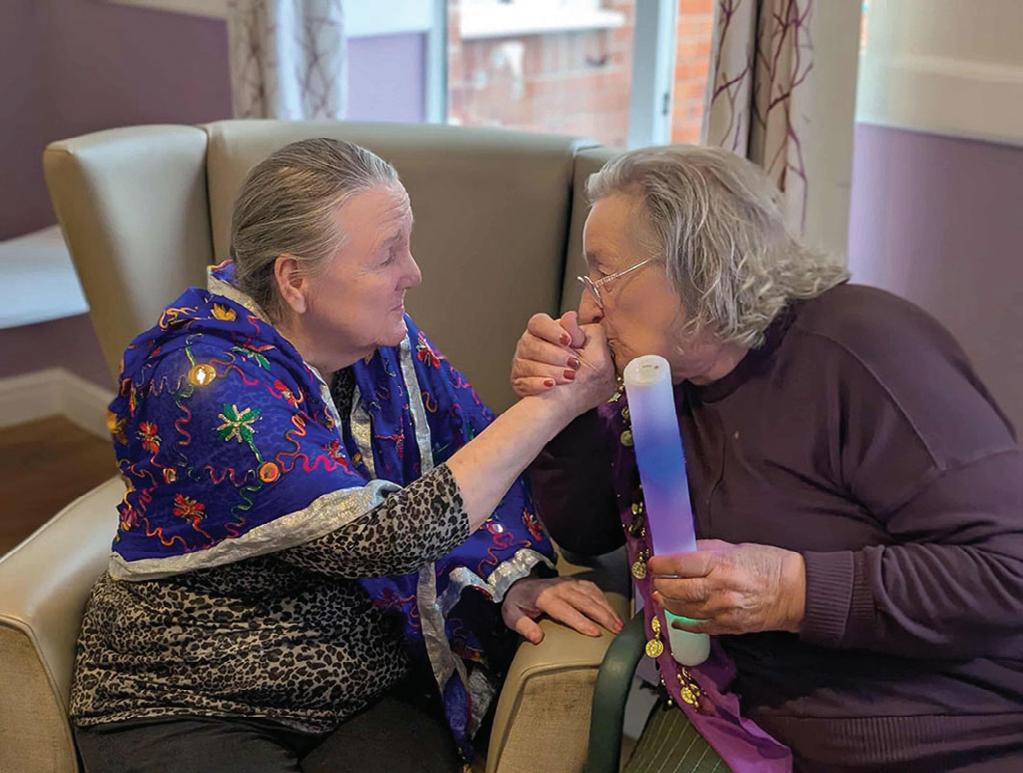
throughout the day. Celebrating Diwali together created a deeper bond between our colleagues and residents, built on mutual respect and cultural understanding.”
The event was inspired in part by the success of a Bollywood-themed performance earlier this year during Green Park’s cruise competition in June, which residents thoroughly enjoyed. Building on that, the team felt a Diwali workshop would offer another uplifting and enriching experience.
Lisa, Activities Coordinator, said: “A huge thank you to Ami Shah and team for coming out to Green Park Nursing Home and putting on such a brilliant Bollywood dancing performance for our lovely residents. We had an absolute blast – everyone loved watching the dancing, trying on the beautiful traditional outfits, and even joining in with a few moves our-

A Black Isle care home resident enjoyed the high life at this weekend's Kirkhill Gala – soaring 160ft into the air in a man basket.
Safely harnessed in a basket provided by Stoddart Crane Hire, daredevil Cress Reid from Eilean Dubh care home in Fortrose was hoisted skywards to enjoy panoramic views of the Black
Isle and Kessock Bridge.
Eilean Dubh Wellbeing coordinator Fiona Stoddart, whose family runs the crane company, said: “The sky was no limit for Cress. He loved every second of the ride and came back down with the biggest smile on his face.”
A talented resident at a not-for-profit Sanctuary Care home in Nunthorpe, Middlesbrough has rekindled her lifelong love of sewing - one stitch at a time. Cherise Chapman, who lives at Nunthorpe Oaks Residential Care Home, learnt to sew at school. Her early career repairing clothes led her to the John Colliers factory in Guisborough, where her passion for sewing flourished. She began making toys, starting with Paddington Bear and later creating Wombles and Dusty Bin characters.
Cherise spent six years trading at Stockton Market, where she built lasting friendships and a loyal customer base. She also made dancewear for her daughter, costumes for a local jazz band and outfits for an amateur dramatics group. After many years away from sewing, Cherise’s passion has been reignited, after a team member brought a sewing machine into Nunthorpe Oaks for crafting. “I was nervous at first,” said 78-year-old Cherise, who was born in Stokesley, North
Yorkshire. “But with encouragement from the team, my confidence grew.
“Sewing gives me purpose,” she shared.
“It makes me feel like I’ve achieved something—especially when I see the final product.”
Since then, Cherise has created a variety of handmade items, including pieces sold at the home’s community fetes. Most recently, she completed a colourful outdoor cushion for a garden project.
Sharon Sperring, the Sanctuary Care home’s manager, said: “At Nunthorpe Oaks, our mission is to ensure all our lovely residents continue to enjoy the things they are passionate about every day.”
Cherise’s story is a wonderful example of Sanctuary Care’s dedication to enriching residents’ lives, supporting them to continue doing things they have always loved to do, giving them a sense of purpose and achievement.”
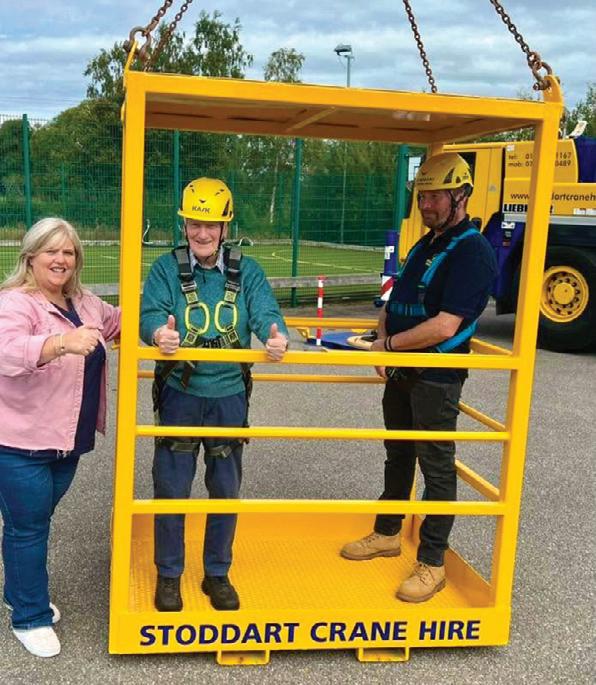
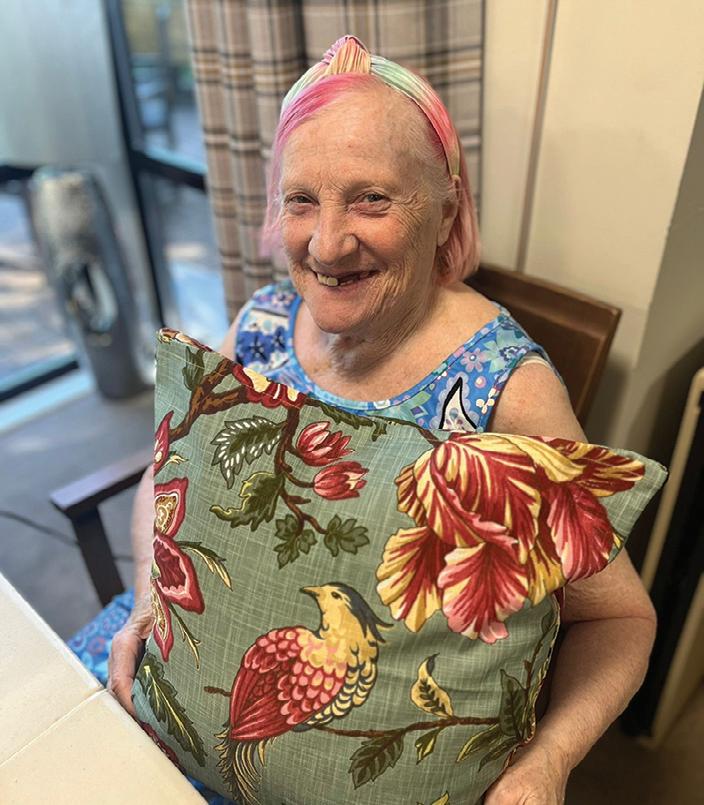

A Woking care home that was previously shut down has been given a new lease of life thanks to CHD Living. The award-winning, family-run care group has stepped in to acquire the former Avens Court site in Pyrford, restoring 41 much-needed care beds to the local community.
The home, which had closed its doors after entering special measures with the Care Quality Commission (CQC), will reopen in Autumn 2025, as Willow Grange Care Home, following an extensive redesign. Working close-
The news has been met with widespread support from local neighbours, who are delighted that the much-loved site will continue to serve the community as a care home.
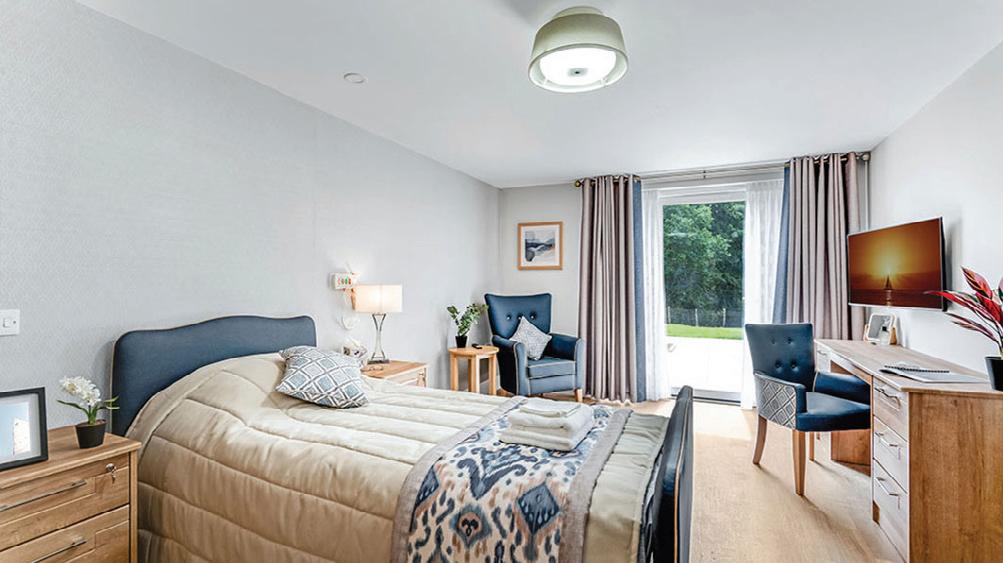
Shaleeza Hasham, Commercial Director at CHD Living, said: “For us, this was about doing the right thing for the community. When a care home closes, it can have a huge impact on local families and on the wider health system. By acquiring and redeveloping the Avens Court site, we’ve been able to restore 41 vital care beds and ensure that this space continues to support the people of Woking.
We’re proud to be
whilst
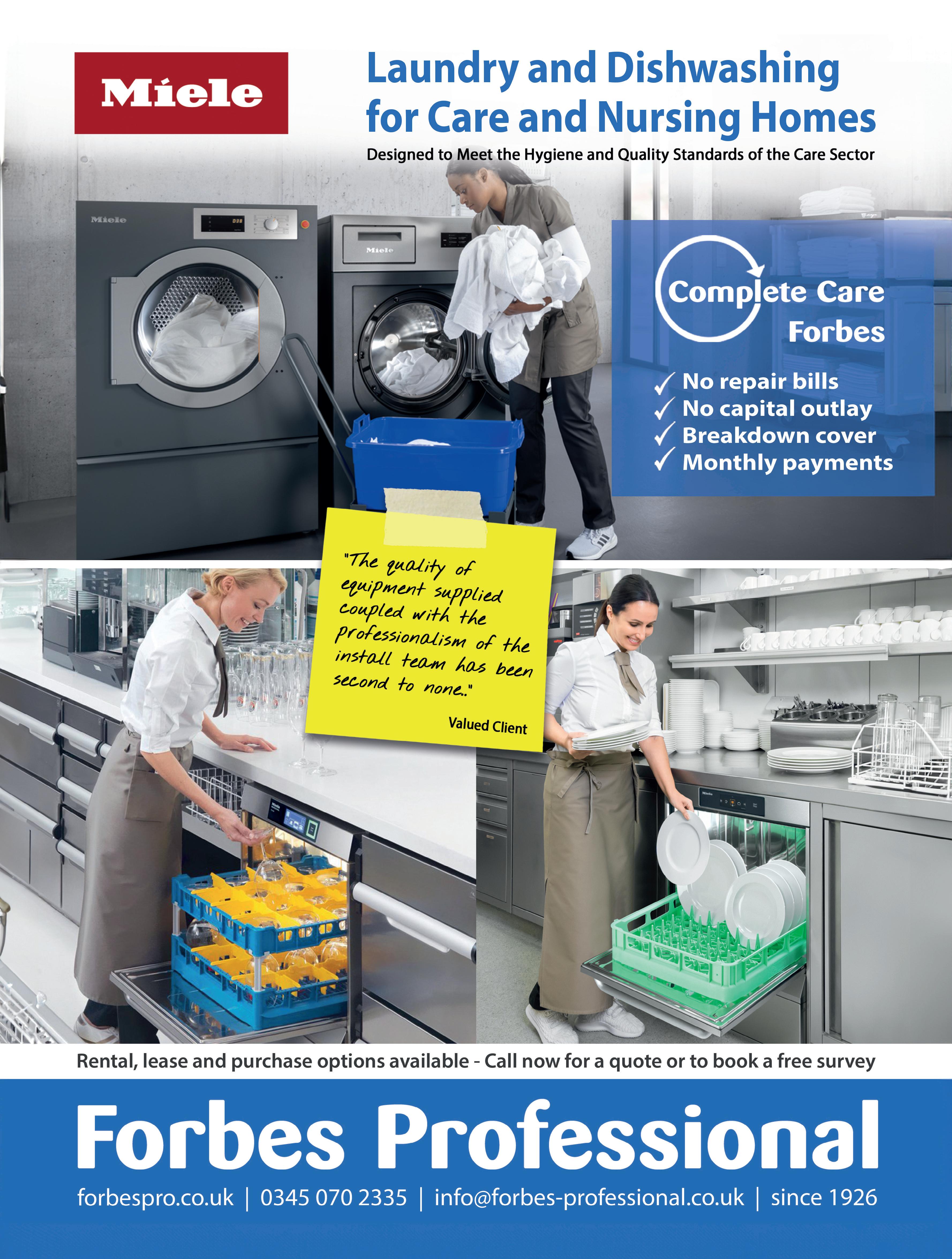
New research commissioned by Digital Care Hub has revealed that “Bring Your Own Device” (BYOD) — where care staff use their own phones or tablets for work — is now widespread across adult social care, yet many staff are unaware of any policy or guidance on how to use their devices safely.
The largest-ever survey on BYOD in adult social care, with 775 respondents (606 managers and 169 staff), found that:
• Half (50%) of care providers surveyed use BYOD approaches, but only half of those have a BYOD policy in place
• Home care has the highest uptake, with 53% of respondents using personal devices
• Smaller organisations are significantly more likely to adopt BYOD
• Cost is the main driver (58% of managers cited this reason)
• 97% of those using BYOD do so through personal mobile phones
• Just 40% of staff using their own devices remember signing any policy or guidance — meaning most are operating without clear rules
• 70% of staff say they would prefer an organisation-provided device.
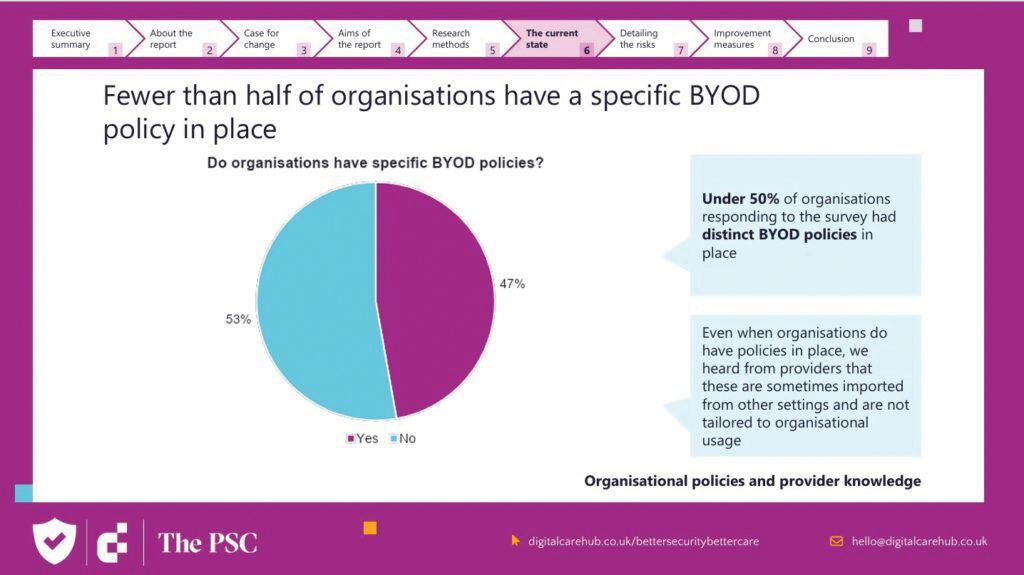
• Staff delivering face-to-face care most likely to use their own device (70%). They also have high levels of access to the data of the people they support.
Despite these gaps, 70% of managers said they believed BYOD poses a “low risk” to their organisation. Interviews found that many data breaches go unrecognised, suggesting the true scale of incidents may be higher than reported.
The research, launched for the Care Show during Cyber Security Awareness Month, uncovered widespread insecure practices, including staff using WhatsApp to share sensitive information, connecting to public Wi-Fi to access care systems, and taking photos on personal devices — all of which could put people’s private data at risk.
Between 2019 and 2024, 211 digital data breaches were reported to the ICO in the social care sector, with 63% caused by human error. While not all relate directly to BYOD, the findings highlight the sector’s vulnerability and the need for clearer policies and controls.
“Bring Your Own Device can seem like a win-win — it saves money and staff get to use the phones they
already have,” said Daniel O’Shaughnessy, Head of Programme
Delivery, Digital Care Hub.
“But the reality is it’s risky if you don’t manage it properly. Many small providers simply can’t afford to give everyone a phone, so we need to help them do BYOD safely, with the right policies, training, and controls in place.”
New support: Data Policy Builder to launch with BYOD policy tool
To help providers tackle these risks, Digital Care Hub is launching a new Data Policy Builder — a free online tool that helps care organisations create tailored data protection policies.
The first policy available will be “Bring Your Own Device (BYOD)”, providing a step-by-step framework to help managers:
Understand and identify risks linked to BYOD;
• Create a custom policy for their organisation;
• Learn about technical solutions like Mobile Device Management (MDM) and secure apps;
• Support staff awareness and training on safe device use.
“Simply banning BYOD isn’t realistic for many care providers,” added Daniel O’Shaughnessy. “Our goal is to help them manage it safely — protecting people’s data, satisfying regulators, and reducing the risk of costly breaches.”
The research has been welcomed by sector leaders, including Dr Jane Townson OBE, Chief Executive Officer of the Homecare Association: “This research highlights a significant challenge for homecare providers. Whilst BYOD has become widespread, often driven by financial necessity, the gap between adoption and proper governance is concerning. When most staff cannot recall signing a policy and seven in ten would prefer an organisation-provided device, we clearly need better support. The research and plans for the new Data Policy Builder are very welcome. We must also address the underlying issue of tight financial margins that prevent providers from investing in secure devices and robust technical controls in the first place.”
The report is available on the Digital Care Hub website
CareZips® Classic are patented, easy dressing unisex adaptive pants designed for older and disabled people suffering with problems associated with continence, mobility, mental function and cognition. Suitable for persons living in care institutions, receiving care at home or living independently at home, CareZips® Classic enable people to dress themselves or with assistance from carers.
CareZips® Classic feature patented 3-zipper system, which opens the front of the pants from the waist to the knees for quicker access during toileting, continence pads changes and personal hygiene. The forward positioning of the two side zippers lessens pressure on sensitive hip areas, helping to eliminate discomfort. The third zipper facilitates simple full frontal opening for faster more dignified diaper changes, catheter adjustments, personal cleansing and hygiene routines.

cal functionality and versatility of the CareZips® Classic, all day comfort and easy garment care.
• People dependent on assisted dressing appreciate quick easy dressing process with less stress, embarrassment and greater dignity offered by CareZips® Classic.
• CareZips® Classic offer practical gains to the carers, helping them to provide better care, whilst reducing physical efforts and saving valuable time.
CareZips® Classic are unisex, available in 6 sizes and 3 practical colours (i.e. black, charcoal and navy). Tapered fit at the ankles gives a tidy appearance. Made from breathable moisture-wicking 4-way stretchy crease-free and easy-care durable fabric, CareZips® Classic are comfortable, practical and conveniently functional.
For more information, contact Win Health Medical Ltd - 01835 864866www.win-health.com
In today’s care sector, where equipment failure can directly impact patient safety and service quality, proactive asset management is non-negotiable. Enter Assetain, Medaco’s pioneering solution designed to manage the complete lifecycle of patient-handling equipment - from first supply to planned obsolescence.

assessments, which are promptly linked to each record. This approach adds both accountability and immediate insight for stakeholders.
CareZips® Classic have many benefits for the older and disabled users and their carers:
• People dressing themselves enjoy the practi-
See the advert on page 3 for further information on Win Health’s product range.
Angloplas are a UK manufacturer who specialise in producing dispensers for the health and hygiene industry. Although these are designed to keep the workplace tidy and uncluttered they are, more importantly, built knowing the control of healthcare-associated infections (HCAIs) are a priority for healthcare providers, and who are employing a combination of infection prevention and control strategies, including hand hygiene, cleaning, training and the adoption of new technologies, to tackle the problem.
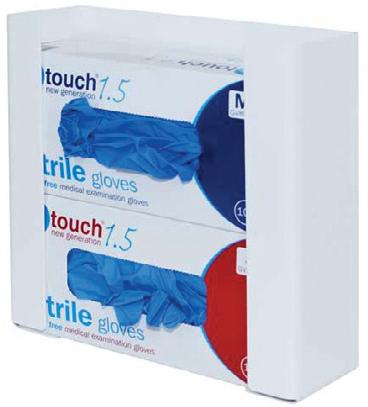
As a result, a wide range of infection control products and technologies are emerging on the market, including antimicrobial technology. Angloplas’ range of dispensers are produced in the world’s first
proven Antimicrobial PVC with silver ion technology and which is exclusive to Angloplas. This helps reduce the risk of cross infection by stopping the growth of bacteria and mould and works continuously for the lifetime of the product, reducing levels of bacteria such as MRSA, E Coli, Legionella, Salmonella and mould by up to 99.99%. For non-clinical environments Angloplas has recently launched its new Budget Range of products which are made to the same exacting standards as the antimicrobial protected ones but with lower price tags. You can order Angloplas products directly from its website at www.angloplas.co.uk See page 17.
Launched in August 2025, Assetain delivers three core benefits: comprehensive asset visibility, budget-wise maintenance, and strategic replacement planning. Rather than reactively repairing faulty devices, care homes, NHS Trusts, and SEND schools can now oversee the health of all moving and handling equipment with confidence and clarity.
At its heart lies a meticulously maintained, datarich register. The programme initiates with a full audit of existing assets; each entry is ported into a dynamic system setting tailored maintenance thresholds, repair-vs-value benchmarks, and clear end-of-life triggers.
Field engineers play an essential role - capturing photographic evidence of faults and functional
Timely alerts are a standout feature. When equipment approaches “no-longer-manufactured” status or reaches its recommended service term, Assetain sends clear notifications - empowering teams to anticipate challenges before they arise. Regular updates of the full asset register ensure stakeholders remain fully informed of the condition and availability of their entire fleet.
Assetain isn’t just maintenance - it’s strategic careasset stewardship that saves time, reduces costs, and safeguards patient well-being. A smart, forwardthinking programme like this helps care providers shift from reactive firefighting to purposeful planning.
In short, Assetain elevates care facility operations into a new era of efficiency and confidence - where every asset is seen, scheduled, and systematically sustained.
www. medaco.co.uk/solutions/assetain/
Consort Claudgen now offers Wi-Fi-enabled low surface temperature heaters that can be controlled through a digital control panel on the heaters or the Consort Connect app. Features include a 7-day timer with 24 daily heating periods, a lock function, open window detection, custom automation, and energy consumption statistics.
Additionally, LST heaters with Wi-Fi and occupancy sensor have a self-learning control ability which uses inbuilt occupancy sensors to detect and learn a

user’s weekly presence in a room. It then creates a heating schedule and automatically warms the room according to the detected or predicted occupancy. When the space is unoccupied, the heater will conserve energy by switching to a setback temperature or frost protection mode. Consort's website also offers BIM objects for download.
See page 17 or 01646 692172 | sales@consortepl.com | www.consortepl.com
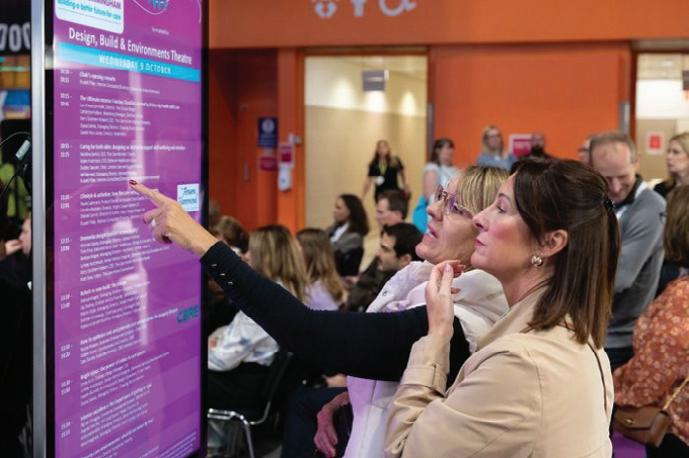
The Care Show Birmingham 2025 once again stood as a beacon of innovation and excellence in the care sector. The twoday event attracted care professionals from across the country, who gathered to explore the latest developments in care delivery, technology, and best practice. Attendees engaged with a comprehensive educational programme covering critical topics including regulatory compliance, design innovations, and care management strategies.
A highlight of this year's show was the third annual Care Show Thirty Under 30 Awards, which recognised 30 exceptional young professionals making significant contributions to the sector.
From care workers who go the extra mile every day, to innovators finding new ways to deliver support, to advocates fighting for a stronger voice for the sector – these 30 individuals show just how much talent and heart the next generation is bringing into care.
Adam Camel, Show Manager, Care Show Birmingham said:
The Care Show Thirty Under 30 awards is one of the highlights of Care Show Birmingham. It’s so inspiring to see the energy and compas-
sion that these young professionals bring to social care. They remind us all why this sector matters so deeply, and it’s a privilege to celebrate their achievements on stage this year.
The Care Show Thirty Under 30 Class of 2025:
Adam Batey, Operations Manager, Dale Care
Amie Elson, Care Manager, Hengoed Park Ltd
Annie Aston, Lead Activities Coordinator, Hengoed Park Ltd
Ayana Mohamed, Director, Standard Care Ltd
Bailey Greetham Clark, Founder, Be Great Fitness
Callum Pearce, General Manager, Oyster Care Homes
Chloe Hart, Deputy Manager, Shores Homecare Ltd
Chris Brown, Registered Manager/Business Development
Manager/Director, Alternative Care Ltd and Auralis Homes
Colby Ebsworth, Senior Support Worker, Ryde House Group
Deanna Murray Wiggins, House Manager, Aspects Care
Dominic North, Client Liaison Manager, Signature Senior Lifestyle
Dr Jade Okene, Operations Director – Service Transformation & Partnerships, Passion Tree Care Services
Gemma Bell, Senior Carer, St Michaels Homes Ltds
Gemma Hebron, Deputy Manager, West Park Care
Grace Evans, Managing Director, Salveo Care Ltd
Isaac Hemper, Home Manager, Ryde House Group
Jasmin Cartwright, Senior Carer, DKL Healthcare Ltd
Jodie Ebsworth, Home Manager, Ryde House Group
Kara Cave, Registered Manager, Unique Senior Care
Katie Bedwin, Clinical Educator, Superior Healthcare
Katie Oerton, Business Manager, Forevermore Care
Katy Hague, Chief of Staff, Oyster Care Homes
Kush Patel, Deputy Manager, Cherrytree Care Home/Kara Healthcare
Olivia Walsh, Branch Manager, Agincare
Rhiannon Corns, Deputy Manager, Lavender Hills Care Home
Sean Gilfillan, Care Coordinator, Unique Senior Care
Sinead Nealon, Pharmacy Manager, Kara Healthcare
Summer Smith, Registered Manager Trinity Homecare Limited
Taylor Turner, Service Lead, Forevermore Care
Zachary Dawson, Operations Director, Bloom Care Solutions
The exhibition floor featured both established sector suppliers and emerging companies, providing attendees with opportunities to discover new solutions and strengthen industry connections.
The event's continued growth and positive reception from delegates reinforces Care Show Birmingham's position as an essential fixture in the care sector calendar. Organisers have confirmed plans to build on this year's success when the show returns in 2026.Show Manager, Adam Camel, commented after the event:
“Care Show Birmingham was an all-around success this year, with stellar feedback from the visitors and exhibitors alike - I could not be prouder of the Care Show team for putting together another fantastic show. It's wonderful seeing the entire care community come together year after year in such a joyous and celebratory fashion. I can't wait to do it again next year!”

Introducing Access Smart Notes for Care Planning.
We’re excited to introduce the upcoming release of Access Smart Notes - A new AIpowered tool designed to reduce admin, saving time and money for care providers like you.
Smart Notes helps you create accurate, detailed notes, using AI to write up forms in moments and and deliver them directly into Access Care Planning. That means less time writing, and more time with the people who matter most.
Access Smart Notes key features and benefits:
• Save thousands of pounds every year on Care Assessments without a drop in quality.
• Capture detailed notes quickly and efficiently in the moment.
• Reduce errors and missed details with templates customised to your service
• Integrated with Access Care Planning for real-time updates saving hours of admin time.
• Built-in AI accuracy to streamline the documentation process to reduce risks and improve the quality of your notes
• Full audit trail for peace of mind and transparency Visit www.theaccessgroup.com

Since 2008, Satellite Finance has been a trusted commercial finance broker specialising in funding solutions for care homes and healthcare providers. Based in Newport, Wales, Satellite Finance has a range of tailored business finance services from asset finance, business loans, and mortgage funding to support care home acquisitions, refurbishments, and equipment purchases.
If you’re looking for Asset Finance to help grow your business, new equipment is a must. Satellite Finance can help you to get all the equipment you need, without making large dents to your cashflow. With Asset Finance you don’t have to pay for everything upfront, you can spread the cost of your equipment over the period of time its expected to be used for which can be from 12-72

months, allowing you to spend more money on higher standard equipment without feeling the economic pinch.
Perhaps you’re looking for a loan for a new building, or to make a refurbishment in a care home or surgery? Satellite Finance works with you to choose the best loan for your project. Choose from either a Business, Professional, Personal, or Corporate & VAT loan, and because Satellite Finance has access to over 40 specialist lenders that have facilitated over £100 million in funding for more than 4,500 clients, you know you’re in good hands.
For a Mortgage Loan, Satellite Finance can help you to request a loan for anything between £50,000 – £40 million. With rates starting from just 2.25% above Bank of England base rate, your repayment period
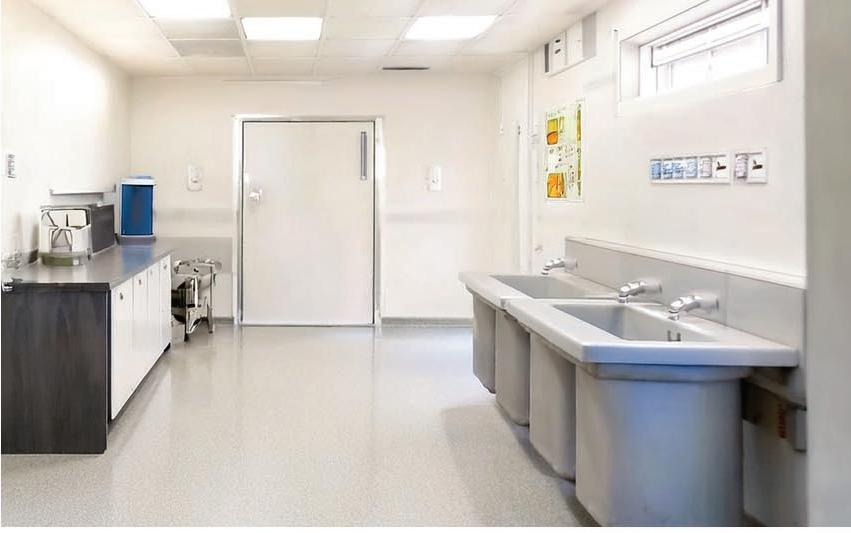



can be anywhere between 5 and 30 years. Unlike other finance companies, Satellite Finance’s terms won’t feel like a burden, as they’re both competitive and flexible, ensuring you get an arrangement that is affordable and convenient for you. Having close relationships with over 40 high street banks, challenger banks, and regional lenders all over the UK, Satellite Finance is experienced and up to date with the best lenders who offer the best rates to the healthcare sector.
Every day, care organisations are working tirelessly to deliver essential support in the face of growing needs and rising costs. However, too many providers are stuck balancing tight budgets, having ‘just enough’ to stay afloat. The hard truth is, just enough isn’t enough—not for the providers, not for the employees, and certainly not for the clients who depend on them.
Rising operational costs—from wages and the Fair Pay Agreement to energy bills—compound historic underfunding and financial pressures. And demand for care continues to increase, creating a widening gap that organisations are often forced to fill with limited resources.
Providers then end up in survival mode, unable to invest in improving their services for today and the future.
THE NEED TO RETHINK FINANCIAL STABILITY
Care providers need to have healthy finances in social care, and that doesn’t come at odds with delivering compassionate care.
A financially strong organisation has the breathing room to improve services, retain employees, and innovate to make a meaningful difference to the lives of people they support. And having this financial security means providers can actually plan for the future rather than constantly reacting to the present.
BENEATH THE SURFACE
Social care organisations face a web of financial intricacies. Local authority
Fran
discusses how financial pressures continue to challenge social care providers.

support often comes with layers of red tape. Managing aged debt and resolving invoicing errors take a significant amount of time that few organisations can spare. Regulation and compliance require meticulous reporting, and the sheer volume of admin work to manage all these leaves teams stretched thin. At the same time, there’s an expectation for providers to keep doing more. But without the right tools and systems in place, these compounded financial struggles threaten to overwhelm this indispensable sector.
Social care providers aren’t just keeping their organisations alive; they’re safeguarding the wellbeing of countless individuals and families.
Providers need to be able to prioritise long-term financial resilience. And part of this means having the tools—including robust financial management softwaresimplify manual processes, optimise resources, and reduce inefficiencies.
By championing financial sustainability, we’re creating conditions where employees can thrive, where clients receive the quality of care they deserve, and where the sector can confidently meet future challenges.
Find out more at: www.oneadvanced.com/ai
See the advert on the facing page.
We were excited to be heading to the Care Show in Birmingham on 8–9 October bringing something brand new with us.
At this year’s event, we launched the Data Policy Builder, a powerful new tool designed to make data protection policies simple, practical, and meaningful for your organisation. Too often, policies sit on a shelf, written in complex language that no one reads. The Data Policy Builder helps you create living documents that reflect your service, speak to your staff, and actually shape day-to-day practice.
By guiding you step by step through the process, the tool ensures your policies are DSPT-compliant and tailored to your unique risks and needs. Whether you run a single care home, a homecare service, or a larger group, this tool will help you write policies that your team can understand and use – supporting safer care and better data security. LIVE DEMO – DATA POLICY BUILDER

The Care Show offered a first look at the Data Policy Builder in our live demo session. We’ll be focusing
on Bring Your Own Device (BYOD) policies, an area many care providers struggle with. You’ll learn:
• The risks of staff using personal devices for work
• What should be included in a robust BYOD policy
• How the tool can generate a clear, easy-to-read document for you – in minutes We’ll also be sharing which other policies we’ll be adding to the tool in the future, so you can start planning ahead.
DROP-IN HUB – YOUR QUESTIONS ANSWERED
Throughout the Care Show, the Digital Care Hub team ran a drop-in hub where you could ask all your questions about digital technology, data protection, and cyber security. Whether you need help with the Data Security and Protection Toolkit (DSPT), want advice on cyber security risks, or just want to sense-check your approach to data sharing, we’ll be there to support you.
For further information, please see the advert below.





Sensore launches a smart pressure ulcer prevention system, a breakthrough technology combining a smart fabric sensor mat with an intuitive app and powerful AI analytics.
Today’s best practice is reactive: manual checks and frequent repositioning. Sensore flips the model - continuously monitoring pressure distribution in real-time and providing simple preventative alerts, so users stay protected while easing the daily vigilance demand on users and carers.
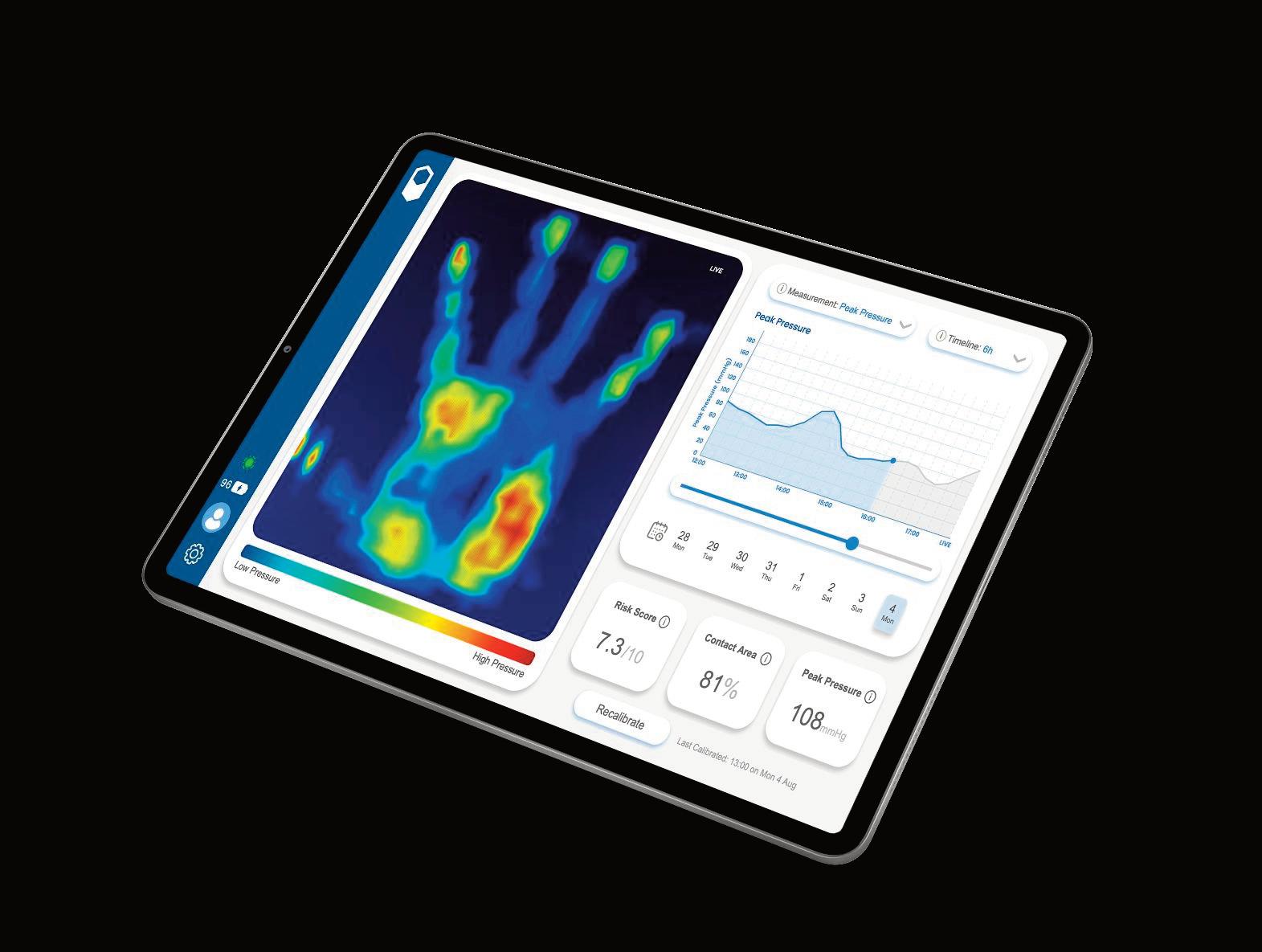
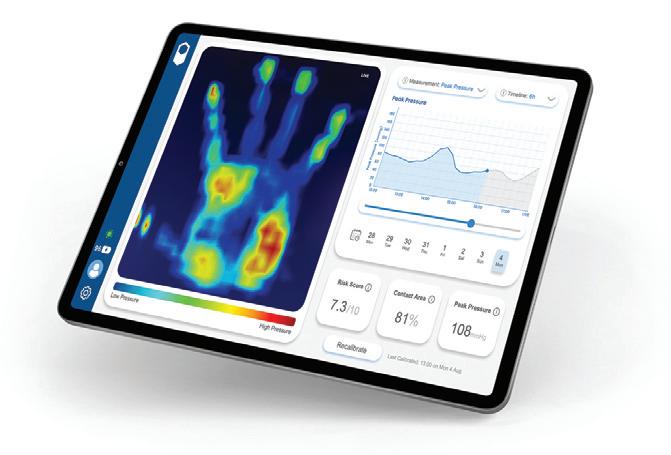
A personal early-warning system that integrates seamlessly into any wheelchair or bed, Sensore is built for elegant simplicity - restoring peace of mind for wheelchair users and supporting higher-quality, more
consistent care. For care providers, Sensore can help standardise prevention workflows and contribute to meaningful cost savings, while building a unique dataset to advance pressure-injury research.
Sensore is supported by clinical experts: "We believe Sensore’s continuous pressure monitoring will have a transformational impact on our ability to prevent and manage pressure ulcers effectively, while driving measurable improvements in patient care quality" - NHS Consultant Clinical Scientist Specialist in Clinical Biomedical Engineering
Visit www.sensore.health for more information, to sign up for early access and book a free demo.
For over 60 years, Fowler UK has been proud to support the care sector with dependable commercial laundry and catering equipment, backed by expert service that puts people first. As a family-run business, we understand the pressures care providers face, and we’re committed to delivering solutions that keep vital operations running smoothly.

From supply and installation of equipment, ongoing servicing and repairs, detergent packages, right through to our in-house CAD design team, we offer a ‘one-stop-shop’ solution for all of our clients laundry and kitchen facilities.
Reliability and customer service the heart of what we do. Our fast response times and high first-time fix rate mean care providers can trust us to minimise downtime and keep essential services running without interruption. By stocking a vast range of manufacturer parts on our vans and in-house, we’re able to resolve issues quickly and effectively.
“Supporting the care sector has always been central to our business,” said William Fowler, Director at Fowler UK. “We know how important reliable equipment is for both residents and staff, and we’re proud to play our part in helping care homes provide safe, efficient, and welcoming environments.”
With a proven track record, family values, and a commitment to service, Fowler UK remains a trusted partner for care providers nationwide.
We’d be delighted to discuss how Fowler UK can support your facility. Visit our stand - G02 at The Care Show, NEC, on 8–9 October, or contact our team today to find out more.
Beyond equipment sales, we support care facilities with comprehensive compliance and maintenance services such as gas safety inspections, preventative maintenance visits, duct cleaning and kitchen deep cleaning. This all-in-one approach provides peace of mind for our customers, ensuring they can focus on delivering high standards of care while we take care of the rest.

Each year Skopos launch new fabric collections, developed specifically with Care interiors in mind. Specialists in key attributes which help keep homes looking fresh and stylish (soil resist, antimicrobial) interior schemes can easily be pulled together using a mixture of prints, textures and plains. Leading the way at this year’s show, Skopos will be highlighting their new range of printed designs, from the Skopos STUDIO. Available on basecloths for upholstery, bedding and curtains, the fabric choices have grown, to include a waterproof and antimicrobial velvet upholstery and a textured woven upholstery. Designs from the STUDIO are split into different categories, including stripes, florals, geometric and textures.
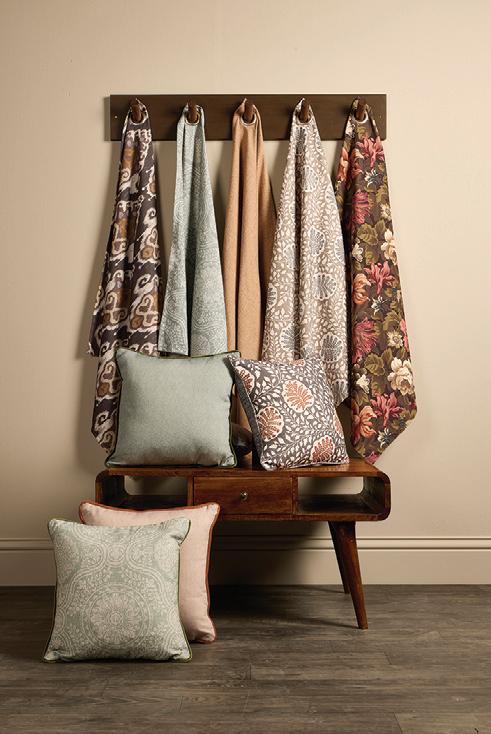
Skopos can offer a fabric-only service or a full service; with site measure, product manufacture and installation. The Skopos team produce
approximately 25,000 made-up items each year, including bedthrows, cushions and pairs of curtains, all manufactured by a highly-skilled team of machinists, cutters and pattern makers; items that are delivered and installed into different contract environments.
As with all Skopos prints, the lead-times are under one week and everything is produced locally, in Yorkshire.
Skopos also offers a Bespoke design service, for statement interiors that require something different. Our design team will work alongside you to develop ideas which can make your caring interior personal, branded and unique. For samples of any of our collections visit www.skoposfabrics.com
PASS by everyLIFE Technologies, UK and Ireland’s leading digital care management platform, will be showcasing its award-winning software at this year’s Care Show in Birmingham.

Used by over 1,200 services and supporting more than 85,000 care professionals every day, PASS brings care planning, medication management, rostering and finance together in one simple system. The platform helps providers save time, reduce risk, and improve compliance - giving care teams more time to focus on the people they support.
Visitors to the Care Show will also be able to see PASSgenius™, the suite of AI-powered insights now
built directly into the platform. PASSgenius™ analyses care notes and rostering data to highlight risks, changes, and trends that may otherwise be missed. From punctuality dashboards to health note summaries, it turns everyday information into clear, actionable insight. Robin Batchelor, CEO at everyLIFE Technologies, said: “The Care Show is always a fantastic opportunity to meet providers, share ideas, and demonstrate how digital tools can make a real difference to quality of care.” For more information, visit www.everylifetechnologies.com.





The NHS Long Term Plan is reshaping healthcare to make it more personal, preventative, and accessible. At the heart of this transformation are three strategic shifts: delivering more care in the community, embracing digital solutions, and focusing on prevention rather than treatment. For patients and carers, these changes mean more support at home, fewer hospital visits, and better tools to manage health.
One innovation helping to make this vision a reality is Evondos—an automated medication dispensing service and virtual care platform designed to support safe, timely, and consistent medicine use at home.
SUPPORTING INDEPENDENCE AND SAFETY
Evondos Anna Medicine Dispensing Robot is installed in the patient’s home and dispenses pre-packed doses at the right time. It provides spoken instructions and visual cues, making it easy to use for people of different ages and abilities. If a dose is missed, the medication is stored safely and securely inside the device until a carer or healthcare professional can follow up. This is especially important for patients with time-sensitive or multi-dose medication schedules, such as those managing diabetes, Parkinson’s, or heart conditions. Evondos ensures that every dose is delivered as prescribed, helping prevent complications and hospital admissions.
PEACE OF MIND FOR CARERS
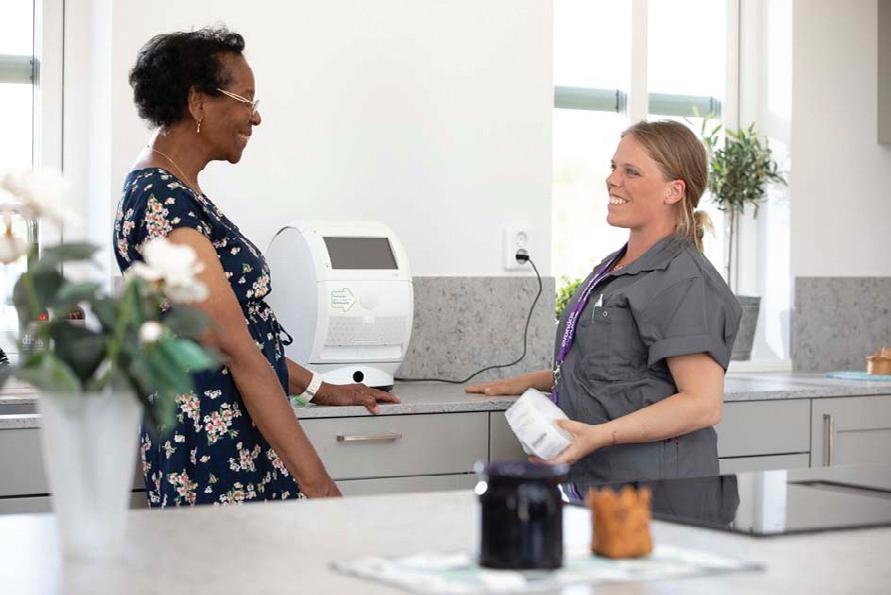
For carers—whether family members or professionals—Evondos offers reassurance. You don’t need to be present for every dose, and you’ll be notified if a dose is missed. This reduces stress and allows carers to focus on other aspects of support, knowing that medication is being managed reliably.
Evondos also supports virtual care through its built-in two-way video camera, allowing care professionals to check in with patients remotely. This adds a personal touch to digital care and helps maintain strong relationships between patients and their carers.

Care home residents, new staff and visitors can all benefit from clear way-finding signage, which is why the Care Quality Commission places great importance on a well thought out signage scheme – especially where memory care needs demand specialist input. Add the need to reflect a group's branding objectives whilst working within interior design guidelines, and the challenge for managers tasked with sourcing signage is knowing who to call.
With nationwide coverage, Taylor and Pickles have a reputation for well thought out signage schemes which effectively and discreetly direct people around care homes for many of the UK’s leading care providers.
Starting with a client’s briefing, Taylor and Pickles carry out a comprehensive site survey and develop
Evondos includes a built-in roaming cellular SIM card, which means it connects automatically—no home internet or technical setup is required. Patients don’t need to understand or manage any digital connectivity. This makes Evondos accessible to everyone, including those who are not confident with technology or live in areas with limited digital infrastructure.
TRAVEL MODE FOR FLEXIBILITY
Evondos also includes a travel mode, allowing patients to take their medication with them when away from home—whether visiting family, going on holiday, or staying in respite care. This keeps routines consistent and supports independence, even when life changes temporarily.
EQUALITY
Evondos is built with equality at its core. Its intuitive design, secure medication handling, automatic connectivity, and virtual care features make it accessible to people from all backgrounds. Whether you’re living alone, supported by carers, or part of a busy household, Evondos fits into your life and helps you stay well.
Evondos supports the NHS’s three strategic shifts by delivering smarter, safer, and more accessible care. For patients, it means more independence and better health. For carers, it means peace of mind and less pressure. With support for complex medication schedules, secure storage, travel flexibility, virtual care, and no need for internet knowledge, Evondos is helping bring the future of healthcare into everyday life.
If you or someone you care for could benefit from help with medication, speak to your local care team about Evondos. It’s a powerful solution designed with real people in mind.
See the advert on the facing page for details.
detailed design proposals. Often working with a client’s interior designers, the team at Taylor and Pickles create options for bespoke signs which provide clear directions and are sympathetic to the client’s creative concepts. This custom approach prevents signs looking out of place, or like “off the shelf” stock items.
Of course, there are times when greater visual contrast is essential. Residents with memory care needs require a bold and sometimes bright scheme which might seem heavy handed elsewhere. When the special needs of these residents are added to the brief, clients can be confident that Taylor and Pickles’s approach, guided by leading academics and their experience of helping many homes through the Care Quality Commission signage inspection process, will pay off. Often a multi-tiered approach allows signs across different zones in a development to have a cohesive look yet serve differing care needs.
Taylor & Pickles also recognise a client’s commercial needs. Timely, unobtrusive surveys – effective design and tidy installation by in-house teams make Taylor and Pickles the chosen signmaker for many of the UK’s leading care home groups.
See the advert below for details.
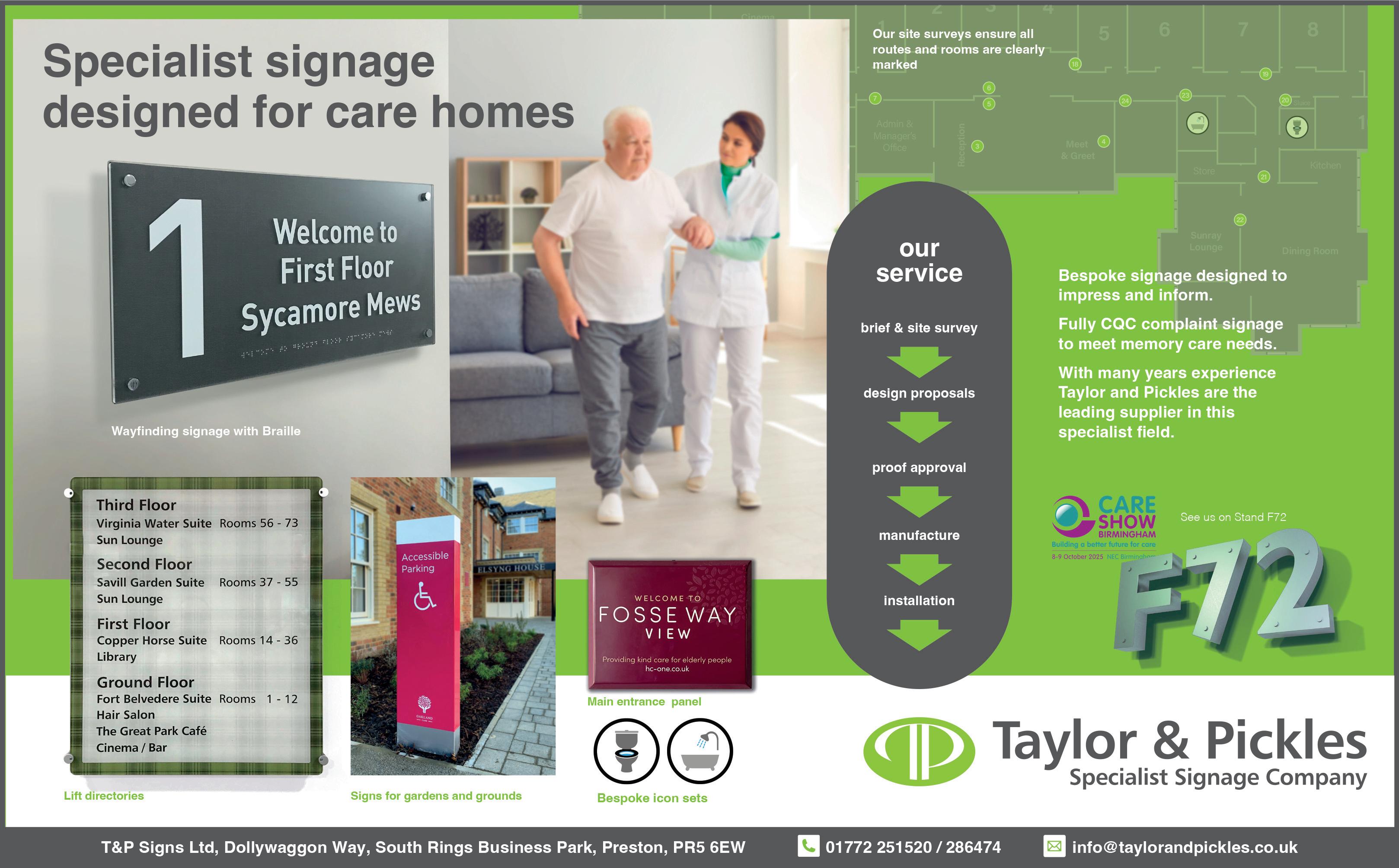
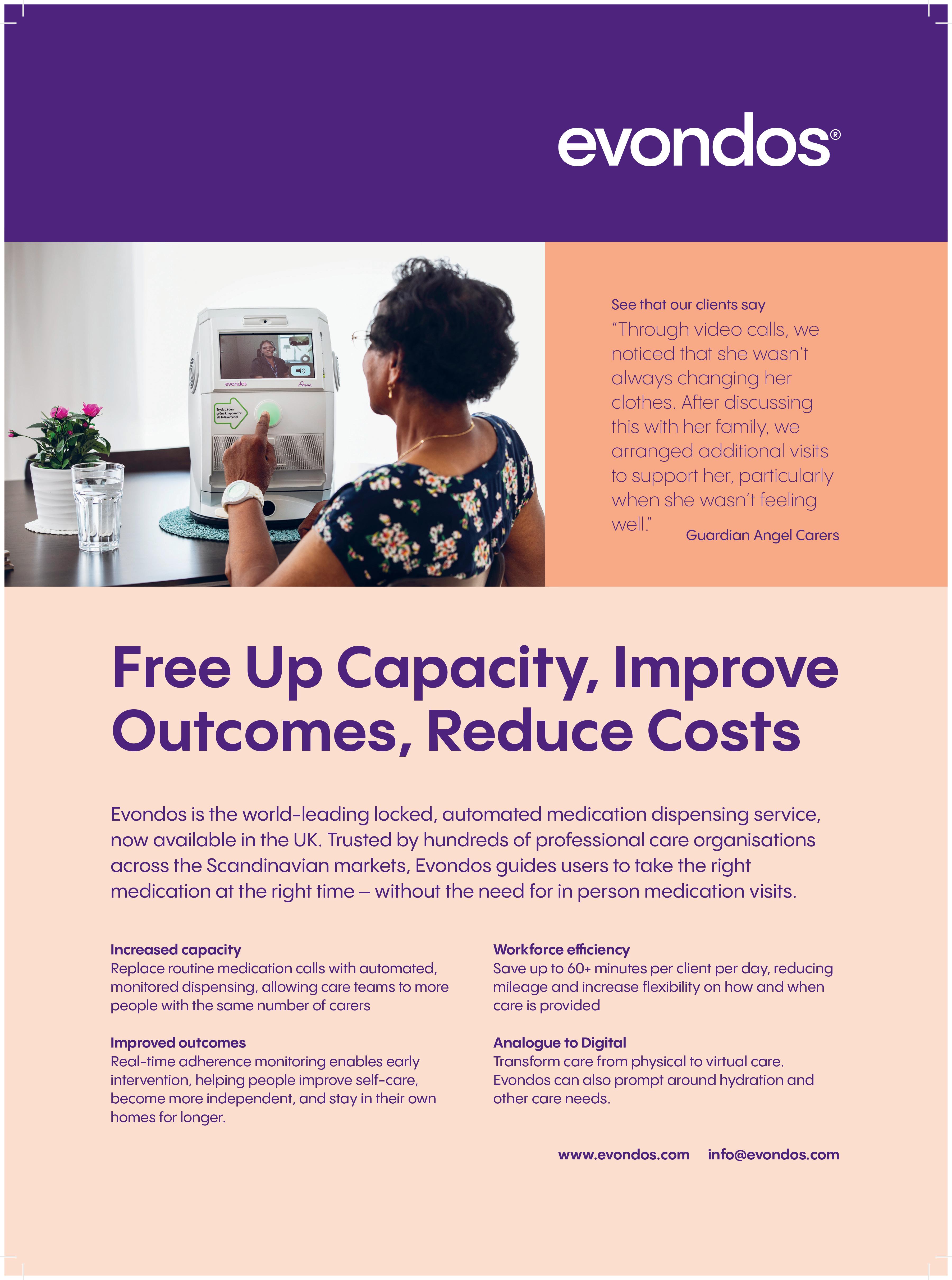
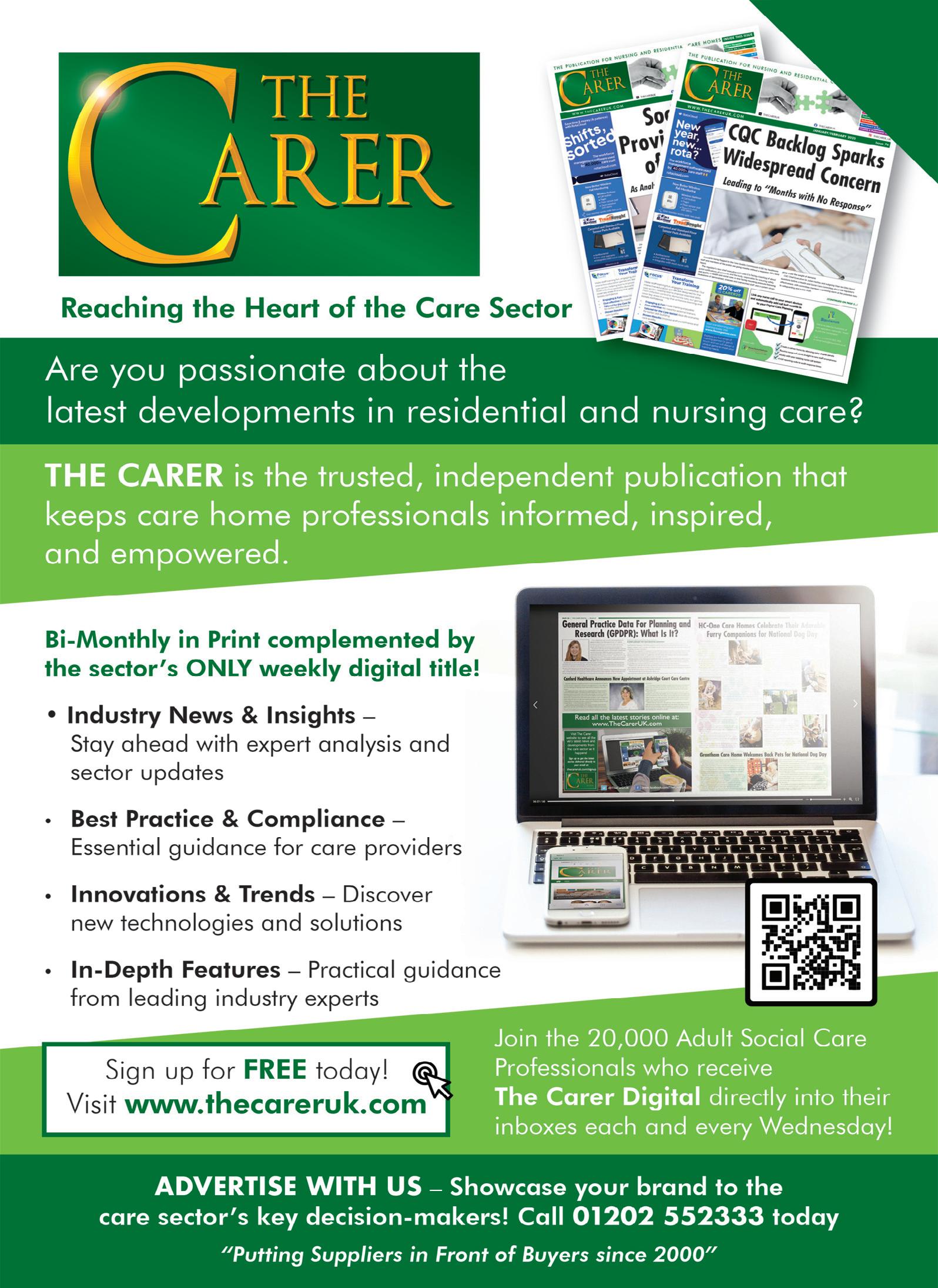

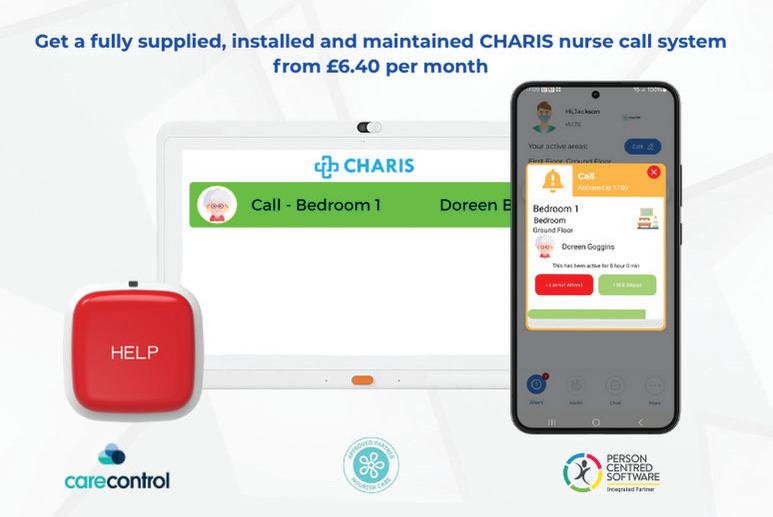



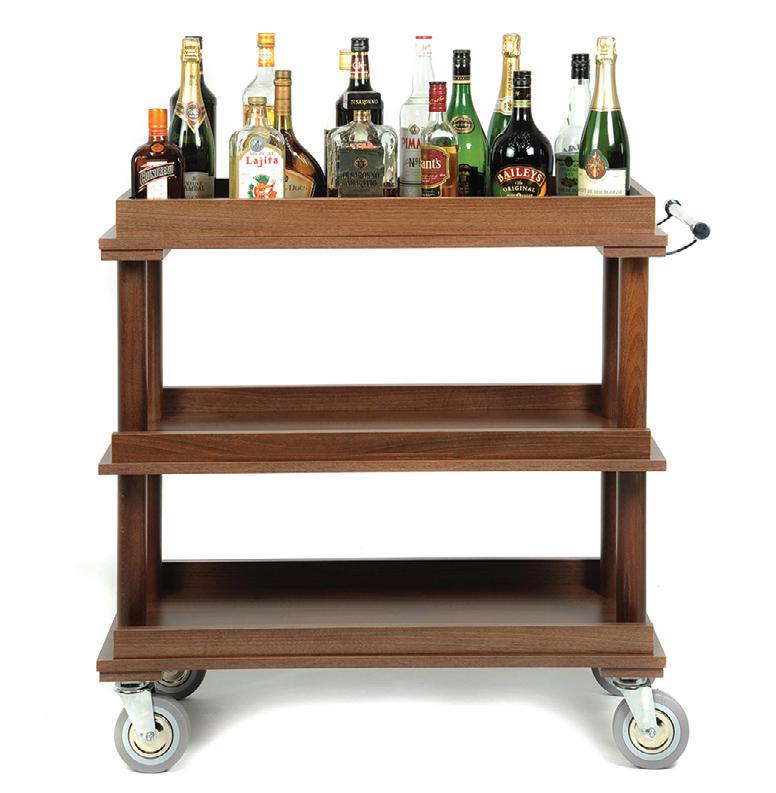
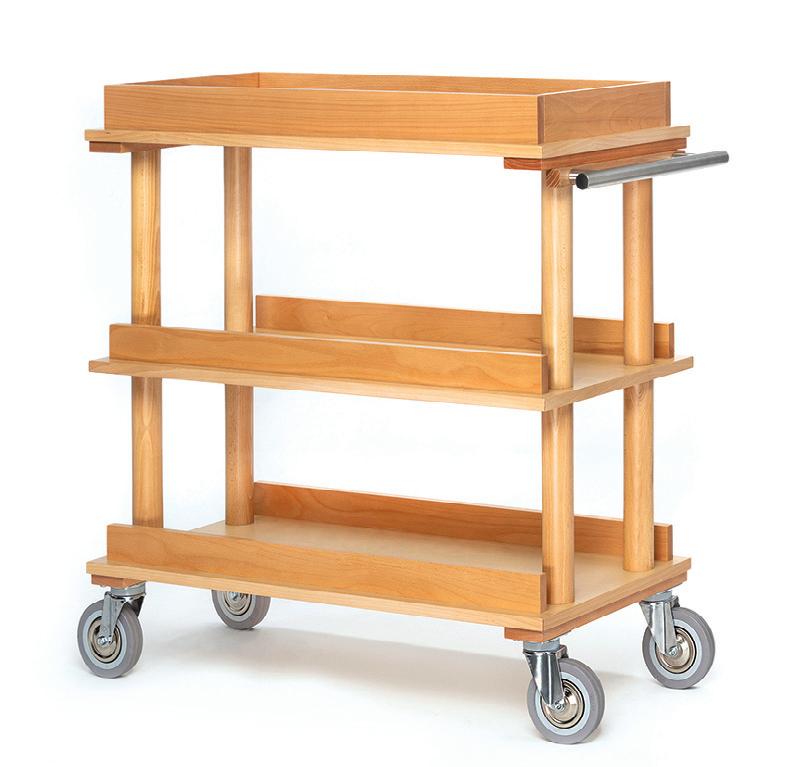
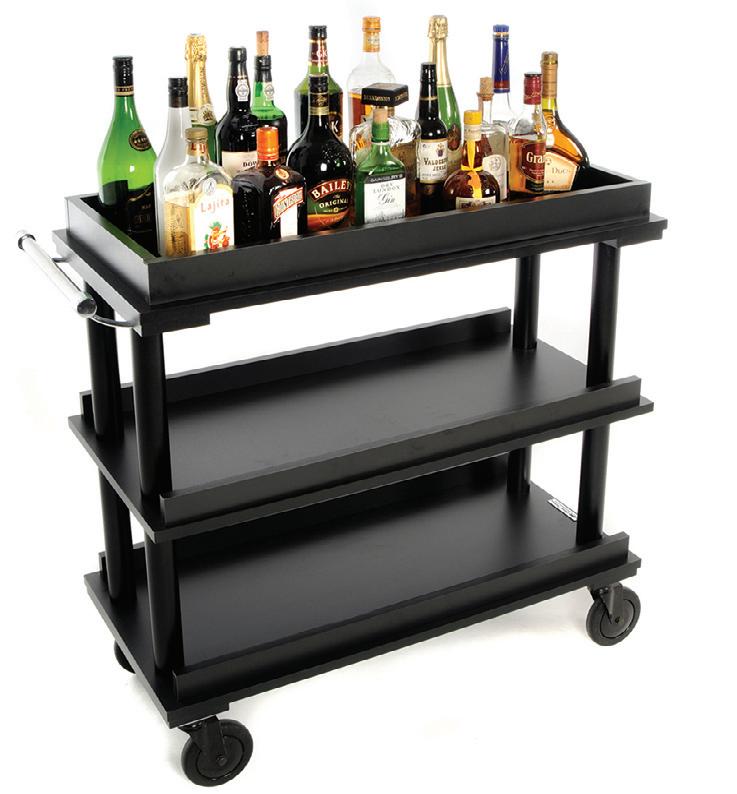
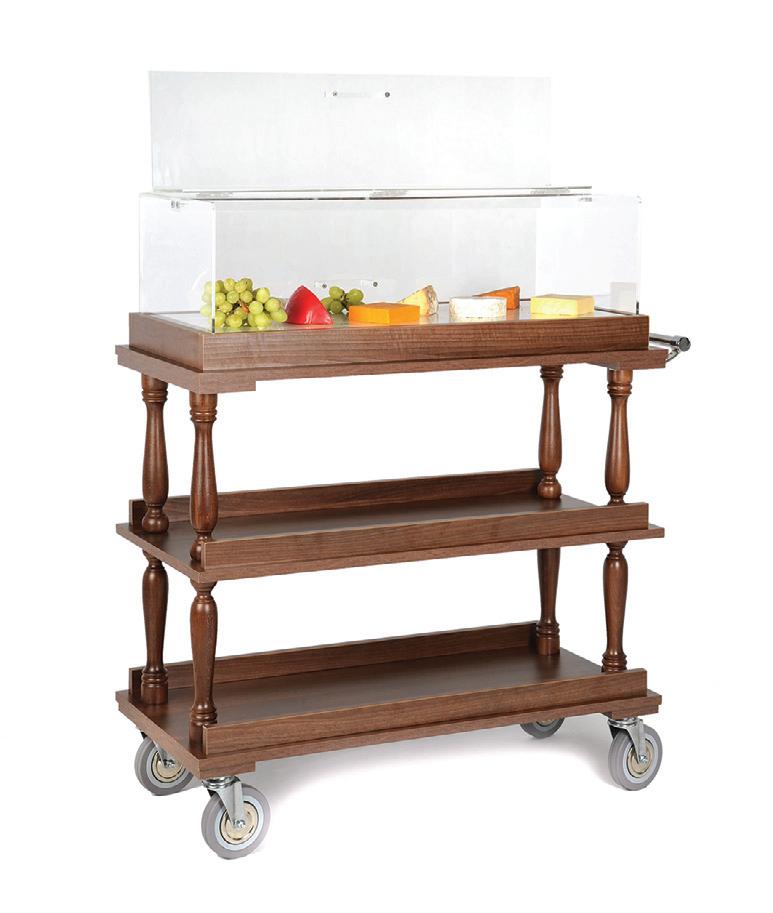
Ontex are proud to announce that we will be showcasing at the Care Show at the NEC in Birmingham on the 8-9th October. You will find us at Stand J15 and we would love for you to come over and say hello!
Our team will be there to offer advice and support on how to use our range of baby care, feminine hygiene and adult incontinence care products. Talk
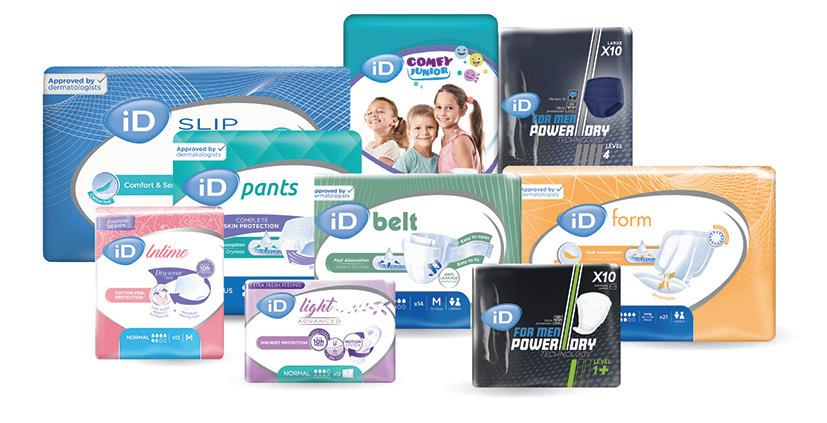
to us about our continence training sessions and the work we do with unpaid carers. At Ontex we work hard to develop our people and work to deliver sustainable value to our shareholders, partners, customers and suppliers, while making a positive impact on the communities around us. To find out more visit: Ontex.com
"23 years, operating 4 Devon Nursing homes, has been pretty tough, as anyone in social care, knows, only too well. And if it was hard already, after 2024 budget, it's just got harder.
Anyway, at heart, I am just customer of Eden Alternative, and it was a stroke of luck to come across this whilst on holiday in New Zealand in 2009. It started in USA in 1994 and now runs in 22 countries.

The fact that I am now involved with this not-forprofit organisation (in the UK area) came about when one of the 2 main UK directors died suddenly just before Covid. But it's something I have run with for 11 years to help make 'vision' a reality, not a struggle. So, being both a customer and helping the admin seems quite natural.
It is a modern philosophy of care, but moreover,
it's a programme that is straight forward, tried and tested for 30 years and really works.
Its member care organisations generally become trainers for their own teams, and run it themselves.
The programme is run in person over 2-3 days or online 1 hr a wk for 7 weeks. You choose.
It addresses loneliness, helplessness and boredom and operates through 10 principles to underpin 7 critical domains of wellbeing. Moreover, it's effective, transformational and really works. As residents, and team members wellbeing, matter so much , it's a must, in my opinion.
Geoffrey Cox Southernhealthcare.co.uk eden-alternative.co.uk"
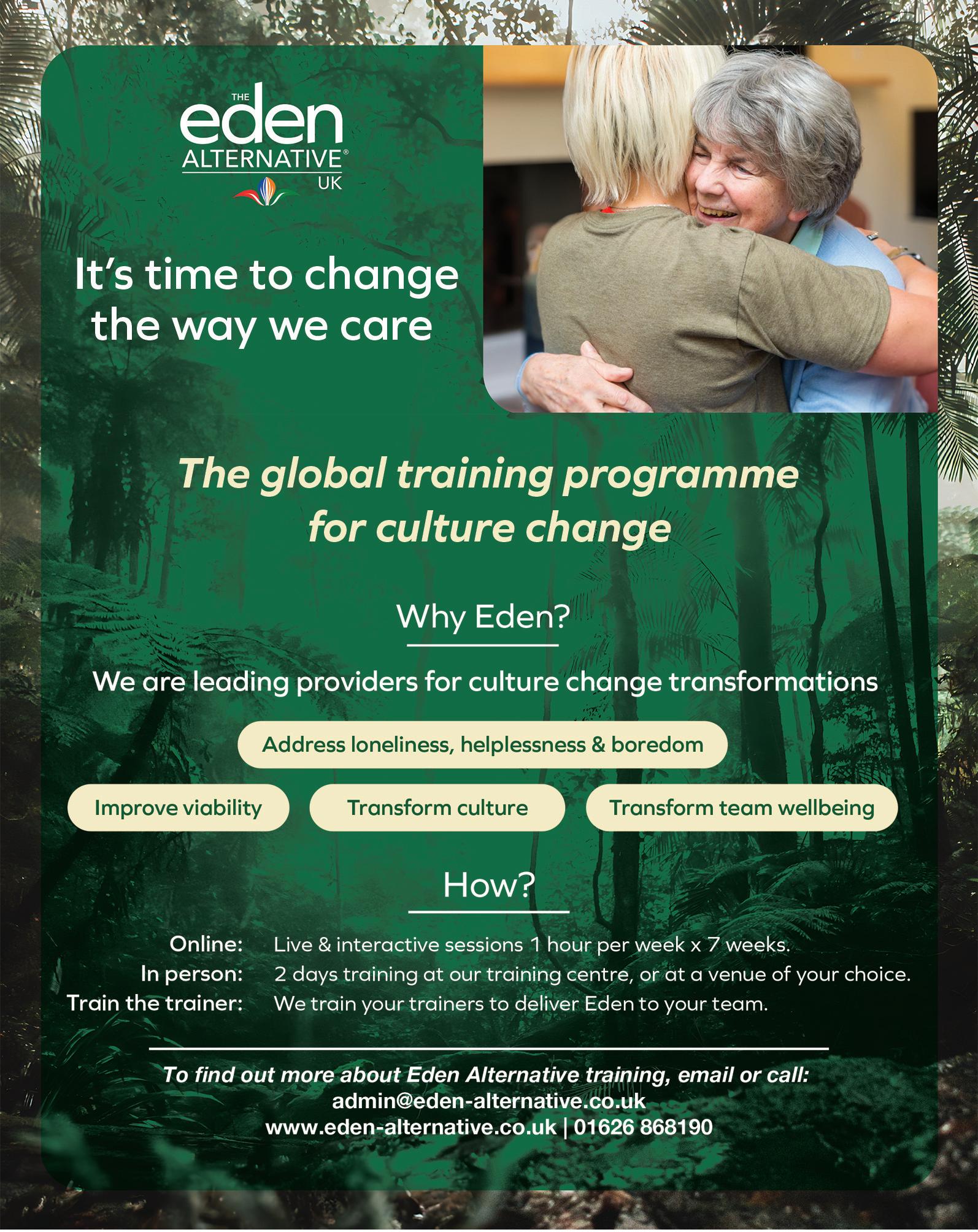
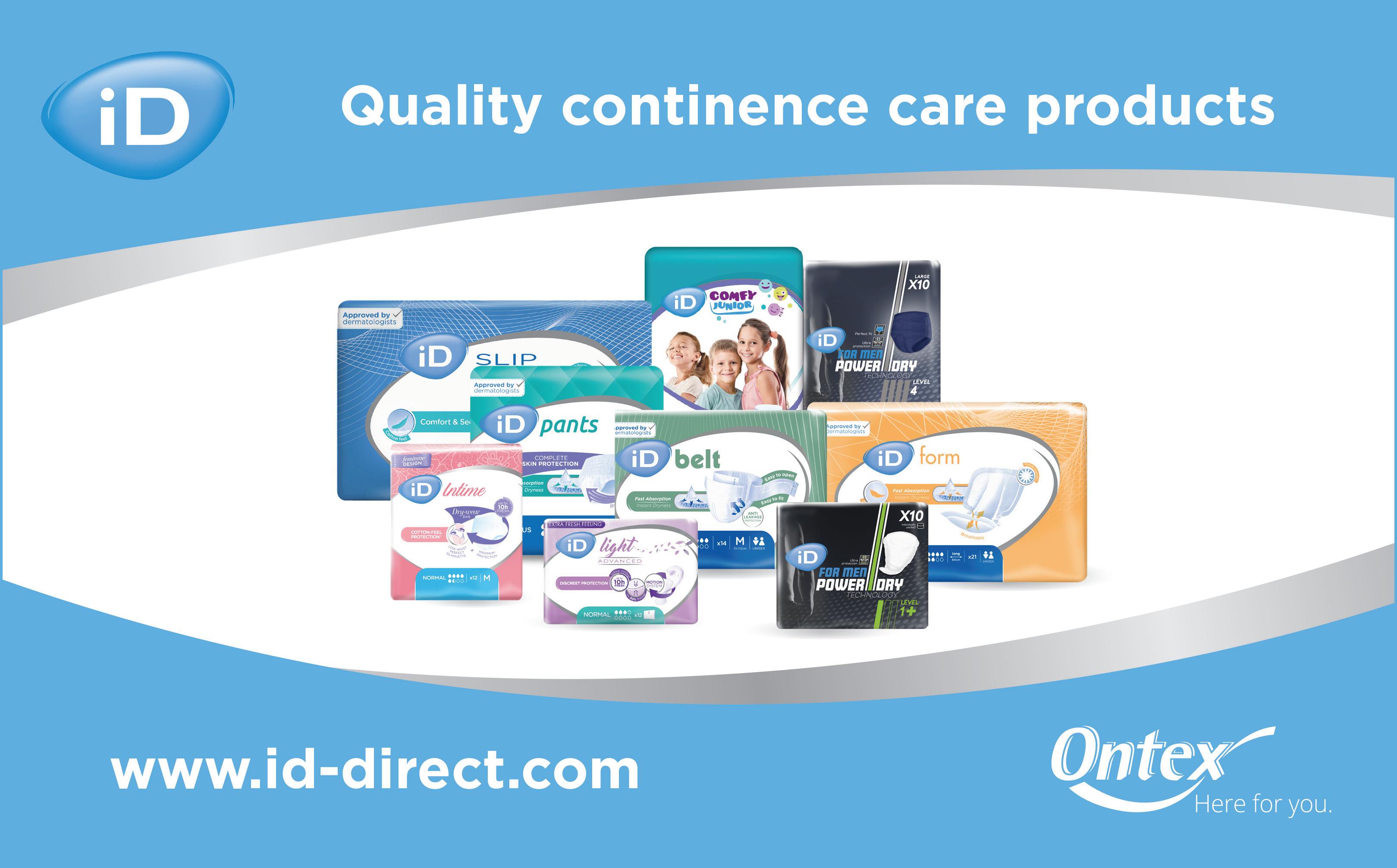

In the complex world of care-home medicine management, consistency and reliability are everything. From ensuring the right medicines arrive on time, to providing specialist support and training for staff, a single weak link can jeopardise the safety and well-being of residents. That is why more and more care providers are turning to Care Quality Pharmacy – a national, care-home-only distance-selling pharmacy – to deliver a true one-pharmacy solution.
CONSISTENCY AND SIMPLICITY
Running multiple homes often means juggling relationships with several local pharmacies. This can lead to variations in service levels, communication gaps and unnecessary administrative burden. By partnering with a single specialist pharmacy, care providers enjoy a unified approach across every home. Care Quality Pharmacy provides guaranteed monthly delivery dates, centralised prescription management and a dedicated Key Account Manager, ensuring that every home receives the same high standards of service.
ADVANCED TECHNOLOGY AND COMPLIANCE
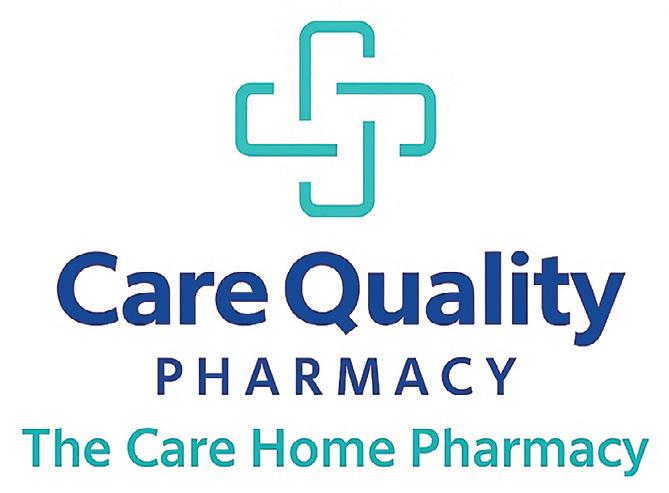
Care Quality Pharmacy harnesses advanced AI-driven prescription checking and integrates seamlessly with leading electronic MAR (eMAR) systems. These innovations reduce the risk of dispensing errors and give care teams real-time oversight of residents’ medication records. The pharmacy’s robust auditing and returns collection processes support full regulatory compliance, while scheduled annual training sessions
keep staff confident and up to date with best practice.
OPERATIONAL EFFICIENCY AND COST SAVINGS
A one-pharmacy solution eliminates duplicated processes and frees up valuable staff time. With Care Quality Pharmacy’s dedicated communications team liaising directly with GPs, homes save hours previously spent chasing prescriptions or clarifying medication queries. Interim requests are handled swiftly – often the same day –and returned medicines are collected routinely, further reducing workload and waste.
A PARTNERSHIP BUILT ON TRUST
Perhaps the greatest benefit is peace of mind. Care Quality Pharmacy’s national infrastructure, experienced team and proactive approach mean care-home operators can focus on delivering exceptional care while knowing that every aspect of their medicines management is in expert hands.
In a sector where safety, compliance and resident well-being are paramount, a one-pharmacy solution is not just convenient – it is transformative. Care Quality Pharmacy brings together specialist knowledge, cutting-edge technology and a commitment to personalised support, making it the trusted partner for care homes across the UK.
See the advert on the back cover for further details.
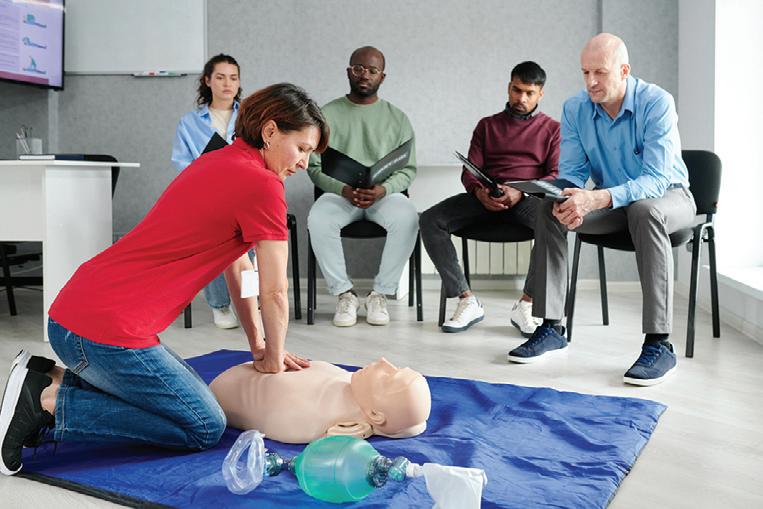
Blended learning recognises that effective training goes beyond theory. Knowledge is important; staff must first understand the what and the why, however knowledge alone doesn’t always prepare them for the realities of a care setting. Skills need to be practised, rehearsed and refined in an environment that’s safe before they are put into practice with residents or service users. When staff build confidence through role play, simulation, and guided practice, the leap from theory in the classroom to the real world becomes less daunting. The next step is proving capability on the job. Competency assessments connect learning with practice, giving managers assurance, regulators evidence, and service users confidence in the care they receive. But learning shouldn’t end there; structured pathways that map skills to roles, prompt refreshers, and track development over time keep staff on course,
turning their training into a process of continual growth which is also aligned with Skills for Care standards and expectations set out by CQC.
The impact on organisations is clear – teams feel supported and this improves retention, which in the Health and Social Care sector is more important now than ever. Families, inspectors, and service users see a higher quality of care, and managers gain reassurance that their workforce is competent and confident. Ultimately, blended learning creates safer, kinder, and more consistent outcomes for everyone, meaning higher care standards and greater satisfaction all round.
Which is why your team deserves myAko. Blended learning is more than just an approach, it’s essential for everyone in our sector!
ww.myako.online
hello@myako.com 01202 283283





By Charlotte McKay, Head Chef at St Quentin Care Homes (https://hmtstquentin.org)
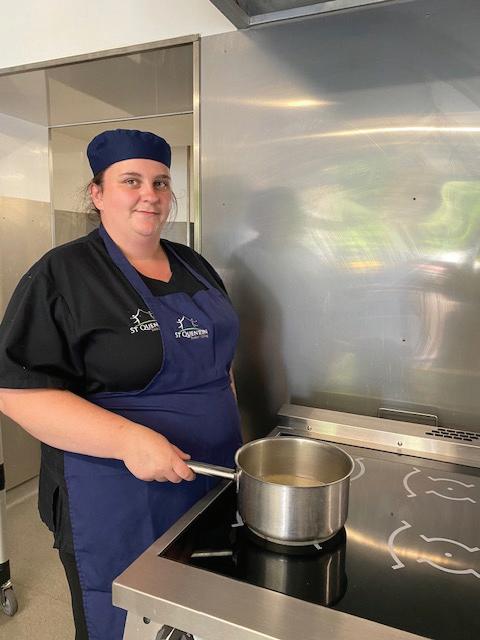
In a care home, catering can be the difference between mealtimes that are anticipated with pleasure and those that are simply endured. Care itself is rightly personalised, tailored to the needs and preferences of each resident. The same principle should apply to the food they eat. Residents and their families are entitled to expect meals which reflect dietary needs, medical conditions, and personal tastes. But delivering that level of personalisation at scale, within budget, is no small task.
The Healthcare Management Trust acquired St Quentin Care Homes almost a year ago and has made significant improvements in care delivery, infrastructure, and leadership. Catering was a big area of focus and has brought tangible results: residents returning for second helpings, heartfelt thanks from families, and a noticeable reduction in food waste. These results haven’t happened by chance; they are the outcome of deliberate choices in how we source ingredients, design menus, and create the overall dining experience.
FRESH INGREDIENTS AND A VARIED MENU
The value of using fresh ingredients over pre-packaged or heavily pro-
cessed alternatives cannot be overstated. Fresh produce boosts nutritional quality, enhances flavour, and increases the likelihood that residents will eat and enjoy their meals.
Variety is equally important. A repetitive or bland menu fails to tempt people to the dining room. Similarly, introducing a rotating weekly menu with diverse flavours and textures, including vegetarian and vegan options, will create something for everyone, which is especially important where care homes support residents of varying ages and cultural backgrounds.
Style should never overtake substance, but presentation matters and plays a vital role in whether a meal is eaten. An unappealing plate can lead to food being left untouched, no matter how nutritious it is.
Small touches make a big difference. Balancing colours on the plate, arranging food attractively, and serving it on crockery that complements the meal will encourage meals to be finished. Even something as simple as offering a platter of sandwiches with varied fillings, so residents first see vibrant colours rather than just bread, can boost appetite and engagement.
Many care home residents are unable to visit restaurants, and for them, mealtimes are often the closest equivalent to dining out. Recreating elements of that experience can lift the mood and turn a necessary routine into a highlight of the day.
Printed menus with clear, attractive typography help residents feel they have real choice and control. For some, reading a menu may even stir
fond memories of past outings and family meals. This small detail reinforces the dignity and pleasure of the dining experience.
Sharing food is a social occasion. In care homes, shared meals can foster community spirit, reduce loneliness, and spark conversation. Making mealtimes engaging and enjoyable benefits both emotional wellbeing and nutritional intake.
This means paying attention to more than just the food. Lighting, music, table layout, and staff interaction all contribute to the atmosphere. A team that works seamlessly from kitchen to dining room by greeting residents warmly, knowing their preferences, and encouraging participation can transform mealtime into a joyful daily event.
Great catering doesn’t happen in isolation. It relies on strong collaboration between chefs, care staff, activities teams, administrators, residents, and families. Open communication ensures dietary needs are met, allergies are avoided, and preferences are respected.
When everyone takes shared responsibility, residents benefit from meals that are not only safe and nourishing, but also deeply satisfying. The catering team gains valuable insight from care staff who know residents well, while residents themselves feel heard and valued.
Ultimately, catering in a care home is about far more than providing three meals a day. It’s about respecting individuality, supporting health, and creating moments of joy. When meals are thoughtfully planned, beautifully presented, and shared in a warm environment, they nourish the body and the mind.
Danielle Smith, registered nutritionist and head of nutrition at Added Value Enterprises Ltd (AVE), explains how nutritional consultancy can enhance the wellbeing of residents in care homes
In care homes, food is far more than a daily routine - it is central to health, comfort, and quality of life. Mealtimes are moments of dignity and social connection, yet the nutritional value of what is served plays a critical role in residents’ wellbeing. As awareness of food and health grows, the sector faces a vital challenge: to move beyond meeting the minimum requirements to embracing nutritional guidance that truly supports residents.
For years, catering has focused on compliance such as reducing salt, lowering sugar and limiting fat. But good nutrition is also about what we add: nutrient-dense ingredients, fresh produce and the creation of recipes that avoid over-reliance on ultra-processed products. Families are asking sharper questions about what’s included in meals and inspectors increasingly recognise the link between diet, health, and resident satisfaction. This is where effective nutrition consultancy makes a difference. Regular menu analysis and assessing how
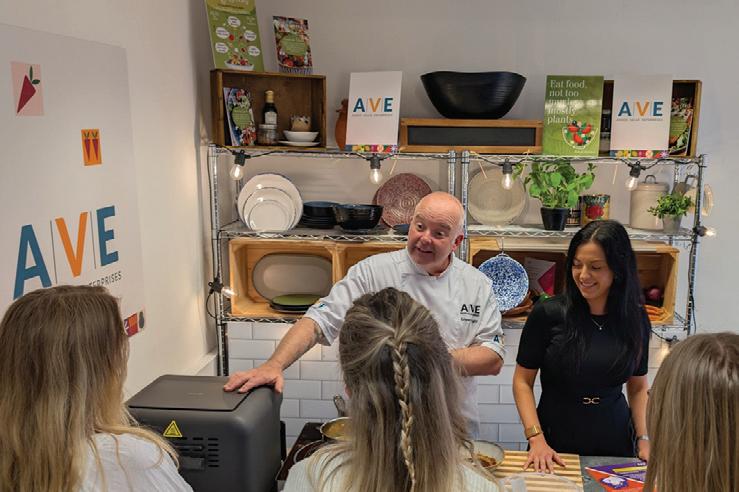
healthy a dish is can highlight where small adjustments can bring big benefits. Bespoke advice ensures meals meet specialist needs ranging from dysphagiafriendly recipes to heart-healthy dishes that promote long-term vitality. Importantly, training equips catering and care staff to understand why nutritious food matters. At AVE, we can provide guidance that is practical as well as strategic: from developing tailored menus to creating engaging wellbeing initiatives such as hydration days or condition-specific workshops. We can analyse menus to assess the nutritional value of each dish and provide advice on how to make improvements. By embedding this expertise, care homes can demonstrate both compliance and genuine commitment to residents’ health and wellbeing.
In today’s landscape, nutritional oversight is not an optional extra - it is a cornerstone of quality care. With residents and families better informed, the homes that embrace guidance will not only meet expectations but exceed them, ensuring food continues to nourish both body and mind.
See the advert on this page for details, visit www.a-v-e.com or
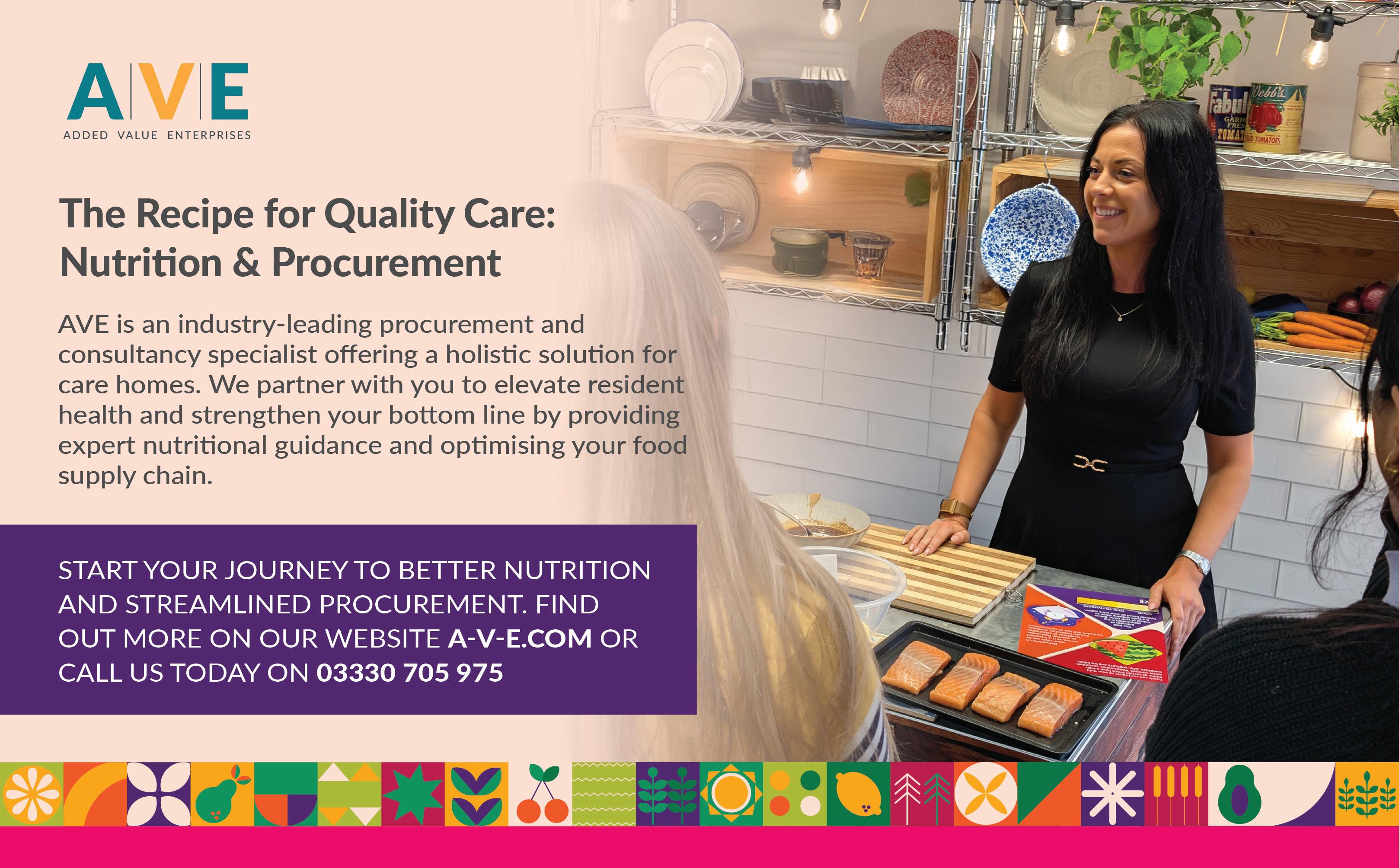
By Gemma Christie, Business Account Manager at Miele

In the care sector, operational decisions carry significant weight. Whilst frontline care rightly takes centre stage, it’s also important to remember that the kitchen plays a vital role in maintaining hygiene, supporting staff efficiency, and ensuring resident wellbeing. Among the many moving parts of the care home kitchen, dishwashing is often overlooked. This is likely because it operates behind the scenes and isn’t seen as a direct part of resident care, yet it’s a key consideration for care homes looking to provide a safe, smooth service.
With multiple meal services each day, the kitchen is one of the busiest areas in a care home. Relying on manual washing not only slows down operations but also increases the risk of hygiene lapses. That’s why investing in the right dishwashing solution is critical.
For care homes looking for reliability, hygiene assurance and longterm value, commercial solutions are the smart choice. Here are five key reasons why investing in a professional dishwashing solution can make a meaningful difference.
WHY DOMESTIC DISHWASHERS FALL SHORT
It’s not uncommon for care homes to rely on domestic dishwashers, especially when budgets are tight. But these machines are rarely up to the task. Designed for occasional household use, they struggle with the frequency and intensity of care home operations. Over time, this can lead to breakdowns, inconsistent results, and even hygiene risks. Commercial dishwashers, by contrast, are built for durability and performance. They’re tested to withstand thousands of cycles and are engineered to maintain consistent cleaning standards, even under intense pressure. For care homes, this means fewer disruptions, lower
long-term costs, and greater piece of mind.
HYGIENE RESULTS YOU CAN TRUST
It’s no secret that infection control is always a top priority in any care or medical settings, especially with residents that are often more vulnerable to illness, and where outbreaks can have serious consequences. Dishwashing equipment can help to fight against these infections and play a big role in preventing cross contamination. But only if it’s up to the job.
High-performance commercial machines, such as the MasterLine range by Miele Professional offer disinfection-grade wash cycles that eliminate harmful bacteria and pathogens. Some models also feature advanced drying systems that remove the need for manual handling, further reducing the risk of contamination. These features aren’t just nice to have, they’re essential for maintaining compliance and protecting residents.
SPEED AND EFFICIENCY IN THE KITCHEN
Care homes run on tight schedules. Mealtimes are fixed, and delays can have a knock-on effect across the day. That’s why turnaround time is a key consideration when selecting dishwashing equipment.
Modern commercial dishwashers can complete a full cycle in as little as five minutes, ensuring that clean items are always available when needed. This reduces the need for excess crockery and helps staff stay focused on resident care rather than kitchen logistics.
Supporting staff and reducing their workload
The right equipment doesn’t just improve hygiene standards, it also helps to support staff wellbeing. In a sector where recruitment and retention are constantly ongoing challenges, anything that eases the daily workload is a welcome investment.
User-friendly controls, intuitive interfaces, and automated features such as detergent dosing or drying programmes can make a real difference to staff efficiency and satisfaction. When equipment actually works with your team, and not against them, it frees up critical time and energy for what matters most, caring for their residents.
A LONG-TERM INVESTMENT
While the upfront cost of commercial dishwashing equipment may be higher, the long-term benefits are clear. Reduced maintenance,
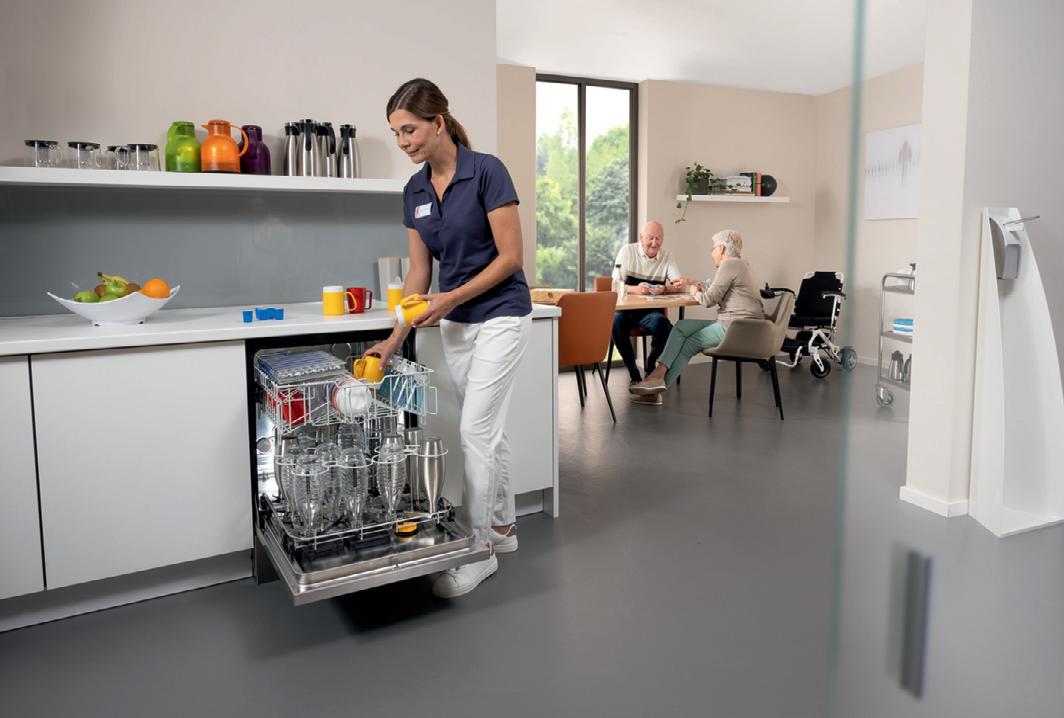
lower energy and water consumption, and extended service life all contribute to a more sustainable and cost-effective operation. For example, Miele Professional’s MasterLine dishwashers can complete a full cycle in just 5 minutes and use as little as 5.0 litres of water per cycle, depending on the model. Their energy-efficient design helps reduce utility costs while maintaining top-tier hygiene performance. Some dishwasher manufacturers offer extended parts availability and nationwide service networks, ensuring that support is always close at hand. Miele Professional offers spare parts available for up to 15 years after production ends and a UK-wide service network with a 90%+ first visit fix rate meaning that care homes can rely on consistent, expert support when it matters most.
Dishwashing may not be the most visible part of care home life, but it’s one of the most vital. By investing in the right equipment and processes, care homes can enhance hygiene, improve efficiency, and create a safer, smoother environment for both residents and staff.
To explore how Miele Professional's commercial dishwashing solutions can enhance your care home, please visit: https://www.miele.co.uk/p/retirement-care-homes-4053.htm
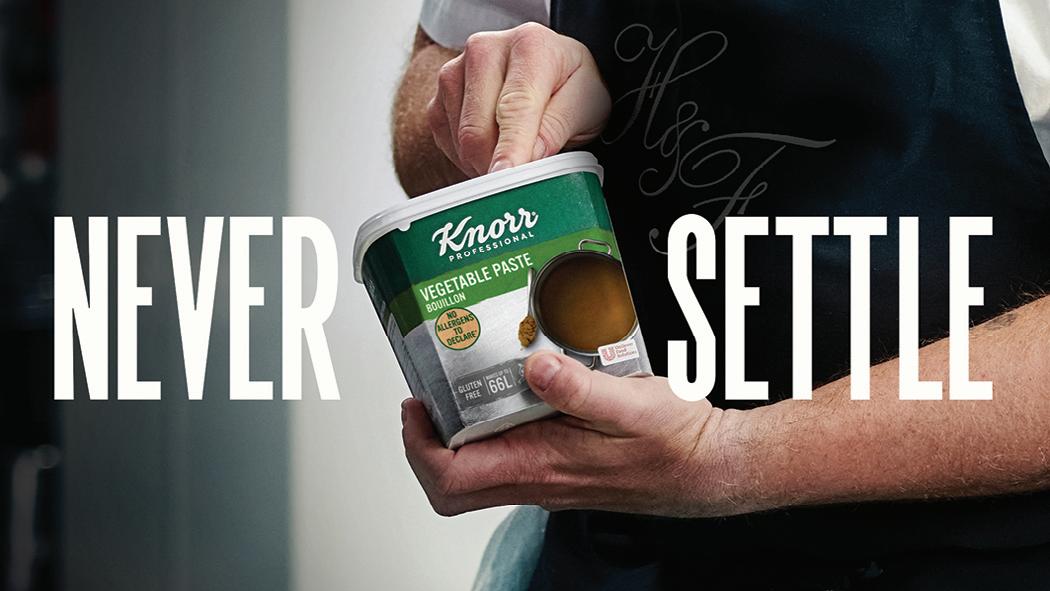
In the care sector, food is more than just nutrition - it’s comfort, dignity, and a way of bringing joy to residents every day. That’s why chefs can’t afford to compromise. From flavour and safety to consistency and versatility, every ingredient has to deliver. When it comes to bouillon, Knorr Professional refuses to settle for anything less than the best and so do the chefs who use it.
Knorr Professional Bouillon is the UK’s number one bouillon brand*, trusted in kitchens nationwide for its rich depth of flavour, outstanding versatility, and chef-trusted consistency. It’s made to work hard in every service, withno allergens to declare¹ options that give chefs peace of mind when catering for residents with diverse needs. NEVER SETTLE FOR BLAND DISHES
As residents age, their sense of taste can diminish. That’s why flavour has to work harder in care - it’s not just about nutrition, it’s about enjoyment. Knorr Professional Paste Bouillon brings bold, balanced flavour that cuts through reduced senses, ensuring dishes remain satisfying and memorable.
Whether it’s used as a base, rub, seasoning, glaze, or marinade, it delivers the same consistent, chef-approved results. From soups and stews to roasted vegetables and marinades, this is one product that performs across the menu - helping chefs adapt quickly without losing quality.
NEVER SETTLE FOR UNCERTAINTY
In care kitchens, allergen safety isn’t negotiable. Theno allergens to declareoptions in Knorr Professional Paste Bouillon make it simple to create inclusive dishes without sacrificing flavour. This helps reduce the risk of cross-contamination and ensures every resident can enjoy the same great taste.
For Knorr Professional Care Ambassador Preston Walker, that confidence is invaluable:
“With ‘no allergens to declare’ options available across the range, Knorr Professional Paste Bouillon is easy to introduce into dishes that need to be suitable for varying needs and preferences,” says Preston. “It gives me peace of mind that I can create flavour-packed dishes for all residents, without excluding anyone due to allergens.”
NEVER SETTLE FOR INCONSISTENCY
Care kitchens can be high-pressure environments, where time is short and the need for consistency is constant. Knorr Professional
Bouillon’s paste format makes it easy to store, measure, and use, ensuring the same flavour profile in every batch. Its consistent yield also helps with budget control - delivering premium quality without waste.
Preston sums it up simply:
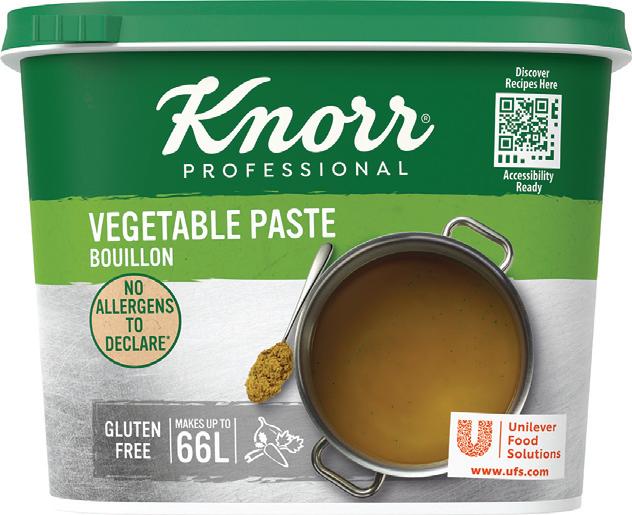
“We use the Knorr Professional Bouillon paste range for one simple reason - it delivers. Quality, flavour, consistency, and the confidence of knowing exactly what you’re going to get, every time.”
NEVER SETTLE FOR SECOND BEST
Every plate in a care home matters. It’s an opportunity to provide comfort, joy, and nourishment - and that means every ingredient has to earn its place. With Knorr Professional Bouillon, chefs can be sure they’re serving the very best in flavour, safety, and reliability. Because when it comes to care catering, settling for less is never an option.
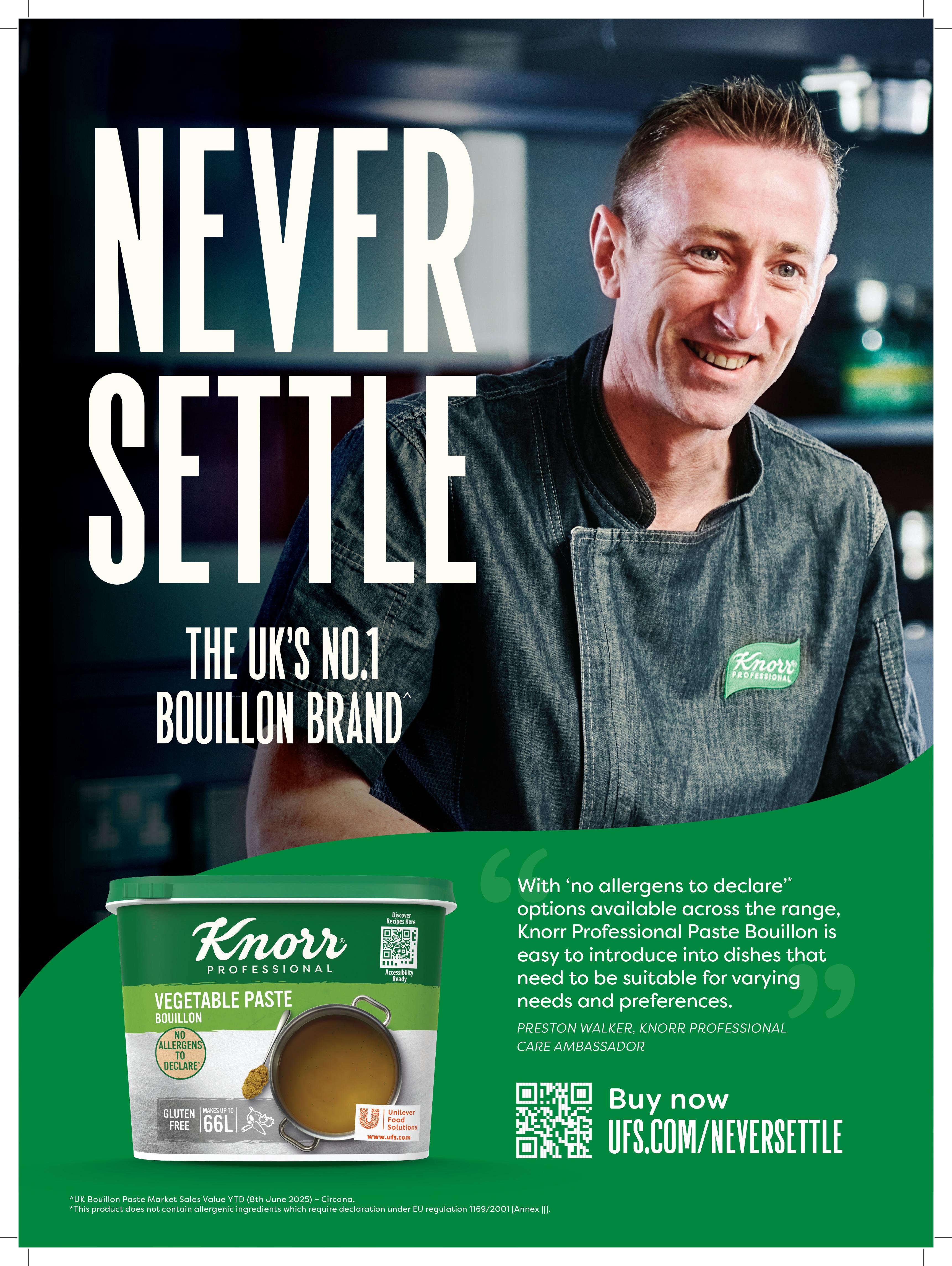
Care home budgets are under mounting pressure. Food supply constraints, inflation, and rising labour costs are combining to create a perfect storm for operators already working to tight margins.
The British Retail Consortium’s latest survey paints a concerning picture: 85% of retailers have raised prices in response to increased costs, fuelled by rises in employer National Insurance contributions and the National Living Wage. In the catering sector, which is heavily dependent on lower-wage roles, these changes are having a pronounced impact.
The Office for National Statistics’ July CPI figures show food inflation at 4.9%, with forecasts suggesting this could reach 6% by the end of the year. According to food procurement expert allmanhall’s Managing Director, Oliver Hall says:
“Based on recent and forecasted inflation spikes, care groups may want to revisit what they have budgeted for annual food inflation for the coming months. allmanhall consistently outperform inflation with price rises lower than inflationary rates, ensuring every pound of catering spend goes as far as possible.”.

Global factors are adding further uncertainty. Extreme weather patterns are disrupting crop yields and threatening food supply chains. The resulting price volatility is not limited to raw ingredients - distribution, packaging, and processing costs are also climbing.
Faced with these pressures, some care providers may be considering outsourcing catering as a cost-saving measure. However, as Oliver cautions:
“Pause before you add a management fee on top of rising labour costs on someone else’s payroll.”
Just because you eat less, or eat differently, it doesn't mean you should settle for less.
At Food Untethered, we believe that everyone – regardless of how they eat –deserves access to real, organic, and nourishing food. Whether you are tubefed, or simply need liquid nutrition on the go, our meals are made with care, using nothing artificial and held to the highest of safety standards.
We’ve launched our first three meals: a Coconut & Banana Smoothie, a Carrot & Coriander Soup, and a Mexican Bean Stew. Each is packed with whole ingredients, made for both taste and tolerance, and suitable for use orally or via a feeding tube.
But this is just the beginning. Over the next year, we’re releasing a full range of meals that can be consumed hot or cold, snacks, smoothies, and drinks –designed with real people, real needs, and real lives in mind.
Instead, the focus should be on smarter procurement strategies that deliver sustainable, long-term cost control.
Taylor & Taylor Care provide a strong example. Partnering with allmanhall, they benefit from comprehensive supply chain management, proactive supplier negotiations, and regular consultative advice - all designed to keep costs down without compromising quality.
“From day one, the care and attention provided by allmanhall has been exceptional… I’ve been impressed by the savings we’ve already seen, the flexibility regarding suppliers and by the excellent quality.”
Click here for the full video case study:
https://www.youtube.com/watch?v=NkroiOj26fs&t=1s
In today’s climate, expert food supply chain management is more than a support service - it’s a necessity. By tracking every penny of spend, identifying efficiencies, negotiating competitive pricing, and managing suppliers, care homes can protect their budgets while maintaining quality for residents.
As Oliver concludes:
“The effects of Government policy will likely be felt in the form of higher food prices in the coming years... choices made today will play a pivotal role in shaping the future of food security”.
With the right partner, care groups can ensure good food remains affordable, responsible, and sustainable - because quality meals for residents shouldn’t cost the Earth.
See the advert on the facing page for more information.


Our food is safe, shelf-stable, recyclable, and above all, human. It's not synthetic formula. It's not baby food. It’s real food, reimagined for different appetites.
If you or someone you care for lives with dysphagia, is tube-fed, or simply needs an easier way to stay nourished, we’re here to help.
Call us today – we’re a small team, and we love to talk. Whether you’re new to this or a seasoned pro, we’ll help you find something that works.
You don’t need to compromise.
You just need food that works for you.
Food Untethered
Real food. For every way of eating. www.fooduntethered.com
Please see our advert below.

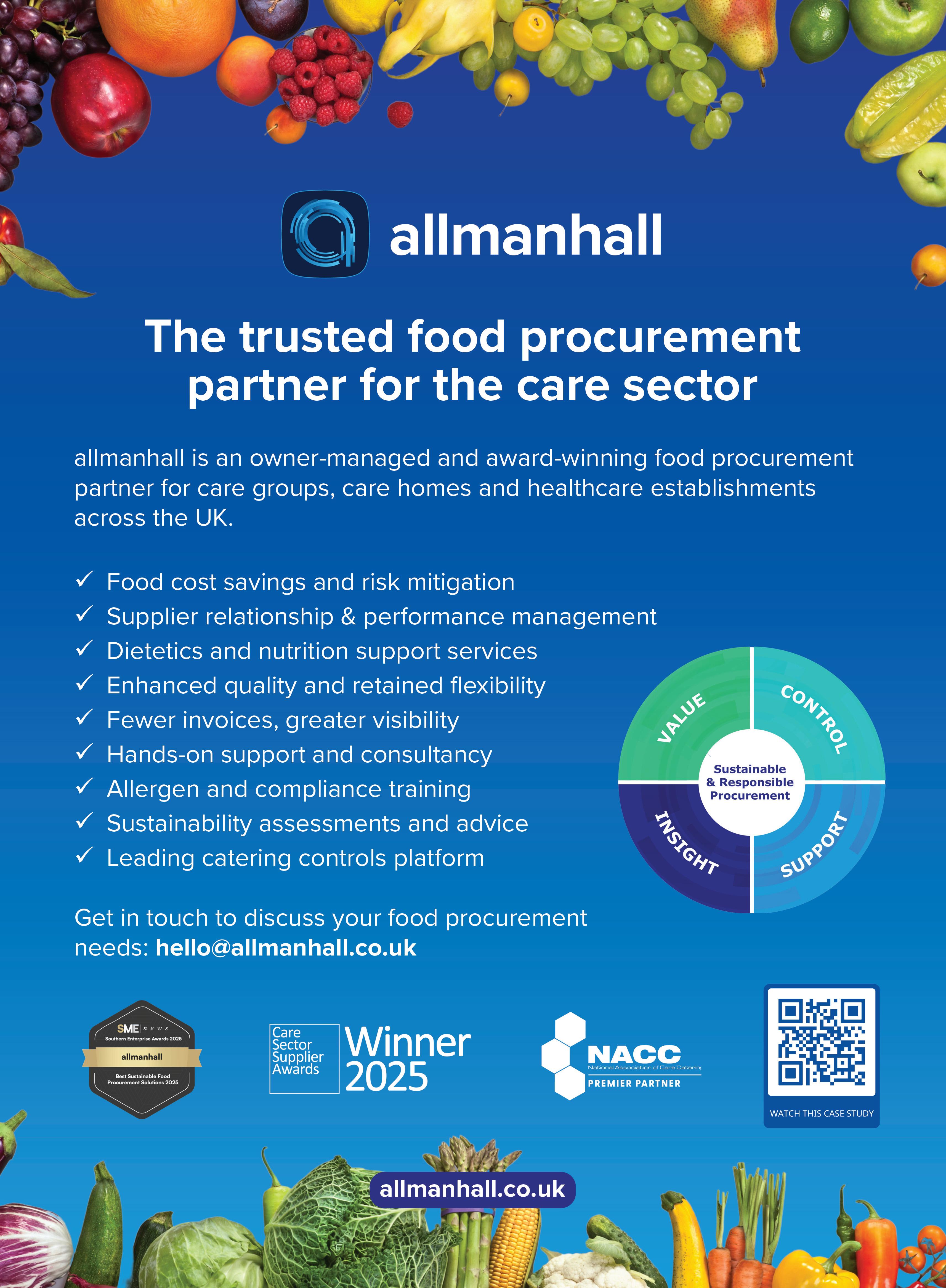

Mobile Kitchens Ltd specialises in the hire or sale of temporary catering facilities and foodservice equipment. Ideal for events or to provide temporary catering facilities during your kitchen refurbishment, our versatile units and equipment offer an efficient and economic solution to the caterers’ needs.
Production Kitchens, Preparation Kitchens, Warewashing Units, Dry Store Units, Cold Rooms and Restaurant Units are available as individual units in their own right or they can be linked together on site to form a complete complex.
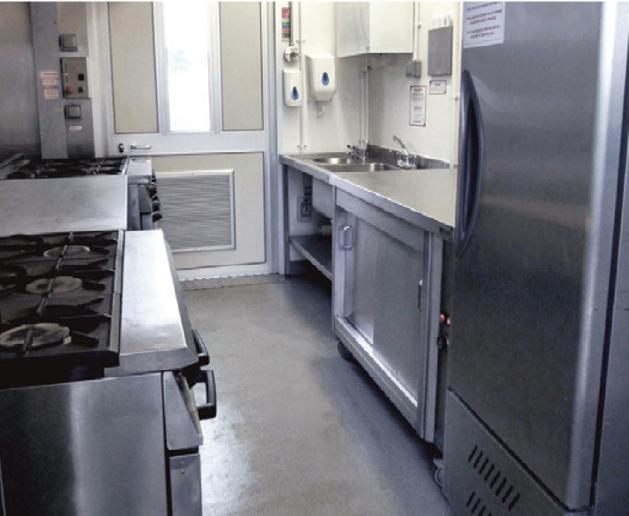
Alternatively, we can offer modular, open-plan facilities, usually for larger, longer-term hires. We offer a free design service, and project management from concept through to delivery and installation on site, plus full technical support throughout the hire period.
Commercial Kitchen and Laundry Solutions (CKLS) are one of the UK's leading suppliers of commercial kitchen and laundry equipment. Whether you are a small sized residential home or large scale nursing home group, CKLS has the expertise and equipment you need to keep your operations running smoothly.

At CKLS, we understand that the success of your business depends on the quality of the equipment you use. That's why we've made it our mission to provide businesses across the UK with the highest quality commercial laundry and kitchen equipment available. We work with only the best manufacturers in the industry to ensure that our customers get the most reliable and efficient equipment possible.
Our commitment to our customers doesn't end with the sale of our equipment. At CKLS, we know that maintenance and repairs are crucial to keeping your equipment functioning at its best. That's why we offer a full range of maintenance and repair services
to our customers, including emergency repair services available 24 hours a day, 7 days a week.
We believe that our success as a company is measured by the success of our customers. That's why we're constantly striving to provide better products and services to help our customers achieve their goals. We're proud to say that our commitment to excellence has earned us a reputation as the go-to provider of commercial laundry and kitchen equipment in the UK.
So, if you're looking for reliable, high-quality commercial laundry and kitchen equipment, look no further than CKLS. With our extensive range of products and services, we're confident that we can help you find the right equipment to meet your needs and keep your business running smoothly for years to come.


Infection control remains a vital concern in care homes, where laundry plays an essential role in preventing the spread of harmful pathogens. With the Care Quality Commission continuing to raise expectations through a more rigorous inspection framework, laundry operations must meet high standards for both hygiene and regulatory compliance. Forbes Professional is helping care providers across the UK achieve exactly that.
Many care homes still rely on domestic washing machines that are ill-suited for the demands of a clinical environment. These machines often lack the ability to maintain the thermal disinfection temperatures required in care settings and are not compliant with WRAS Category 5 regulations. In addition, domestic models are not built for the volume of laundry processed in care homes, leading to higher operational costs, increased breakdowns, and invalidated warranties.
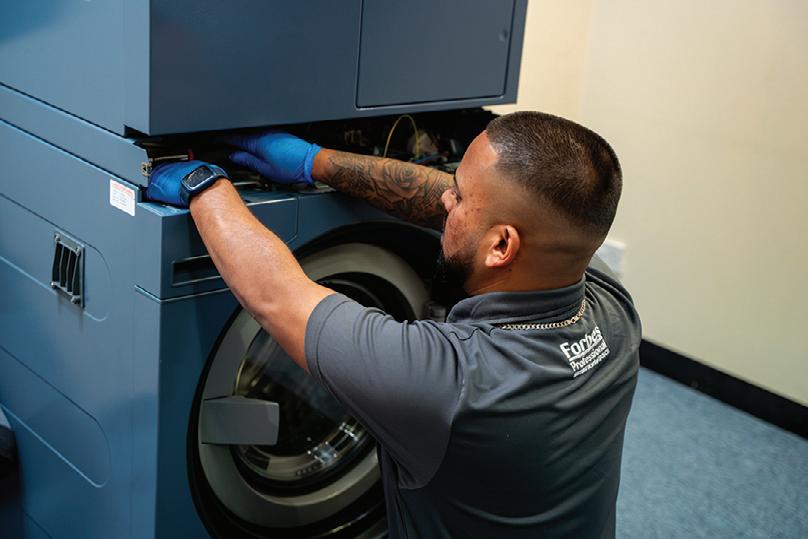
Forbes Professional supplies Miele commercial laundry equipment that is purpose-built for healthcare environments. These machines offer validated thermal disinfection cycles and include Type A air gaps for full WRAS compliance. Forbes also offers high-performance detergents which can be used in conjunction with the Miele appliances to deliver a comprehensive solution that supports effective infection control even at lower temperatures.
Some care operators have explored ozone-based disinfection as an alternative. While ozone can be effective, it introduces additional responsibilities around safe use and regulatory compliance. Systems must be carefully managed to mitigate potential risks to staff and residents. Forbes offers tried-and-tested alternatives that eliminate complexity while delivering proven results in a care environment. A major differentiator for Forbes is the company’s nationwide service infrastructure. They understand that equipment failure in a care home laundry room can quickly escalate into a serious operational issue. To minimise disruption, Forbes provides same- or next-day engineer call-outs as standard. Their extensive team of qualified field engineers and well-stocked service vehicles ensures swift, expert support across the UK.
Forbes also offers comprehensive rental and service contracts that include all maintenance and repairs, helping care homes manage costs and reduce administrative burden. These end-to-end solutions provide care operators with peace of mind, knowing their laundry systems are compliant, efficient, and fully supported. By partnering with Forbes, care homes benefit from expert guidance, market-leading equipment, and dependable service; ensuring hygiene standards are met and residents are protected. forbespro.co.uk | info@forbes-professional.co.uk | 0345 070 2335
SOUTHERN Contracts is one of the UK’s leading suppliers of industrial laundry, catering and commercial cleaning equipment.
Founded in 1964 to initially supply and maintain commercial cleaning equipment to the marine industry, we have since grown to become a well-respected and trusted partner to leading manufacturers.
We have consistently been the top performing Laundry Partner to Electrolux Professional and again achieved their top Laundry Partner Award for 2024. We’ve now won this accolade consistently for well over 20 years.

Now in our third generation and still very much a family run business, we are proud to now be a global supplier of not only laundry equipment, but with knowledge gleaned over the years, we are also a go-to company for professional kitchen appliances and commercial cleaning equipment. With our knowledge of most market products, we pride ourselves on delivering the very best solutions and service to our customers.
Already working for many of the national Care and Nursing Homes, as well as the hospitality industry such as hotels, restaurants and holiday parks, we understand the importance of keeping ‘down time’ to a minimum and by keeping in stock the leading commercial washing machines, tumble dryers and cleaning equipment we can sometimes just swap machines over to keep your business up and running.
We are able to offer independent and unbiased advice to ensure your purchase precisely meets your
requirements and budget, across a complete array of different products and models. Our expert team of technical staff are on hand to ensure your business is supported through every aspect of your purchase or rental agreement.
From advising on current government standards (eg. infection control for commercial washing machines and meeting government legislation for kitchen appliances) our team fully support you throughout the whole journey, from initial advice to delivery, installation, customer training, ongoing maintenance, service and repair. We hold many accreditations for safety and service excellence, providing peace of mind to all our customers, whether existing or potential.
For more information regarding our services for :
- Commercial laundry equipment
- Commercial kitchen appliances and warewashing/dishwashing
- Commercial cleaning equipment
Please visit our website at southerncontracts.co.uk and see previous projects we’ve worked on and our enviable testimonials received from happy clients across a plethora of sectors.
Contact us now on 03301 222888
Follow us on : Facebook, Twitter, Instagram and LinkedIn
See the advert on the previous page for information.
At PDS, we understand the challenges that come with managing laundry in a care home. From bedding, towels and tablecloths, to cleaning the clothes of residents, we appreciate that you need a care home laundry repair service and care home laundry equipment you can rely on.
Here at PDS, we provide care home laundry equipment to suit the needs of your setting. We offer many big-name industrial brands such as Alliance, Electrolux, Miele, Girbau, Grandimpianti and Schulthess.
As your trusted care home laundry repair services partner, we can help you with more than just supplying equipment. Our care home laundry services include laundry consultations, project design and management, equipment supply and installation, spare parts and more.
Our care home washing machines range from 6kg to 30kg drums for small to medium-sized care settings, and from 26kg to 40kg ones for larger care homes with more demanding laundry needs. We offer a full range of care home laundry equipment to meet your needs. Our equipment includes:
• Washing machines
• Tumble dryers
• Stacked equipment
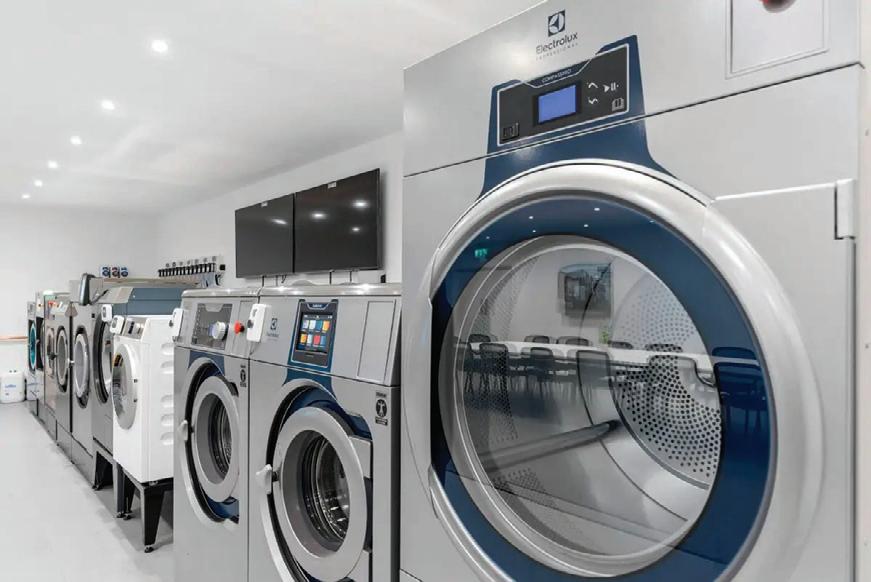
• Ironers
We supply everything from compact care home washing machines to larger ironers and stacked systems, tailored to suit your available space, daily routines and laundry demands. Our aim is to make laundry simple and efficient, so your team can focus on providing the best care for your service users.
With more than 30 years of experience, our in-house engineers offer expert support nationwide. Wherever you’re based, we’re here to keep your laundry equipment performing at its best.
If you run or manage a care home and are looking for a care home laundry repair services partner, then look no further than PDS. We’ve been helping care homes just like yours since 2007 and are one of the most trusted suppliers of care home laundry repairs and care home laundry equipment. We are here to help keep your care home running smoothly. Please get in touch
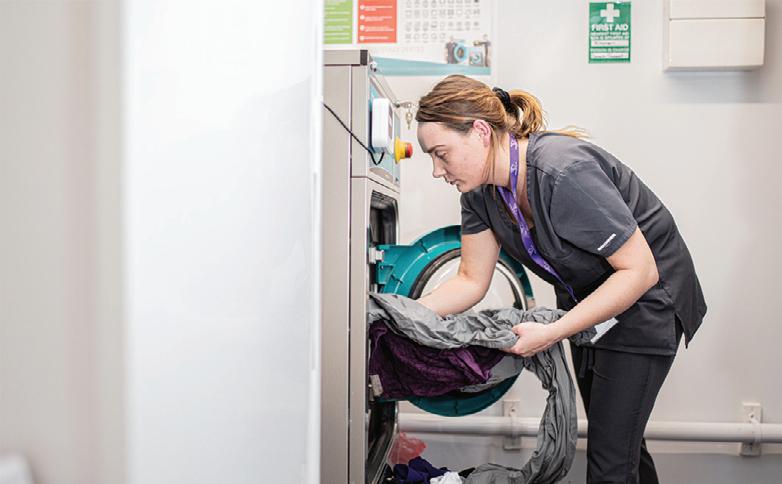
If you are looking for high quality wash results that remove stubborn stains then speak with MAG for their recommendations. Complete thermal disinfection is a standard feature on their washing machines for nursing homes. To find out more about how MAG can support your care home telephone 01353 883025 or

We


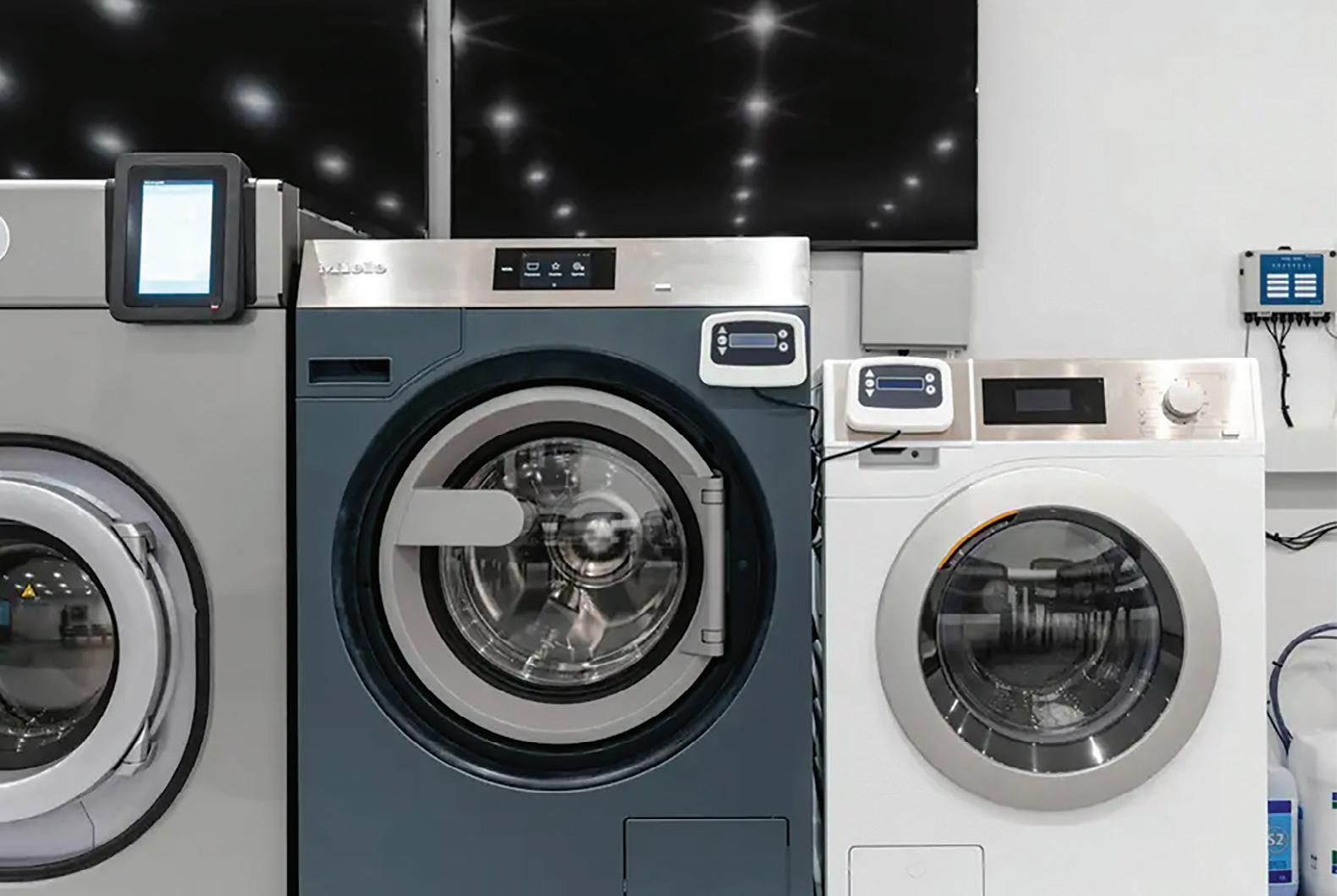

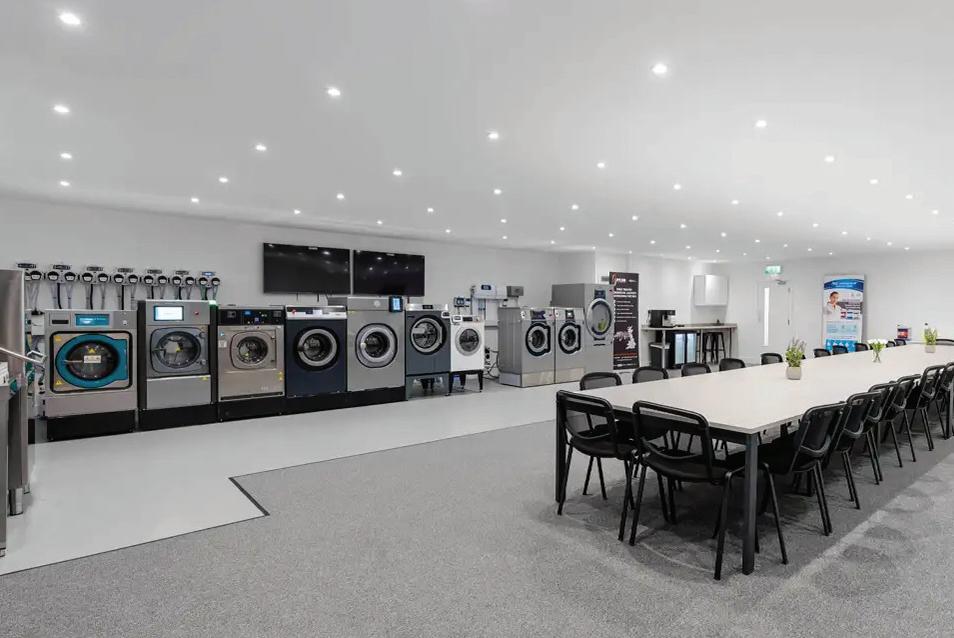

•
•



Falls Prevention Awareness Week took place this year between the 22nd and the 26th of September, and as the autumn months are upon us, the weather is beginning to change, making it important to address the types of hazards that are now more likely to occur.
Things like snow, ice and fallen leaves can cause serious accidents for both residents and colleagues and Falls Prevention Awareness Week looks to raise awareness of these hazards to protect those who may be affected.
In 2024 the Health and Safety Executive estimated the cost of slips and trips in the workplace to the UK economy was £500 million in terms of employee absence, lost production, and other costs to business.
Slips and trips in the workplace were also estimated to have cost the NHS over £800 million in 2024 hospital admission and treatment costs.
Phil Clarke, Head of Health and Safety at Care UK (www.careuk.com) says: “It’s important that we are proactive in helping our colleagues through the winter months. By reducing the number of slips and trips we can make sure everyone is safe when
they’re moving around within the homes which, most importantly, helps colleagues to ensure that residents can lead fulfilling lives.”
As part of Phil’s plans to help Care UK-run homes with their awareness of hazards posed during the winter months, he has launched Sliptember, a campaign that aims to keep people safe and aware during the month of September and beyond.
Phil says: “The main thing we can do is plan to deal with these potential issues ahead of time. This includes stocking up on grit or salt and clearing up fallen leaves regularly. A combination of rotting leaves and frozen ground provides a dangerous slip and trip hazard to both residents and colleagues.”
As part of this campaign, Phil is using the acronym CHIMES to create an easy way for people to remember what we can be doing to prevent slips and trips.

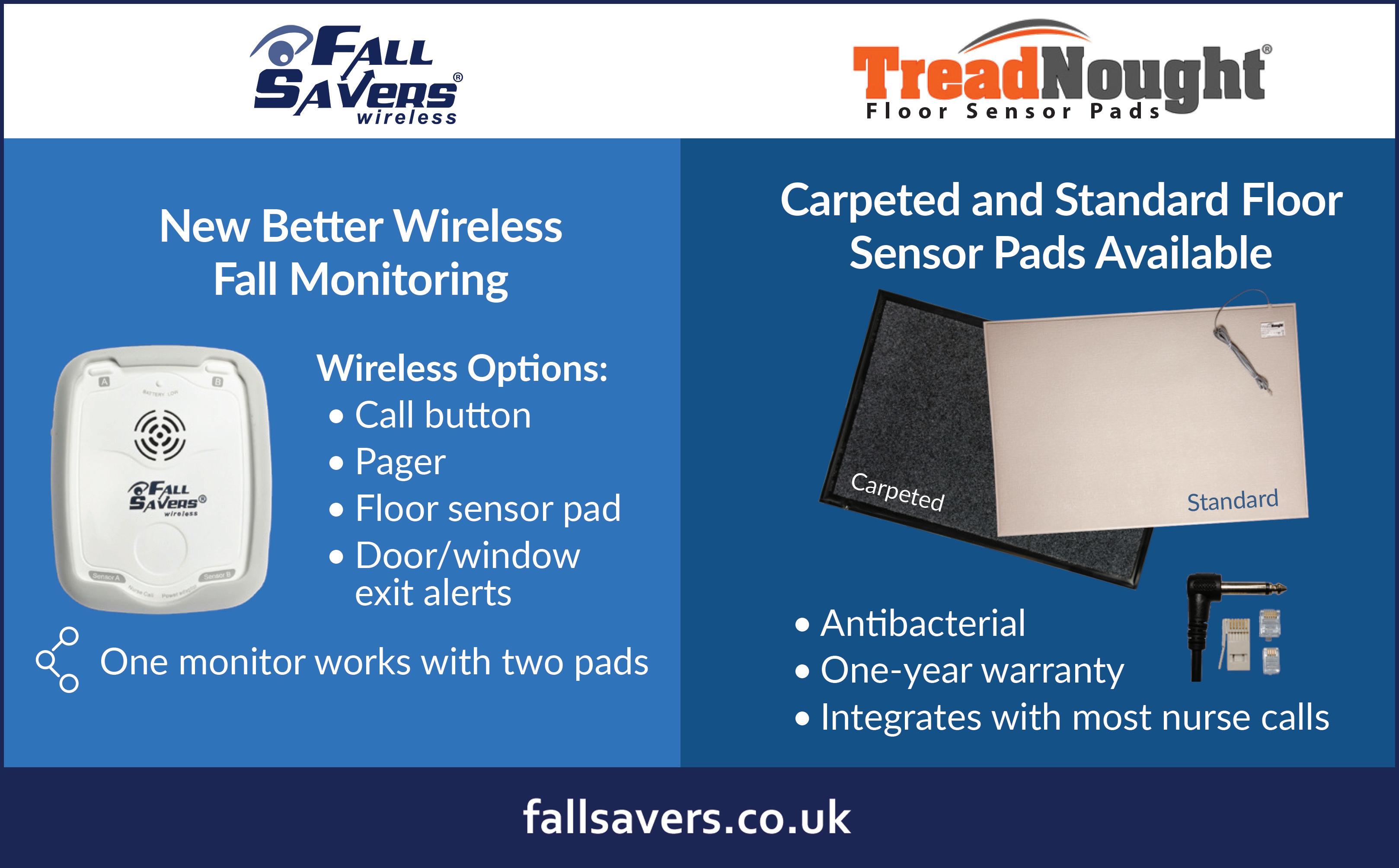
Fall Savers®, are an experienced market leading healthcare provider of resident safety solutions for over 15 years.
FALL SAVERS ® WIRELESS MONITOR
Eliminate all cables with our new generation falls management solutions!
Upgrade your falls programme with the latest technology from Fall Savers®. The NEW Fall Savers® Wireless eliminates the cord between the monitor and sensor pad. This results in less work for nursing staff, improved safety for patients and reduced wear and tear on sensor pads. Wireless advantages include the ability to use one monitor with two sensor pads simultaneously and support for many new wireless devices.
BENEFITS INCLUDE:
Safer for patients; less work for staff
Bed and chair pads available
One monitor works with two sensor pads
Integrates with most nurse call systems
A variety of options, including:
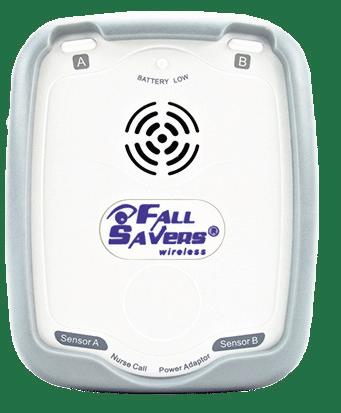
Floor sensor mat
Wireless door/window exit alerts
TREADNOUGHT ®FLOOR SENSOR PAD
The TreadNought® Floor Sensor Pad is built to last with a durable construction that far out lasts the competition. Our anti-bacterial floor sensor pad is compatible with most nurse call systems or can be used with a portable pager to sound an alert when a person steps on to the sensor pad. Caregivers typically place the sensor pad at the bedside, in a doorway or other locations to monitor persons at risk for falls or wandering. An optional anti-slip mesh reduces the potential for slippage on hard surface floors.
FEATURES INCLUDE:
Connects directly to most nurse call systems
High Quality anti-bacterial Floor Sensor Pad
Large Size Pad: Measures (L) 91cm x (H) 61cm
Options (sold separately):
Anti-slip mesh for hard surface floors

See the advert on this page for further details or visit www.fallsavers.co.uk.
Courtney Thorne, a long-standing innovator in healthcare communication systems, is setting new standards in the care home sector with its advanced wireless nurse call technology—designed to improve resident safety, enhance staff efficiency, and support a more responsive care environment.
With over 30 years of experience serving the UK healthcare market, Courtney Thorne’s systems are now trusted by thousands of care homes nationwide. Unlike traditional hardwired solutions, their wireless nurse call systems offer non-invasive installation, scalability, and smart analytics—making them ideal for both new builds and retrofit projects.
“At the heart of our technology is the belief that better communication leads to better care,” says Graham Vickrage, Managing Director at Courtney Thorne. “Our wireless systems not only reduce response times but also empower staff
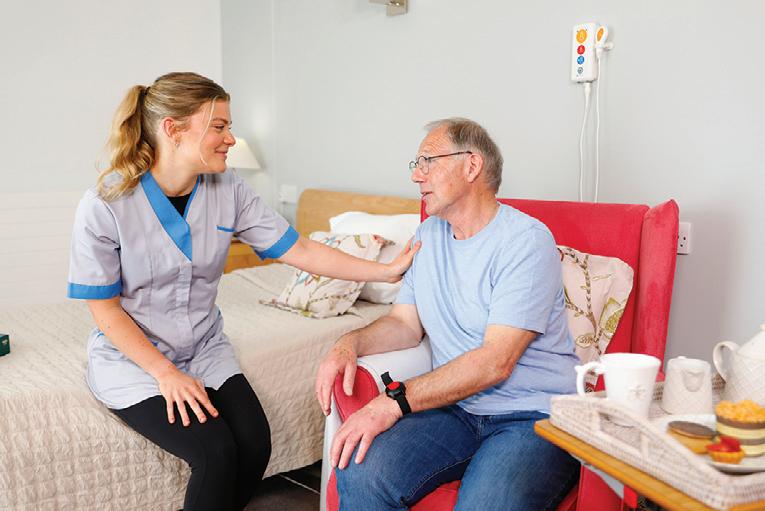
with the tools they need to deliver safe, person-centred care.”
Care providers are increasingly choosing wireless systems for their flexibility, reliability, and cost-effectiveness. With a full suite of accessories—including neck pendants, door monitors, fall detection, and bed sensors—Courtney Thorne systems can be tailored to meet the specific needs of each home and resident.
In an industry where compliance, safety, and staff pressures are always front of mind, Courtney Thorne provides more than just products—they offer ongoing support, training, and a commitment to innovation that helps care homes futureproof their operations.
For more information or to book a free demo, visit www.c-t.co.uk or contact info@c-t.co.uk.
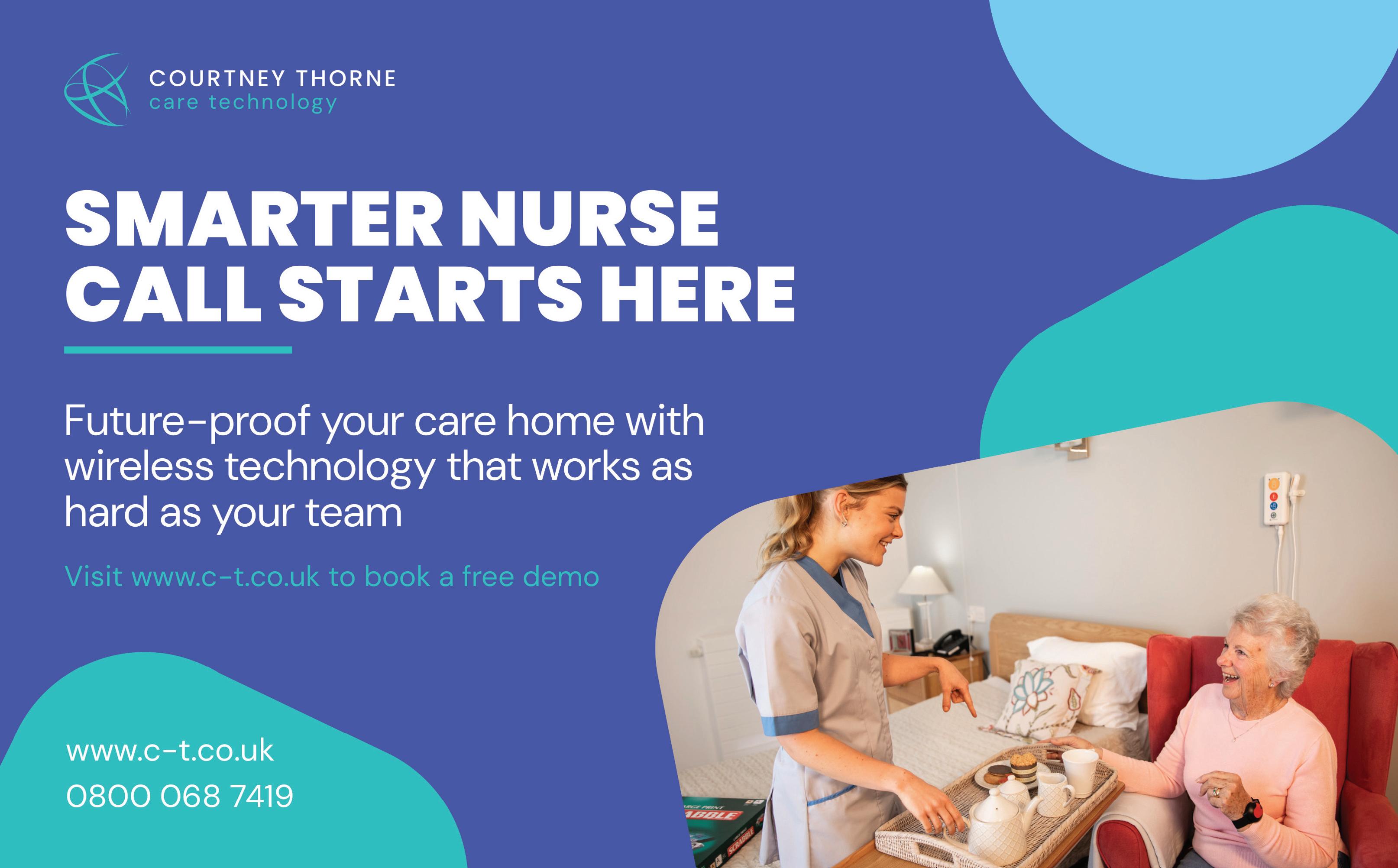
Falls are a significant concern for vulnerable individuals, especially seniors and patients at risk. Medpage, a leader in assistive technology, offers a range of cutting-edge products designed to enhance safety and provide peace of mind for caregivers and families. Here’s an in-depth look at some of their standout solutions:
MPRCG1 (2023) BED LEAVING DETECTION ALARM WITH CAREGIVER RADIO PAGER
The MPRCG1 is a comprehensive system tailored for fall prevention in domestic, commercial, and NHS care settings. This all-inclusive kit includes a bed pressure mat sensor, a BTX21-MP alarm sensor transmitter, and an MP-PAG31 radio pager. The system is designed to alert caregivers when a patient leaves their bed, reducing the risk of falls. Key features include:
Wireless Alerts: Notifications are sent to the caregiver’s pager via tone or vibration.
• Customizable Alarm Delays: Options for instant, 15-minute, or 30-minute delays.
Durable Design: Antimicrobial and disinfectant-resistant materials ensure longevity. Ease of Use: Minimal installation required, making it user-friendly and portable.
HDKMB2 HOSPITAL DISCHARGE KIT FOR FALLS RISK PATIENTS
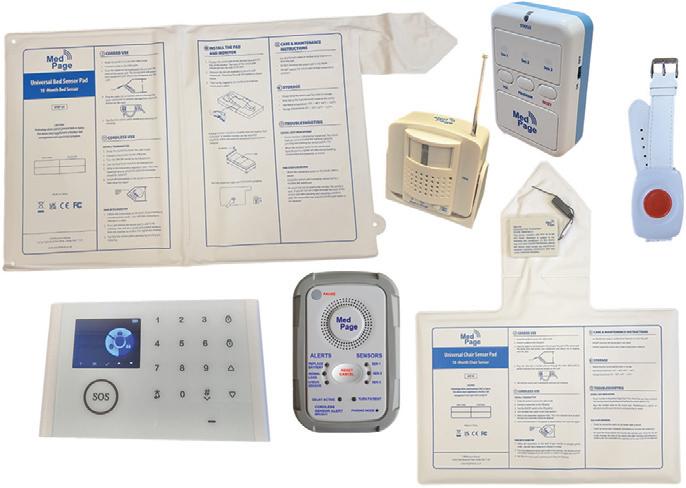
The HDKMB2 is a thoughtfully curated kit aimed at supporting patients transitioning from hospital to home care. It includes essential tools to mitigate fall risks and promote recovery. This kit is ideal for caregivers seeking a comprehensive solution to enhance patient safety during the critical post-discharge period.
MULTI-PORT WIRELESS SENSOR INPUT EXPANDER FOR NURSE CALL CONNECTION
CMEX-21
The CMEX-21 is Medpage’s latest innovation, designed to integrate seamlessly with existing nurse call
systems. This multi-port expander allows for the connection of multiple wireless sensors, enhancing the monitoring capabilities of healthcare facilities. Its versatility makes it a valuable addition to any care environment, ensuring timely responses to patient needs.
RON-WC2 WATERPROOF DISABLED PULL CORD ALARM TRANSMITTER WITH WIRELESS ALARM RECEIVER
The RON-WC2 is a robust solution for disabled individuals requiring immediate assistance. This waterproof pull cord alarm is ideal for use in bathrooms and other high-risk areas. Paired with a wireless alarm receiver, it ensures that help is just a pull away. Features include:
Waterproof Design: Suitable for wet environments.
• Wireless Connectivity: Reliable transmission to the alarm receiver.
Ease of Installation: Simple setup for quick deployment.
WHY CHOOSE MEDPAGE?
Medpage’s commitment to innovation and quality is evident in their product range. Each solution is designed with the user’s safety and convenience in mind, making them a trusted choice for caregivers and healthcare providers alike.
By investing in these advanced fall prevention tools, families and facilities can create safer environments for those at risk. Medpage continues to lead the way in providing practical, reliable solutions that make a real difference.
For more information, visit Medpage’s official website or contact their team to explore these products further. Safety starts with the right tools, and Medpage delivers just that. www.easylinkuk.co.uk
T: 01536 264 869
Alarm Radio Monitoring is the market leader in the design, manufacture and installation of bespoke, end-to-end, wireless alarm systems and solutions for the healthcare, leisure, custodial and education industries.
We have been providing wireless alarm and nurse call systems for over 30 years. Supplying care homes and hospitals with an essential lifeline that supports the delivery of outstanding care.
We believe in excellence which translates into:
Advanced Technology
Industry-leading wireless alarm technologies and software
Bespoke Solutions
We design systems to your needs rather than your team having to work around the system Innovative Design
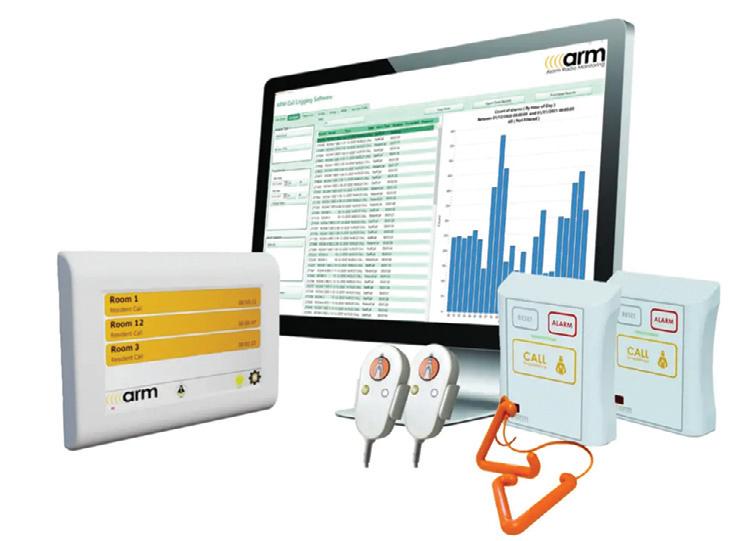
Pushing boundaries with the reliability that comes from decades in the industry Flexible Finance Options
Ensuring organisations of
or
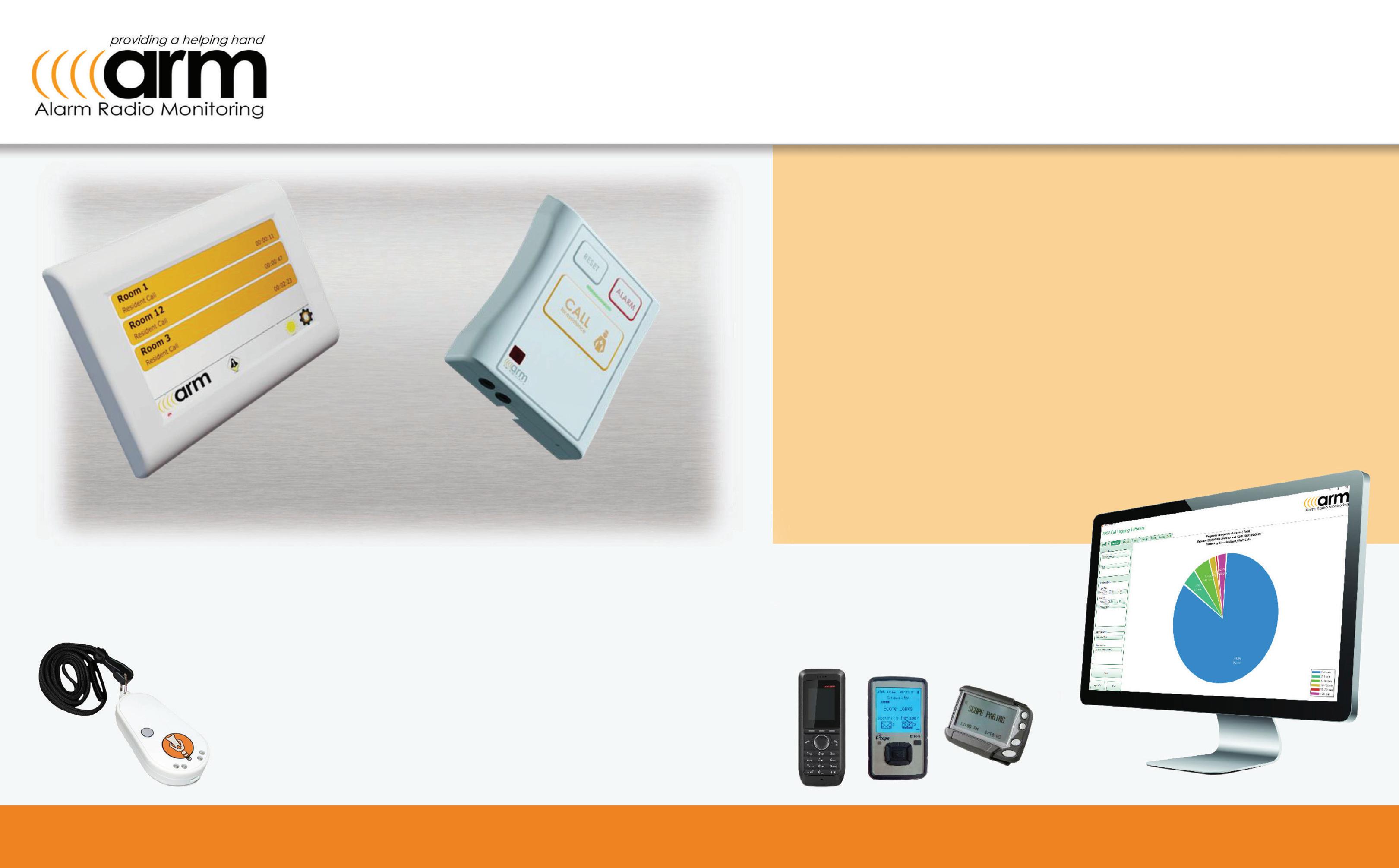
Data Analysis software provides a full audit trail of events
The all-new call logging software from ARM enhances the functionality of your care call system dramatically.
• It can help you track the quality of your service to your residents.
• It can help you demonstrate compliance with your aims and best practices, both to relatives and to authorities.
• It can help you find bottlenecks in service provision, track staffing requirements, and allow you to ensure staff are meeting expectations.
• Most importantly, it provides assurance that you know and can demonstrate what is happening in your care home.
The wireless ARM Nurse Call system has been developed over 30 years with both the client and user in mind.
It enables staff to efficiently answer calls, making the management of resources more flexible and provides the functionality you would expect of any nurse call system.
The system is quick and easy to install and works wirelessly, using radio communication between both the call points and the system infrastructure.
Call messages can be sent direct to staff to speed up response times and can also be integrated to work with smart phones & messaging.
Falls are one of the biggest challenges facing care providers – and they’re not just an issue for older people. They can affect anyone receiving care and support, including working-age adults with disabilities or longterm conditions. A fall can change someone’s life in an instant, leading to injury, hospitalisation, or loss of confidence. For staff, falls mean stress, paperwork, and the urgent task of helping someone recover safely. This September’s Falls Awareness Week is a chance to shine a light on the issue and explore new ways of keeping people safe. At the Digital Care Hub, we’re supporting the week with practical resources and a twopart mini-webinar series designed to spark ideas and share real-world success stories from across the sector.
LEARNING FROM EACH OTHER
On Tuesday 23 September at 2pm, we’ll host Wellbeing in Focus: Sensor Technology and the Care Journey. This session will explore the benefits of sensor-based technology from both care provider and resident perspectives. Speakers include Sensio, Lovett Care and Dormy Care, with an introduction from the National Care Forum.
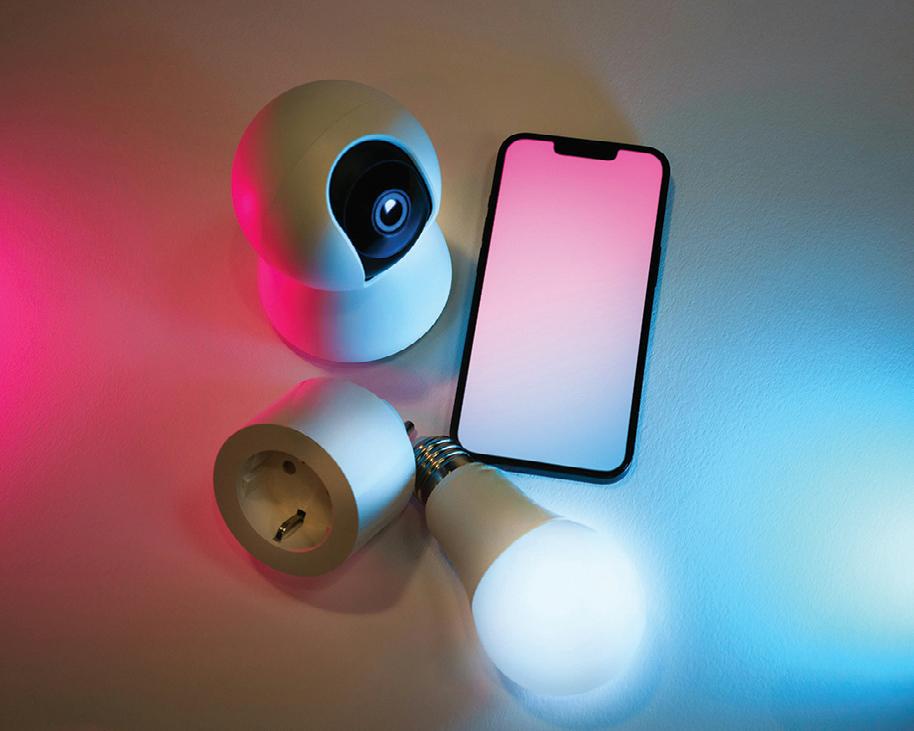
On Wednesday 24 September at 2pm, we’ll run Beyond Falls: How Sensor Tech is Unlocking Safer, Calmer Care. This goes beyond basic fall prevention, exploring how sensors can improve sleep, reduce anxiety and even help spot health risks earlier. Care England will open the session, and Ally Cares will share powerful insights from care homes already using these systems. Both webinars are free to attend and are aimed at managers, owners and care teams who want practical, evidence-based solutions.
THE CHALLENGE ON THE GROUND
Anyone working in care knows that preventing falls isn’t easy. Staff need to balance safety with independence, spot risks early, and respond quickly when incidents happen. For many providers, night-time
checks can disturb residents’ sleep and still miss the moment when a fall happens. Long-lie incidents, where someone is not discovered for hours, are a particular concern and can have serious health consequences.
TECHNOLOGY MAKING A DIFFERENCE
The good news is that technology is helping providers change the story.
At The Lawns Care & Nursing Home in Worcestershire, the team introduced Ally Cares, an AI-powered acoustic monitoring system. It alerts staff to unusual sounds or movement at night, so they can intervene before someone gets hurt. Over six months, falls dropped by two-thirds, with the biggest impact for residents most at risk.
Hartland House Care Home in Cumbria went a step further with Nobi Smart Lamps, which combine AI and smart lighting to detect when someone gets out of bed and automatically light the room. They reported an 84% reduction in falls, no long-lie events, and response times falling from nearly an hour to just two minutes.
Technology alone isn’t the answer – it needs the right culture, training and care planning to be truly effective. That’s why conversations like those taking place during Falls Awareness Week are so important.
By sharing stories, data and lessons learned, we can make care safer, calmer and more dignified for everyone – whether they live in a care home, supported living, or their own home.
Join us at the Digital Care Hub webinars and be part of the conversation. Together, we can turn the tide on falls.
Find out more on the Digital Care Hub website at www.digitalcarehub.co.uk/falls-awareness-week-the-power-of-tech/
See us n Stand B11 at The Care Show. See the advert on page 28.
Technology has made people more connected with the world around them and the revolution in assistive care devices has made it possible for the elderly to spend their last years in a comfortable and familiar environment. These devices have also made it easier for home carers to provide quality care for their loved ones while managing their own lives. They allow you to care for your elderly whether they are travelling in the city for errands, staying alone at home, or staying in the same home as you. They are also helping nursing homes provide better care for them with discrete monitoring and quick responses to emergencies.
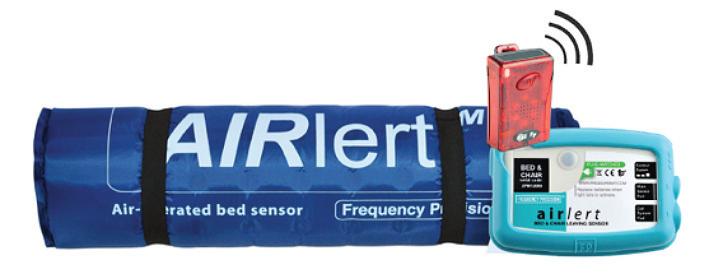
If you’re looking for these kinds of assistive care devices for your loved ones or nursing home, Frequency Precision produce some of the best systems available to help you with elderly care and mobility monitoring, ranging from bed, chair and floor sensor mats through fall monitoring and GPS tracking to fully integrated nurse call plug or wireless systems.
Phone: 01837 810590
Email: contact@frequencyprecision.com
Website: www.frequencyprecision.com
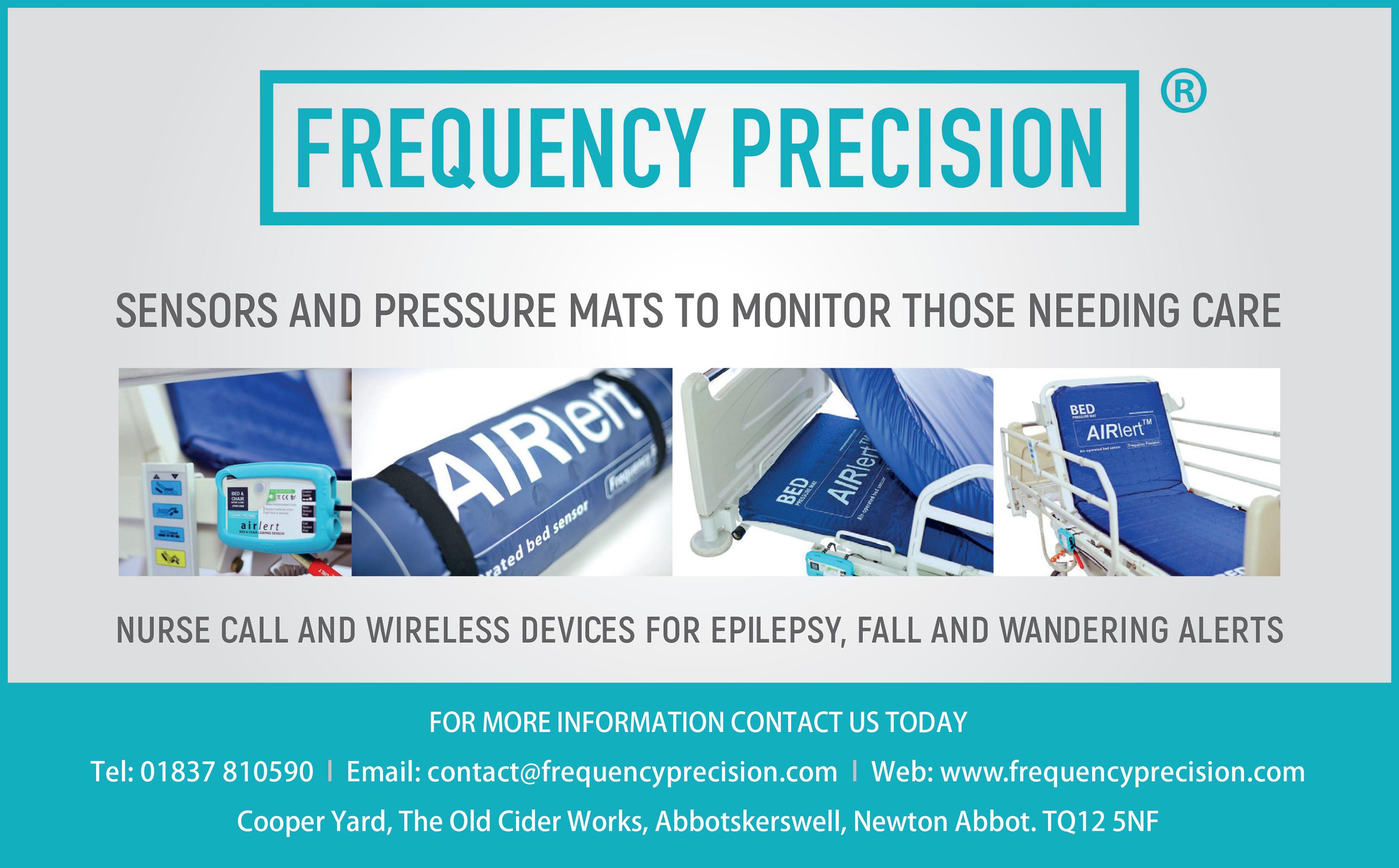
By
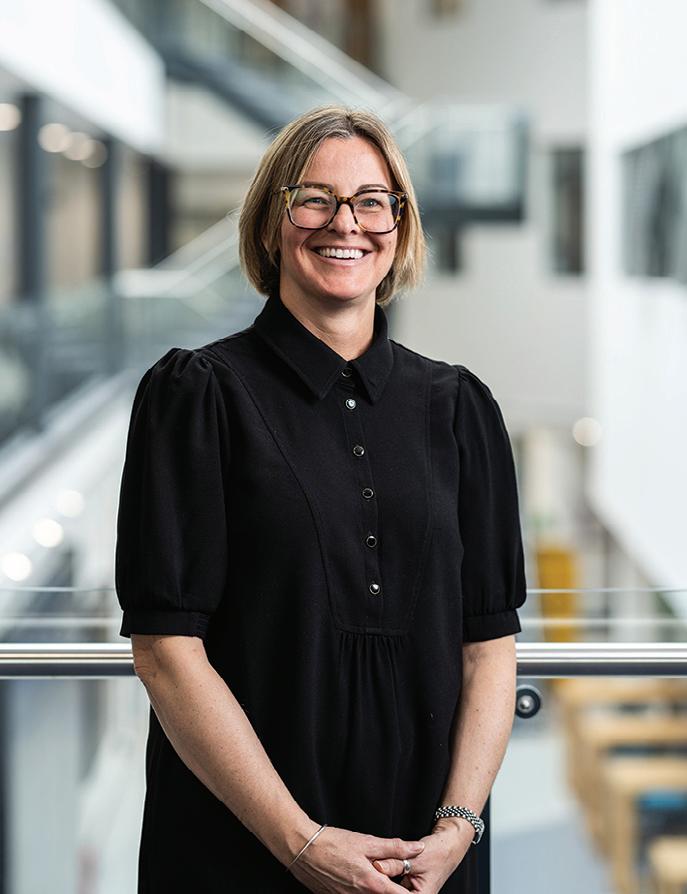
The care sector in the UK is facing a growing crisis. With an aging population, rising demand for services, and chronic staff shortages, pressure on providers has never been greater. In 2023, Skills for Care reported around 152,000 vacancies in adult social care in England alone. These challenges not only strain the system but also compromise the quality and continuity of care. Yet, a powerful and often underutilised solution lies in education and training pathways, particularly Foundation Apprenticeships, full Apprenticeships, and vocational work-based learning such as college placements and T Levels.
These routes into the care profession not only address immediate staffing shortages but also support the longterm sustainability and professionalism of the sector. By combining academic learning with hands-on practical experience, these pathways provide young people with the skills, confidence, and motivation to build fulfilling careers in care. In turn, employers benefit from a pipeline of wellprepared, passionate, and loyal workers.
FOUNDATION APPRENTICESHIPS: ENGAGING FUTURE TALENT EARLY
Foundation Apprenticeships (FAs), offered to school leavers (and up to the age of 19 or 24 with an EHCP), provide an invaluable early introduction to the care sector. These programmes combine classroom learning with structured work placements, giving apprentices the chance to gain practical experience in real care settings in an 8-month window. By engaging with the profession early on, students gain a realistic and positive understanding of what care work involves, dispelling myths and building confidence in their abilities.
This early engagement is crucial. Foundation Apprenticeships help students make informed career choices and allow employers to spot and nurture young talent as they enter the workforce. For the care sector, which traditionally struggles to attract younger workers, FAs serve as a vital bridge between education and employment. They also broaden access to the profession, particularly among school-leavers who may not have considered care as a viable or attractive career path.
COLLEGE PLACEMENTS AND T LEVELS: BUILDING REAL-WORLD EXPERIENCE
Further education colleges play a key role in preparing students for care roles. Health and Social Care students typically complete structured placements in settings such as care homes, day centres, and domiciliary services. These experiences allow learners to apply theory in practical environments and develop essential interpersonal skills.
T Levels, introduced in 2020, are two-year programmes for 16-19 year-olds that include a minimum of 315 hours of industry placement. The Health and Science T Level equips students with both technical knowledge and soft skills like empathy, patience, and communication - all vital for high-quality care.
For employers, T Level placements offer a low-risk way to assess potential recruits in real working contexts. Students who complete meaningful placements are often more confident and better prepared for full-time roles, leading to improved retention and smoother transitions into employment.
APPRENTICESHIPS: STRENGTHENING AND RETAINING THE WORKFORCE
While Foundation Apprenticeships and T Levels lay the groundwork, full Apprenticeships serve as a critical tool for both recruitment and retention in the care sector. Apprenticeships offer a blend of paid work and formal study, allowing individuals to "earn while they learn" and progress toward nationally recognised qualifications in adult care, childcare, and support work.
Crucially, apprenticeships cater to a wide age range and can be used both for new recruits and for upskilling existing staff. This makes them incredibly versatile. For young people who may not thrive in traditional academic routes, apprenticeships offer a clear, supported pathway into meaningful employment. For care providers, investing in apprenticeships can help fill vacancies with committed, well-trained individuals while demonstrating a commitment to workforce development.
Apprenticeships also promote staff loyalty. When employees are supported to learn and develop within their role, they are more likely to stay with their employer long-term. This helps to reduce the high turnover rates that plague the care sector and improves continuity of care for service users.
In a sector crying out for skilled, compassionate workers, the potential of Foundation Apprenticeships, college placements, T Levels, and full Apprenticeships cannot be overstated. These pathways equip learners with the necessary skills and values while embedding them in the culture of care from an early stage. By integrating education with employment, we can reshape how the care sector recruits and retains its workforce. This is not a short-term fix but a sustainable, future-focused strategy.
The care sector cannot afford to wait. By actively engaging with local education providers such as colleges, schools, and apprenticeship training organisations, care employers can build a robust pipeline of skilled, motivated individuals ready to make a difference. Whether it’s offering a placement, mentoring a student, or hiring an apprentice, every action contributes to a stronger, more sustainable workforce. Reach out to Exeter College today and start shaping the next generation of carers.
Sam has been part of the apprenticeship world for over 25 years, having gained vast experience in teaching, designing and managing the quality of apprenticeship curriculum in both independent training provider & College settings. Sam joined Exeter College over 4 years ago and played a key role in the Ofsted Outstanding grading for Apprenticeships. Apprentices@exe-coll.ac.uk https://exe-coll.ac.uk/apprenticeships/
See the advert on the facing page
PIONEERING TECHNOLOGY-ENHANCED CARE FOR THE FUTURE
Multisensory Care Solutions represents a significant advancement in specialist care provision, founded by industry veterans Karen Bradley and Brian Lumb. Drawing upon their exceptional track record of operating a CQC Outstanding-rated residential care home for complex care residents over three decades, the company brings unparalleled expertise to the care sector.
PROVEN LEADERSHIP IN CARE EXCELLENCE
Karen Bradley brings over 45 years of comprehensive experience working with individuals living with dementia, autism, learning disabilities, and other specialist needs. As a former Registered Manager and certified trainer across multiple care disciplines, her deep understanding of person-centred care principles has consistently delivered outstanding outcomes for residents and their families. Brian Lumb contributes extensive technical expertise from his background in multimedia systems, touchscreen displays, and point-of-information technologies. His proven track record in developing and implementing innovative digital solutions—both as a business owner and senior executive within major PLCs—provides the technical foundation for revolutionary care applications.
INNOVATION-DRIVEN CARE EXCELLENCE
The founders' unique combination of care expertise and technological innovation has enabled them to integrate cutting-edge solutions into their care delivery model. This pioneering approach to person-centred care through technology played a crucial role in achieving their CQC Outstanding rating, demonstrating measurable improvements in quality of life for residents and enhanced support for families.
INTRODUCING MULTISENSORY MAGIC

Building upon decades of practical experience, Multisensory Care Solutions has developed "Multisensory Magic"—an accessible software application designed to democratise technology-enhanced care. This cost-effective solution makes advanced multisensory interventions available to care providers across the sector, extending beyond premium facilities to benefit a broader range of residents.
Meeting Critical Care Challenges
With approximately one million people currently living with dementia in the UK—a figure projected to reach 1.5 million by 2040—the need for innovative care solutions has never been more urgent. Technology-enhanced interventions offer proven benefits in:
Sensory stimulation and engagement
Cognitive function support
Enhanced communication pathways
Improved resident wellbeing outcomes
A TIMELY CALL TO ACTION
As the care sector observes World Alzheimer's Month in September 2025, culminating in World Alzheimer's Day on 21st September, the opportunity to transform dementia care through accessible technology solutions represents both a professional imperative and a moral responsibility.
Multisensory Care Solutions stands ready to support care providers in achieving improved CQC ratings whilst delivering meaningful enhancements to resident care and family satisfaction. For more information see the advert on the facing page or please call or email Brian Lumb - 07801 498483 or Email - brian@multisensorycaresolutions.com www.multisensorycaresolutions.com
Restrictive practices such as physical restraint, bed rails, or lap belts remain one of the most challenging aspects of health and social care. Intended to keep patients safe, they can also cause harm, distress, and loss of dignity when used unnecessarily. Across the UK, the principle is clear: care must always use the least restrictive option.
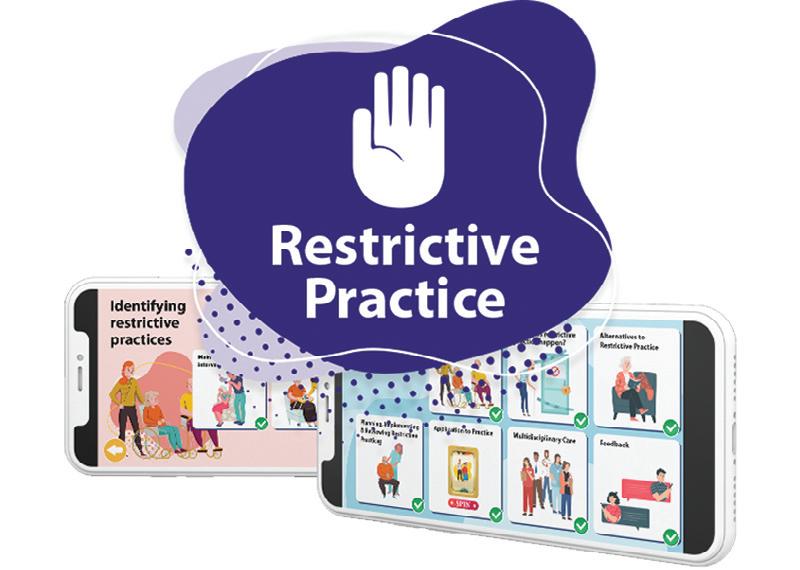
Legislation provides the framework, but culture and staff behaviour shape daily practice. Nurses, carers, and clinicians often make quick decisions balancing safety with autonomy. Without training, restrictive practices risk becoming routine. To change this, staff need better understanding of the human impact and confidence to use alternatives. That’s where Restrictive Practice makes a difference. Developed through co-design workshops with patients and carers, this gamified e-resource gives a voice to those most affected by restraint. Their lived
experiences shaped the learning, helping staff see restraint not as a neutral safety tool, but often as something frightening or disempowering.
The results are powerful. Staff trained with the resource led Quality Improvement projects, achieving measurable reductions:
- Bed rails dropped from 360 to 277 incidents
- Bed bumpers from 303 to 227
- Lap belt use halved, from 46 to 22
These improvements represent safer, more compassionate care and reassurance for families.
Restrictive practices may never disappear entirely, but they should be the exception, not the rule. With the right knowledge and tools, staff can choose safer alternatives and build a culture of dignity, compassion, and respect across UK care services. See our advert on the front cover or visit www. RestrictivePractice.com



Users / providers are enabled to ‘CONJURE
and reminiscence therapy sessions. Audio, video, slide shows, text, images and aromas can all be blended
using multiple screen displays.




A new apprenticeship has been launched for adult care support workers who assist people with mental health challenges, including dementia and neurodiversity.
Leading training provider Realise has revealed its new Level 3 Senior Healthcare Support Worker Apprenticeship which features a specialist mental health pathway.
The apprenticeship aligns with The Care Workforce Pathway - developed by Skills for Care and the Department of Health and Social Care –which emphasises the importance of equipping staff who support people with mental ill health with the right knowledge and skills.
The programme’s focus on mental health makes it ideal for those working in complex care services or supporting individuals living with dementia or mental health conditions. It also benefits those supporting individuals with a dual diagnosis.
Standard apprenticeship funding rules apply with no age restrictions. However, learners aged 16–22 are eligible for 100% government funding, meaning non-levy employers are not required to pay the usual 5% co-investment. This is available in England only.
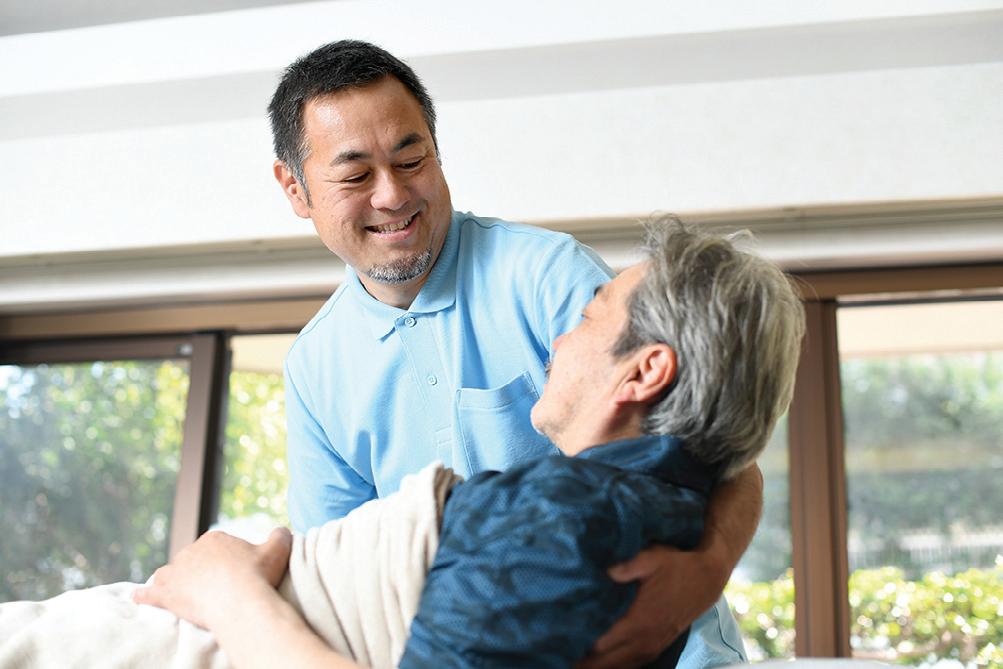
While a few other providers offer the Level 3 Senior Healthcare Support Worker Apprenticeship in Mental Health Pathway, the Realise progamme was developed in collaboration with leading industry provider Barchester Healthcare, ensuring it is closely aligned with the real-world demands of the role, particularly in complex care.
Angela Kaine, Director of Health & Social Care at Realise, said: “We fully support The Care Workforce Pathway, which emphasises the importance of people being able to receive training in areas in which they
specialise.
“Care workers supporting individuals with dementia or other mental health conditions benefit greatly from targeted training in crisis intervention, mental capacity and de-escalation techniques.
“Offering this apprenticeship can help adult care providers recruit individuals for specialised roles and improve retention - two major challenges within the sector.
“There is a wide variety of opportunities within adult care, and we’re proud to support those looking to develop both their technical skills and their chosen specialism.”
This comprehensive 18-month apprenticeship is designed to provide a rich and supportive learning experience. Learners will benefit from a blend of face-to-face support and interactive webinars, creating the perfect balance between in-person guidance and flexible online learning.
These sessions not only enhance understanding but also offer valuable opportunities to connect, collaborate, and network with peers from across the sector- helping to build confidence, share best practices, and develop lasting professional relationships.
Modules include quality improvement - where learners are challenged to identify small changes to enhance performance - and team leadership, which encourages them to take on more responsibilities.
Realise can tailor programmes to suit the employer’s needs by utilising unit selection through the diploma.
The apprenticeship is available throughout England.
For more information, visit www.realisetraining.com
In today’s regulated care environment, having clear, current, and wellcommunicated health and social care policies is essential for delivering safe, compliant services. The Care Quality Commission (CQC) now places increasing emphasis on how policies are implemented and understood—especially during registration and inspections.
Outdated or poorly communicated policies can significantly impact your CQC rating. Even if documentation is comprehensive, failure to ensure staff understand and follow procedures may lead to a “Requires Improvement” or even “Inadequate” rating under the ‘Effective’ domain.
Well-maintained policies promote consistent standards across care teams and help safeguard services when incidents arise. In regulatory investigations, the first request is often to review relevant policies—making accuracy and accessibility key to reducing legal and compliance risks.

However, keeping policies up to date is challenging. Constant changes in legislation, best practice guid-

page
ance, and case law mean that policies can quickly become obsolete. W&P has been a trusted provider of CQC-ready care policies and procedures for over 20 years. Our expert team monitors industry developments to ensure your policies remain fully compliant.
Our Online Policy Portal simplifies policy management. With just a few clicks, providers can update content, distribute documents to staff, track confirmations, and monitor compliance via a real-time dashboard. You can even provide temporary read-only access to inspectors—demonstrating transparency and accountability instantly.
Ensure your care service meets CQC expectations with fully up-to-date, easily accessible, and well-communicated policies.
Email: info@wandptraining.co.uk
Call: 01305 767104
for details.
Since our founding in 2010, Activities to Share has been dedicated to enhancing the lives of those in care by providing thoughtfully designed activity products. Our mission is to support activity coordinators in delivering uplifting, engaging experiences that foster connection, joy, and well-being.
We achieve this by listening closely to your feedback and evolving with your needs. Whether over the phone, via email, WhatsApp, or Live Chat on our website, our team is always ready to offer advice and help you find just the right products to bring your ideas to life.

While we embrace the convenience of technology to expand our resources and share knowledge, we remain firm believers in the irreplaceable power of sensory engagement. That’s why we continue to make our Reminiscence Kits and Sensory Bags with
real, tactile items that stimulate the senses. Some experiences—like popping bubbles for the splash, breathing in a familiar scent, or piecing together a puzzle with others—simply can’t be replicated on a screen. These sensory moments are invaluable in encouraging storytelling, sparking memories, and fostering conversation. Our values remain rooted in this commitment to meaningful connection. We’re here to partner with you—the professionals on the front lines of care—to create a sense of structure, well-being, and fun for those who need it most.
Are you longing for your activity diary to be full?
Look no further
www.activitiestoshare.co.uk are here for you! Call 0117 966 6761


Rebecca Pallot, a partner and employment lawyer at Mills & Reeve

The much-debated Employment Rights Bill promises to bring widespread reforms to employment law. As it reaches the final stages of the Parliamentary process, Rebecca Pallot, employment lawyer at Mills & Reeve, looks at three groups of measures which will have a particularly significant impact on employment relationships in the adult social care sector.
The Government intends to use the Bill to abolish the two-year qualifying period for unfair dismissal, making the entitlement to bring a claim effective from the first day of employment. It also proposes to introduce a new framework for a lighter touch unfair dismissal regime during an “initial period of employment”. That lighter touch process has been described as a “probationary period exemption”.
Under the proposals, a care home provider will be able to dismiss fairly during the initial period if they can demonstrate a potentially fair reason for dismissal which relates to the individual employee. It will also be possible to bring claims in respect of dismissals for redundancy from the first day of employment.
Regulations will define the length of the initial period of employment and how it is calculated. This is likely to be a minimum of six months and could be as long as a year, with the Government currently supporting a compromise of nine months.
(www.mills-reeve.com) assesses three groups of measures in the Bill which are particularly significant for the adult social care sector.
It remains to be seen what the exact process will be to make a dismissal fair in the initial period but it is clear, that there is growing concern amongst care home operators about the increased risk of unfair dismissal claims. While some think that this change could be cost-neutral, because it will give employers a greater incentive to manage probationary periods effectively, much will depend on the design of the regulations, on which the Government will be consulting shortly.
There are three groups of measures to protect zero-hours and low hours workers, as well as agency workers employed in the adult care sector on similar arrangements:
the right to guaranteed hours after the end of every reference period, which reflects the hours worked during that period the right to reasonable notice of shifts (including change and cancellation), and the right to payment for cancelled, moved and curtailed shifts where sufficient notice has not been given
The new regulations will define the reference period for calculating guaranteed hours and other conditions of entitlement, as well as the procedural requirements around the offer of a new contract. They will also specify the minimum notice period for the cancellation of shifts, the compensation due and when it must be paid.
According to the Bill’s impact assessment, these measures will have a disproportionate impact on the social care sector, where over a fifth of its workforce are believed to be engaged on zero-hours contracts or similar arrangements which would be in scope.
There will be significant direct and indirect costs in complying with these measures, which are among the most complex in the Bill.
The three-day waiting period to qualify for SSP will be abolished so that it is paid from the first day of sickness. The Lower Earnings Limit, which
prevents those who earn below a certain amount from claiming SSP, will also be removed. Once these changes take effect, SSP will be paid at 80% of average weekly earnings or the current flat rate, whichever is lower.
As with the measures in respect of zero hour contracts, the Government’s plans to reform SSP will have a significant effect on the social care sector, because of its relatively high proportion of lower paid workers. However, it is possible that the resulting improvements in staff welfare will bring productivity gains to offset at least some of the additional costs.
According to the Government’s implementation timetable, published in July, changes to SSP eligibility will be brought into effect in April 2026, giving care home providers a small window in which to prepare for these reforms.
Other measures in respect of zero hours contracts and unfair dismissal will not be brought into force until 2027. As such, employers have more time to implement any necessary changes. In the meantime, it’s important for providers to keep an eye on this constantly evolving area of law, while engaging with the Government’s consultation on the regulations required to implement these measures, which is expected shortly.
Employers could consider taking the following steps:
• assess your organisation’s dependence on workers who are not permanent employees with predictable hours
• review procedures for probationary periods and ensure that line-managers are trained to implement them, and
• align your sickness absence procedures with the changes to SSP being introduced in April.
While the Bill also creates the framework for establishing a negotiating body to set pay and conditions across the entire adult care sector in England, it remains to be seen what impact the proposed measures will have on the sector.

Specialist business property adviser, Christie & Co, has launched its Care Market Review 2025 report, which analyses a range of topics relating to the UK healthcare business market, including capital markets, land and development, the transactional market, shifts in local authority fee rates, operator sentiment and the finance landscape. Healthcare the report reveals, remains a compelling investment due to strong demographic drivers, particularly the ageing population and rising life expectancy, with the over-80s population expected to more than double by 2050. Investor interest is further supported by ESG credentials and inflation-linked, long-income lease structures the report reveals.
The 12 months to July 2025 marked a period of strategic realignment amid ongoing macroeconomic and geopolitical shifts, with the market evolving via increased M&A, joint ventures, and a growing focus on management contracts.
Overseas capital significantly boosted deal activity during this time, with sector-specialist REITs like Welltower and Omega leading major acquisitions, including Care UK and 45 Four Seasons care homes respectively. H1 2025 also saw robust investor activity, including notable M&A deals like Care Trust REIT’s acquisition of Care REIT plc and the Aedifica-Cofinimmo merger. While operators are increasingly using lease-based models and sale-and-leaseback structures to unlock capital, looking ahead, Christie & Co expects to see more investors exploring sale and manage-back models, offering higher returns with greater operational exposure. Christie & Co’s report goes on to analyse the transactions that it has conducted over the past year. Deal activity surged, with completions at their highest level, and Christie & Co’s pipeline 24 per cent ahead of where it was in 2024. 49 per cent of deals involved homes with 20 to 39 beds, while only 17 per cent were for homes over 60 beds.
A notable shift occurred in the profile of homes entering the market, with a rise in smaller care homes (under 20 beds) making up 38 per cent of instructions, an increase from 12 per cent in early 2024. Larger homes (over 60 beds) comprised just 5 per cent of instructions, down from 15 per cent, reflecting a shortage of purpose-built facilities. Homes with 20 to 59 beds accounted for 56 per cent of instructions, down from 73 per cent in 2024.
First-time buyers represented 17 per cent of deals in H1 2025, up from 11 per cent in 2024 and just 4 per cent in 2023. Small and medium-sized groups (those with 3 to 19 homes) were the most active buyers (32 per cent of deals), followed closely by independent operators (those with 1 to 2 homes) at 31 per cent. Large groups and corporates saw a decline in activity, accounting for only 20 per cent of deals, down from 36 per cent in 2023.
Homes sold with vacant possession rose to 21 per cent in 2025, up from 13 per cent in 2024. Of these closed homes, 60 per cent remained in care use, 24 per cent were converted to residential dwellings, and 16 per cent repurposed for other uses. This high closure rate in the sector is something that Christie & Co expects will continue.
Christie & Co also conducted and analysed a Freedom of Information Act survey, covering all 174 local authorities across England, Wales, and Scotland. It revealed an average residential fee increase in England of 8.6 per cent compared with 9 per cent in 2023/24. There were some notable fee rate uplifts in certain local authorities, albeit from a low base level.
The burden on the self-funded client base is likely to rise, with the majority of providers achieving private fee increases of between 5 per cent and 10 per cent, sometimes more.
A segment from Christie Finance on the finance landscape notes that the care sector continues to attract strong interest from the finance market, with both new and established operators seeking debt funding to sup-
Global assists clients throughout the U.K. who specialise in the healthcare sector to achieve their objectives of purchase, development and refinance.
We have organised over £1.8bn for clients in the past 30 years, providing clients with competitively priced funding to refinance existing debt, ease cashflow and develop businesses further.
From helping clients make their first purchase through to allowing groups to grow significantly in size we assist at every stage of your business expansion.

Every proposal is individual and deserves to be treated that way, so we hope you will allow us to be of assistance to you and call us to chat through your plans and requirements, I am sure we will be able to tailor a facility to your requirements.
Call us on 01242 227172 or e-mail us at enquiries@globalbusinessfinance.net
port growth. However, securing finance remains challenging due to increasingly rigorous lender requirements. Richard Lunn, Managing Director – Care at Christie & Co, comments,
“We have seen extremely positive market activity throughout the year, as many operators look to grow their portfolios. By the end of August, we had already transacted more deals than in 2024, and our forward pipeline is the highest ever, reflecting the investor and operator desire to acquire care services. On a recent trip to the USA, investors called this a ‘Goldilocks period’ for senior care providers and investors, with the much-heralded arrival of the huge demographic wave of elderly people requiring care and support and limited quality supply to meet this demand in future years.”
To read the full Care Market Review 2025, visit: www.christie.com/sectors/care/care-market-review-2025

